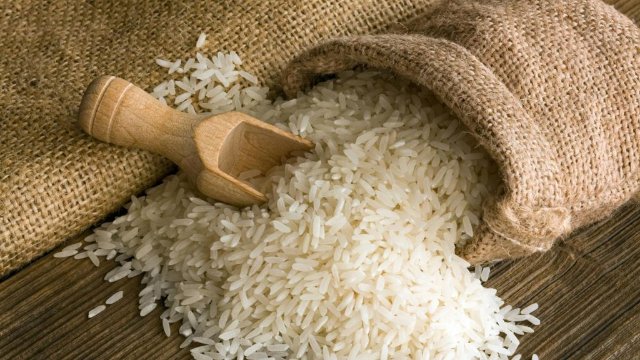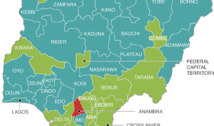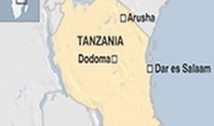Scientists confident of GMO rice under trial in Ghana
- 20 Feb 2019 --
There are high expectations Genetically Modified Organism (GMO) rice currently under trials in Ghana will better the lives of ordinary rice farmers once released onto the market.
Known as the Nitrogen-use Efficient, Water-use Efficient and Salt Tolerant (NEWEST) rice, it has been engineered to use less nitrogen, be drought tolerant, be capable of growing in a salty environment and still give a good yield.
“This new variety will help us boost productivity and ensure farmers get a better yield from each hectare of farmland,” Dr. Maxwell Darko Asante, Plant Breeder and Principal Investigator in charge of the NEWEST rice project told Joy News in an interview.
Rice is a major staple food in Ghana and is the second most consumed cereal after maize. But estimates from the Ministry of Food and Agriculture indicate productivity on Ghanaian rice farms currently is only about 46 per cent of potential yield because of environmental and other challenges.
Additionally, poor rainfall patterns as a result of climate change limit productivity on fields because more than 90% of farm fields in Ghana are not irrigated. In coastal Ghana, high levels of salt in soils also makes growing rice there difficult.
“The challenges with rice production are several. Sometimes you apply a lot of fertilizer to the field and nothing changes. It’s always a big challenge. And the weather is not helping either,” rice farmer at Asutsuare in Southern Ghana John Awuku Dziwornu complained in an interview.
These challenges are what the NEWEST rice hopes to fix. Scientists at the Crop Research Institute of the Council for Scientific and Industrial Research (CSIR) in Ghana are leading ongoing trials to introduce the new variety in the country.
“For this project, we have two different products that are coming out. First is nitrogen use efficiency alone. Then the second covers all three. We have not done field trials on the combined traits yet.
But for the nitrogen use efficiency, we have evaluated and screened it in the field and selected the best fertile ones that have the trait and performing well in the field,” Francis Onyekachi Nwankwo who is programmes officer at the AATF explained in an interview.
“This new variety will boost local rice production. We are looking at a space of about four years from now because we have to do environmental safety assessment and food safety assessment. Within four years, it should be able to get to the hands of the farmers,” he added.
Onyekechi Nwankwo observes the challenge with nitrogen deficiency and its impact on rice production in Africa is worrying.
“With nitrogen use efficiency, you are talking about nutrients. For everything you plant, you need nutrients. With rice, nitrogen is needed in the soil to make it grow well. In a soil that is deficient of nitrogen, you can see that you will have a poor harvest. And looking at African environment, fertilizer which gives nitrogen is not very much valuable and not affordable to farmers,” he explained.
Thus far, the trials in Ghana have shown good results with one of the three desired traits. The Nitrogen Use-efficiency (NUE) trait was introduced into an African rice NERICA and tested alongside its conventional counterpart.
Confined field trials that compared the new GMO variety with traditional varieties showed yield increased by between 14 and 25 percent in favour of the new variety.
Dr. Maxwell Asante explains the next phase of the project will see the backcrossing of the desired traits from the GMO NERICA varieties into popular local rice varieties in Ghana.
“So far, it’s just the NERICA4 which was transformed. Once the gene is de-regulated, then we can backcross it into most of the popular jasmine types that we have locally. That is the plan.
“If everything goes on as planned, for most of our popular varieties, we will have NUE or NEWEST versions of it,” the Principal Investigator Dr. Asante explained.
“You know our soils are depleted. Farmers don’t get the productivity that they deserve. If this works, it means farmers can get good yield by applying lower yields of fertilizer. So they save money, and they make better yield,” he added.
When the three stack traits of the NEWEST rice are finally introduced into local varieties of rice, other benefits will be seen.
“Peasant farmers who don’t have the financial strength to irrigate their fields can use these varieties and the farms will still do well. Marginal lands that farmers couldn’t plant on could make use of these new varieties… In the coastal area where a lot of the lands are salty, these new varieties will do well there,” Dr. Asante added.
A recent economic study in Ghana has predicted the adoption of the new GMO variety could add up to $75.7m (GH₵334m) to the rice production economy over the next six years if released this year.
The study predicts that if regulatory processes delay the introduction of the new rice by five years, the rice sector will lose $45.3m (GH₵200m).
Charles Afriyie Debrah who is Biosafety Officer at the Crop Research Institute of the CSIR says ownership of the new GMO varieties will remain Ghanaian. He assures it may be possible for farmers to re-plant their seeds if they so wish.
“Our GMO rice that we conducted the experiment on, that crop, we have done about four trials. And it was based on the seed that was saved. So there are those seeds that you can re-plant like this new GMO variety,” he explained.
Farmer John Awuku Dziwornu is excited about the difference the new GMO rice variety will make in the country.
“A lot of work has been ongoing to produce improved rice varieties that can help increase productivity. We expect that the NEWEST variety to benefit farmers and Ghanaians in general,” Mr. Dziwornu said.
It could take about half a decade before the novel varieties are eventually available on the market for farmers to make use of but already, players in the rice industry are expectant.














































































































































































































































































































1,177 comments
The Confidential
5:49 pmokmark your weblog and check again here frequently. I’m quite sure I will learn lots of new stuff right here! Good luck for the next!
https://bit.ly/3w5PxbW
The Confidential
5:49 pmAn outstanding share! I’ve just forwarded this onto a coworker who had been conducting a little homework on this. And he in fact bought me dinner because I stumbled upon it for him… lol. So let me reword this…. Thank YOU for the meal!! But yeah, thanks for spending time to discuss this matter here on your web site.
https://cutt.ly/fakazaio
The Confidential
5:49 pmPretty section of content. I just stumbled upon your website and in accession capital to assert that I acquire actually enjoyed account your blog posts. Any way I will be subscribing to your augment and even I achievement you access consistently fast.
https://homedesigninstitute.com/question/4822/should_i_be_an_interior_designer_or_architect/
The Confidential
5:49 pmThe next time I read a blog, Hopefully it does not fail me as much as this one. I mean, Yes, it was my choice to read through, however I really thought you would probably have something interesting to talk about. All I hear is a bunch of crying about something that you can fix if you were not too busy looking for attention.
https://staff.blog.ui.ac.id/rendi.supiana/rukun-iman-ada-6-perkara/
The Confidential
5:49 pmMy brother suggested I might like this website. He was entirely right. This post actually made my day. You cann’t imagine simply how much time I had spent for this information! Thanks!
http://www.findnow.in
The Confidential
5:49 pmIn these days of austerity as well as relative panic about incurring debt, many individuals balk up against the idea of making use of a credit card to make acquisition of merchandise or pay for a trip, preferring, instead only to rely on this tried and also trusted means of making transaction – hard cash. However, if you possess cash on hand to make the purchase 100 , then, paradoxically, that is the best time just to be able to use the cards for several causes.
https://99bitcoins.com/best-bitcoin-casino/
The Confidential
5:49 pmI loved as much as you will receive carried out right here. The sketch is tasteful, your authored subject matter stylish. nonetheless, you command get got an shakiness over that you wish be delivering the following. unwell unquestionably come more formerly again since exactly the same nearly very often inside case you shield this increase.
https://99bitcoins.com/buy-bitcoin/paypal/
The Confidential
5:49 pmThanks for the sensible critique. Me and my neighbor were just preparing to do a little research about this. We got a grab a book from our area library but I think I learned more clear from this post. I’m very glad to see such great information being shared freely out there.
https://www.offshoresportsbooks.com/
The Confidential
5:49 pmI am often to blogging and i actually admire your content. The article has really peaks my interest. I’m going to bookmark your web site and maintain checking for new information.
https://xcaosystemgroup.com/
The Confidential
5:49 pmI’m pretty pleased to find this website. I want to to thank you for your time for this particularly fantastic read!! I definitely enjoyed every little bit of it and I have you saved to fav to see new things in your site.
https://ads.kazakh-zerno.net/user/alarmquit33/
The Confidential
5:49 pmHi there, just became aware of your weblog via Google, and located that it is really informative. I?m gonna watch out for brussels. I will be grateful when you proceed this in future. Many other folks might be benefited out of your writing. Cheers!
https://www.picktechsolution.com/
The Confidential
5:49 pmHaving read this I thought it was very enlightening. I appreciate you finding the time and energy to put this informative article together. I once again find myself spending way too much time both reading and posting comments. But so what, it was still worthwhile.
https://bookmarkspecial.com/story13982950/mp3-juices-full-guide
The Confidential
5:49 pmIts like you read my mind! You appear to know a lot about this, like you wrote the book in it or something. I think that you could do with a few pics to drive the message home a little bit, but other than that, this is excellent blog. An excellent read. I’ll certainly be back.
https://solitairegames.website/
The Confidential
5:49 pmI?ll immediately grab your rss feed as I can not find your e-mail subscription link or newsletter service. Do you’ve any? Kindly let me know so that I could subscribe. Thanks.
https://www.ikariajuice-ikariajuice.com/
The Confidential
5:49 pmThis blog was… how do you say it? Relevant!! Finally I’ve found something that helped me. Thanks a lot!
https://thebookmarkid.com/story13980230/fakaza-full-guide
The Confidential
5:49 pmI have not checked in here for some time because I thought it was getting boring, but the last few posts are great quality so I guess I?ll add you back to my daily bloglist. You deserve it my friend 🙂
https://bitcoinwisdom.com/anon-system-review/
The Confidential
5:49 pmYou are so cool! I don’t suppose I’ve read anything like that before. So wonderful to find someone with some genuine thoughts on this topic. Really.. thank you for starting this up. This web site is something that’s needed on the internet, someone with a little originality.
https://music35677.blogripley.com/20656607/the-clever-technique-of-fakaza-that-no-person-is-actually-discussing
The Confidential
5:49 pmAw, this was a very good post. Taking the time and actual effort to create a really good article… but what can I say… I procrastinate a lot and never manage to get anything done.
https://music52145.bloginwi.com/50283440/5-straightforward-claims-approximately-tubidy-download-and-install-explained
The Confidential
5:49 pmRight here is the right web site for everyone who really wants to find out about this topic. You understand so much its almost tough to argue with you (not that I actually will need to…HaHa). You definitely put a brand new spin on a subject which has been discussed for ages. Great stuff, just great.
https://caidenqycef.blog-eye.com/17233062/little-recognized-simple-facts-approximately-fakaza-download-and-install
The Confidential
5:49 pmSimply desire to say your article is as astounding. The clearness in your post is simply nice and i could assume you’re an expert on this subject. Fine with your permission allow me to grab your feed to keep updated with forthcoming post. Thanks a million and please continue the gratifying work.
https://participer.ge.ch/profiles/4flix/activity
The Confidential
5:49 pmIt?s really a great and helpful piece of info. I?m glad that you shared this helpful info with us. Please keep us up to date like this. Thanks for sharing.
https://easytvuk.co.uk/problems-watching-freeview/
The Confidential
5:49 pmHaving read this I thought it was really enlightening. I appreciate you finding the time and energy to put this article together. I once again find myself spending a significant amount of time both reading and commenting. But so what, it was still worth it.
https://bookmarkity.com/story14010814/lima-rindu-band-kehilanganmu-berat-untukku-urban-news
The Confidential
5:49 pmHiya very nice website!! Man .. Excellent .. Superb .. I’ll bookmark your website and take the feeds additionally?KI am glad to search out numerous helpful information right here within the put up, we want develop extra techniques on this regard, thanks for sharing. . . . . .
https://www.zoritolerimol.com
The Confidential
5:49 pmI like reading through a post that can make people think. Also, thanks for allowing for me to comment.
https://wise-social.com/story14145259/not-known-details-about-tubidy
The Confidential
5:49 pmHi there, You’ve done a great job. I will definitely digg it and personally suggest to my friends. I am sure they will be benefited from this web site.
https://thechronicbeaver.com/best-online-dispensary-canada-top-6-list/
The Confidential
5:49 pmNext time I read a blog, Hopefully it does not fail me as much as this one. After all, I know it was my choice to read through, nonetheless I genuinely believed you would probably have something helpful to talk about. All I hear is a bunch of moaning about something that you can fix if you were not too busy searching for attention.
https://yourbookmarklist.com/story14068181/panduan-terdahsyat-buat-pokok-bacaan
The Confidential
5:49 pmThis site really has all the info I wanted concerning this subject and didn’t know who to ask.
https://escatter11.fullerton.edu/nfs/show_user.php?userid=3285865
The Confidential
5:49 pmI think this is one of the most important information for me. And i’m glad reading your article. But want to remark on few general things, The website style is perfect, the articles is really great : D. Good job, cheers
http://s365033.com/2023/02/02/what-you-should-really-know-when-shopping-for-a-high-danger-merchant-services-firm/
The Confidential
5:49 pmIt’s nearly impossible to find experienced people in this particular topic, however, you sound like you know what you’re talking about! Thanks
https://knoxny268.bloggosite.com/21797121/not-understood-truths-approximately-mp3-juice-paw-download
The Confidential
5:49 pmThanks for your posting. My partner and i have often seen that a lot of people are desperate to lose weight because they wish to show up slim and also attractive. However, they do not usually realize that there are other benefits for you to losing weight as well. Doctors insist that overweight people are afflicted with a variety of illnesses that can be instantly attributed to their particular excess weight. The good thing is that people that are overweight in addition to suffering from diverse diseases are able to reduce the severity of their particular illnesses by way of losing weight. You are able to see a gradual but noted improvement in health while even a slight amount of fat reduction is achieved.
https://cards2cash.co.uk/
The Confidential
5:49 pmI found your weblog site on google and check a couple of of your early posts. Proceed to maintain up the superb operate. I simply additional up your RSS feed to my MSN News Reader. Searching for ahead to reading extra from you in a while!?
https://www.anapnoes.gr/thilikotita/
The Confidential
5:49 pmI was able to find good info from your blog posts.
https://45listing.com/story15003851/the-fakaza-diaries
The Confidential
5:49 pmAfter looking at a few of the articles on your blog, I truly appreciate your technique of blogging. I book-marked it to my bookmark webpage list and will be checking back soon. Take a look at my web site as well and tell me your opinion.
https://demo.icore.com.my/discuz/home.php?mod=space&uid=641652
The Confidential
5:49 pmI believe that avoiding processed foods could be the first step to lose weight. They can taste fine, but prepared foods have very little nutritional value, making you take more simply to have enough strength to get through the day. If you are constantly feeding on these foods, switching to cereals and other complex carbohydrates will let you have more electricity while taking in less. Thanks alot : ) for your blog post.
https://fangwallet.com/
The Confidential
5:49 pmGenerally I don’t read article on blogs, but I would like to say that this write-up very forced me to try and do so! Your writing style has been surprised me. Thanks, quite nice article.
https://fangwallet.com/
The Confidential
5:49 pmOnce I initially commented I clicked the -Notify me when new feedback are added- checkbox and now every time a remark is added I get four emails with the same comment. Is there any approach you may remove me from that service? Thanks!
https://easytvuk.co.uk/french-satellite-tv-in-the-uk-tntsat-and-fransat/
The Confidential
5:49 pmOne thing I’d really like to say is that before buying more pc memory, have a look at the machine into which it will be installed. In case the machine is usually running Windows XP, for instance, the actual memory limit is 3.25GB. Adding above this would simply constitute some sort of waste. Make certain that one’s motherboard can handle the particular upgrade amount, as well. Great blog post.
https://www.prodentim-prodentim-prodentim.com/
The Confidential
5:49 pmI relish, result in I found just what I used to be taking a look for. You have ended my 4 day long hunt! God Bless you man. Have a great day. Bye
https://fixedmatches-1×2.com/
The Confidential
5:49 pmhello!,I like your writing so much! share we communicate more about your post on AOL? I need a specialist on this area to solve my problem. Maybe that’s you! Looking forward to see you.
https://isma.ppsma.dindik.jatimprov.go.id/isma/data/
The Confidential
5:49 pmThis blog was… how do you say it? Relevant!! Finally I have found something which helped me. Kudos.
https://staff.blog.ui.ac.id/rendi.supiana/rekomendasi-10-lagu-pop-terpopuler-indonesia-terbaru-2022/
The Confidential
5:49 pmThis website was… how do I say it? Relevant!! Finally I have found something which helped me. Cheers.
https://top100bookmark.com/story14101203/recommendations-to-download-music-and-movies-from-mp3juice
The Confidential
5:49 pmHaving read this I believed it was very informative. I appreciate you finding the time and energy to put this short article together. I once again find myself spending a significant amount of time both reading and commenting. But so what, it was still worth it.
https://downloadlagu321.icu
The Confidential
5:49 pmI think this is one of the so much significant information for me. And i’m glad studying your article. But should commentary on few basic issues, The web site taste is great, the articles is in reality great : D. Excellent process, cheers
https://protrends.net/2023/02/10/the-power-of-choosing-tips-to-follow-when-getting-merchant-services-for-credit-card-processing/
The Confidential
5:49 pmHi, I do think this is a great site. I stumbledupon it 😉 I am going to return once again since i have bookmarked it. Money and freedom is the best way to change, may you be rich and continue to guide other people.
https://sound-social.com/story3480994/experience-the-most-current-trending-videos-get-ready-to-have-impressed
The Confidential
5:49 pmI blog often and I truly appreciate your information. This great article has truly peaked my interest. I’m going to take a note of your blog and keep checking for new details about once a week. I opted in for your Feed as well.
https://chancekuhsz.dgbloggers.com/20941890/a-fairly-natural-look-into-ayra-starr-dash
The Confidential
5:49 pmThere’s definately a lot to learn about this issue. I like all the points you’ve made.
https://7bookmarks.com/story14040127/mp3-juice-an-in-range-examination
The Confidential
5:49 pmToday, with all the fast way of life that everyone is having, credit cards have a big demand throughout the market. Persons coming from every field are using credit card and people who are not using the credit cards have lined up to apply for even one. Thanks for discussing your ideas in credit cards.
https://www.youtube.com/watch?v=2l1a7QskEhc
The Confidential
5:49 pmOh my goodness! Impressive article dude! Thank you so much, However I am going through difficulties with your RSS. I don’t know why I cannot join it. Is there anybody having the same RSS problems? Anyone that knows the solution can you kindly respond? Thanks!
https://emiliohyjua.fitnell.com/57089101/5-suggestions-about-tubidy-you-may-use-currently
The Confidential
5:49 pmThis page truly has all the information and facts I needed about this subject and didn’t know who to ask.
http://ezproxy.cityu.edu.hk/login?url=https://tubidy.org.za
The Confidential
5:49 pmSpot on with this write-up, I really think this website needs a lot more attention. I’ll probably be returning to read through more, thanks for the info.
https://chip.edu.pk/members/avanda-car
The Confidential
5:49 pmI couldn’t refrain from commenting. Exceptionally well written!
http://guyzoducamer.afrikblog.com/tag/MortalitC3A9
The Confidential
5:49 pmHaving read this I believed it was rather informative. I appreciate you spending some time and effort to put this informative article together. I once again find myself spending a lot of time both reading and leaving comments. But so what, it was still worth it!
https://artdaily.cc/news/154770/Tubidy-Review–Download-Music-and-Watch-Video-Streaming-High-Quality
The Confidential
5:49 pmWhen I initially left a comment I appear to have clicked on the -Notify me when new comments are added- checkbox and now every time a comment is added I get 4 emails with the same comment. Is there an easy method you are able to remove me from that service? Kudos.
https://www.parapuan.co/read/533706376/empat-lagu-tiktok-viral-yang-lagi-hits-bisa-bikin-konten-kamu-masuk-fyp?page=all
The Confidential
5:49 pmI would like to thank you for the efforts you’ve put in writing this website. I really hope to see the same high-grade blog posts by you in the future as well. In truth, your creative writing abilities has encouraged me to get my very own site now 😉
https://dramatica.com/?URL=https://tubidy.org.za
The Confidential
5:49 pmHello, you used to write magnificent, but the last few posts have been kinda boring? I miss your super writings. Past several posts are just a bit out of track! come on!
https://public.tableau.com/app/profile/fitness.deadline
The Confidential
5:49 pmThis website was… how do I say it? Relevant!! Finally I’ve found something that helped me. Appreciate it!
https://makassar.tribunnews.com/2023/02/23/simak-begini-cara-mudah-download-musik-offline-dengan-tubidy
The Confidential
5:49 pmNice post. I learn something totally new and challenging on websites I stumbleupon every day. It’s always helpful to read content from other writers and practice a little something from other websites.
https://www.pinterest.com/lampcafe08/
The Confidential
5:49 pmYou’re so cool! I don’t think I’ve read a single thing like that before. So wonderful to discover somebody with some original thoughts on this topic. Really.. thank you for starting this up. This web site is something that is required on the internet, someone with a bit of originality.
http://erevistas.uca.edu.ar/index.php/index/user/viewPublicProfile/142665
The Confidential
5:49 pmThis blog was… how do I say it? Relevant!! Finally I have found something which helped me. Thanks!
https://staff.blog.ui.ac.id/rendi.supiana/uncovering-the-most-popular-music-in-the-world/
The Confidential
5:49 pmI?m now not sure where you’re getting your information, but good topic. I must spend a while finding out much more or understanding more. Thank you for excellent info I was looking for this information for my mission.
https://listproperty.ng/listing-location/abuja-fct/abuja/
The Confidential
5:49 pmI used to be able to find good information from your articles.
https://devpost.com/mosewatts740
The Confidential
5:49 pmNext time I read a blog, Hopefully it doesn’t fail me just as much as this one. After all, Yes, it was my choice to read through, but I genuinely believed you would probably have something interesting to talk about. All I hear is a bunch of whining about something that you could fix if you weren’t too busy searching for attention.
https://staff.blog.ui.ac.id/rendi.supiana/tubidy-discover-the-benefits-of-music-streaming/
The Confidential
5:49 pmHi my family member! I wish to say that this article is awesome, nice written and include almost all significant infos. I?d like to see more posts like this .
http://198lu.com/exploring-the-world-of-merchant-services-typically-the-boon-for-start-episodes/
The Confidential
5:49 pmI used to be very pleased to find this internet-site.I wanted to thanks for your time for this excellent read!! I positively having fun with each little little bit of it and I’ve you bookmarked to take a look at new stuff you blog post.
https://alphadrugz.com/2023/02/26/merchant-account-services-credit-card-processing-solutions-for-your-business/
The Confidential
5:49 pmAn impressive share! I’ve just forwarded this onto a co-worker who was doing a little research on this. And he in fact bought me breakfast because I discovered it for him… lol. So allow me to reword this…. Thank YOU for the meal!! But yeah, thanks for spending the time to talk about this topic here on your web page.
https://elaraki.ac.ma/ent/app/upload/users/4/4011/my_files/27-best-music-videos-on-tubidy-in-stunning-hd.html
The Confidential
5:49 pmA fascinating discussion is definitely worth comment. I think that you should publish more on this subject matter, it might not be a taboo matter but usually people don’t discuss such subjects. To the next! Best wishes!
https://escatter11.fullerton.edu/nfs/show_user.php?userid=3511052
The Confidential
5:49 pmGreetings! Very useful advice within this post! It’s the little changes that make the most significant changes. Thanks for sharing!
https://man2klaten.sch.id/index.php?pilih=forum&modul=yes&action=viewthread&forum_id=0&thread_id=2886
The Confidential
5:49 pmI could not refrain from commenting. Perfectly written!
http://www.gangstagayvideos.com/cgi-bin/at3/out.cgi?id=105&tag=toplist&trade=https://tubidy.org.za/
The Confidential
5:49 pmI love it when folks get together and share views. Great blog, stick with it!
https://bak.umtas.ac.id/kelebihan-mengunduh-file-dari-tubidy/
The Confidential
5:49 pmPretty! This has been an extremely wonderful article. Thank you for supplying this information.
https://able2know.org/user/tubidyorgza/
The Confidential
5:49 pmYou made some decent points there. I looked on the net for additional information about the issue and found most individuals will go along with your views on this website.
https://justbookmark.win/story.php?title=the-easiest-way-to-download-new-tunes-from-youtube#discuss
The Confidential
5:49 pmThat is a really good tip particularly to those new to the blogosphere. Simple but very precise information… Thank you for sharing this one. A must read post!
http://idea.informer.com/users/violetred28/?what=personal
The Confidential
5:49 pmWhen I initially left a comment I appear to have clicked the -Notify me when new comments are added- checkbox and now every time a comment is added I receive four emails with the exact same comment. There has to be an easy method you are able to remove me from that service? Thanks.
https://socialistener.com/story14385569/not-recognized-factual-information-about-libianca-men-and-women
The Confidential
5:49 pmYou should take part in a contest for one of the finest blogs on the web. I’m going to recommend this site!
https://grupoperuinnova.edu.pe/members/downloadlagu
The Confidential
5:49 pmI want to to thank you for this fantastic read!! I absolutely enjoyed every bit of it. I have got you saved as a favorite to look at new things you post…
https://tubidyorgza.contently.com
The Confidential
5:49 pmYour style is unique compared to other folks I have read stuff from. Many thanks for posting when you’ve got the opportunity, Guess I’ll just bookmark this site.
https://www.kaskus.co.id/thread/64134114c749a05e802029f2/chord-gitar-komang—raim-laode-enak-untuk-dimainkan-chordtela/
The Confidential
5:49 pmMy brother suggested I might like this website. He was totally right. This post truly made my day. You cann’t imagine just how much time I had spent for this info! Thanks!
https://iptv-getline.com/
The Confidential
5:49 pmVery nice write-up. I certainly love this website. Continue the good work!
https://www.musicplug.in
The Confidential
5:49 pmHi, i believe that i saw you visited my web site thus i came to ?go back the want?.I’m attempting to in finding issues to improve my site!I suppose its good enough to make use of some of your ideas!!
bokep indonesia
The Confidential
5:49 pmHello there! I could have sworn I’ve been to this blog before but after looking at many of the posts I realized it’s new to me. Anyways, I’m certainly happy I found it and I’ll be bookmarking it and checking back often!
http://web.if.unila.ac.id/gudanglagu/download-lagu-insan-biasa-lesti-mp3.html
The Confidential
5:49 pmAfter I originally left a comment I seem to have clicked the -Notify me when new comments are added- checkbox and now every time a comment is added I get 4 emails with the same comment. Is there a way you are able to remove me from that service? Appreciate it.
https://thebookmarklist.com/story14267834/signs-on-tubidy-you-have-to-know
The Confidential
5:49 pmFantastic website. Plenty of useful information here. I am sending it to several pals ans additionally sharing in delicious. And naturally, thanks for your effort!
https://wisata.butonkab.go.id/slot-gacor/
The Confidential
5:49 pmGood site you have here.. It’s hard to find good quality writing like yours nowadays. I really appreciate individuals like you! Take care!!
https://urlscan.io/result/6de4b687-104e-42e1-aa8a-74ca533b2efe/
The Confidential
5:49 pmThis is a topic which is near to my heart… Best wishes! Where are your contact details though?
http://www.drugoffice.gov.hk/gb/unigb/tubidy.net.za
The Confidential
5:49 pmI was very pleased to seek out this internet-site.I wanted to thanks on your time for this excellent learn!! I undoubtedly enjoying every little little bit of it and I have you bookmarked to check out new stuff you blog post.
https://generuscreative.id/slot-video-stop-keterampilan-dunia-mu-mu-3/
The Confidential
5:49 pmI?ll immediately grab your rss as I can not find your email subscription link or newsletter service. Do you’ve any? Kindly let me know in order that I could subscribe. Thanks.
https://dzmind.com/nuts-bulk
The Confidential
5:49 pmyou’ve an awesome blog right here! would you prefer to make some invite posts on my weblog?
https://dzmind.com/nuts-bulk
The Confidential
5:49 pmYou are so awesome! I don’t suppose I’ve truly read through something like that before. So wonderful to discover another person with genuine thoughts on this subject. Seriously.. thanks for starting this up. This site is one thing that is required on the internet, someone with some originality.
https://titanquest.org.ua/go?https://tubidy.net.za/
The Confidential
5:49 pmI do love the manner in which you have framed this specific problem plus it does offer me a lot of fodder for consideration. However, because of just what I have experienced, I simply just hope when other feed-back pile on that folks continue to be on issue and not start upon a tirade of some other news du jour. Anyway, thank you for this exceptional piece and even though I do not really agree with it in totality, I value the point of view.
https://cryptomaniaks.com/bitcoin-gambling-sites
The Confidential
5:49 pmIt’s best to take part in a contest for top-of-the-line blogs on the web. I will advocate this site!
https://isoagent.blogspot.com
The Confidential
5:49 pmGreat blog you have here.. It’s hard to find quality writing like yours these days. I seriously appreciate individuals like you! Take care!!
https://nso.fmuniv.edu/index.php/author/downloadlagump3
The Confidential
5:49 pmOh my goodness! an incredible article dude. Thanks However I’m experiencing situation with ur rss . Don?t know why Unable to subscribe to it. Is there anyone getting equivalent rss drawback? Anybody who knows kindly respond. Thnkx
https://arij.net/investigations/panadora-papers/Yemen-Oil/
The Confidential
5:49 pmA lot of what you articulate is astonishingly accurate and that makes me wonder why I hadn’t looked at this with this light previously. This piece really did switch the light on for me personally as far as this specific topic goes. However at this time there is 1 point I am not too cozy with so while I attempt to reconcile that with the actual core idea of your issue, allow me see just what the rest of your subscribers have to say.Nicely done.
https://mp3juice.website
The Confidential
5:49 pmI wanted to thank you for this great read!! I absolutely loved every bit of it. I have you bookmarked to look at new stuff you post…
https://mylesrdmef.rimmablog.com/20461457/download-lagu-mp3-gratis-what-you-should-know-before-getting
The Confidential
5:49 pmWould you be interested by exchanging hyperlinks?
https://thungxop.net/thung-xop-dung-ca/
The Confidential
5:49 pmI blog quite often and I really appreciate your content. Your article has really peaked my interest. I will bookmark your site and keep checking for new details about once per week. I opted in for your RSS feed too.
http://chungkhoan.sangnhuong.com/member.php?u=82070
The Confidential
5:49 pmAn interesting dialogue is value comment. I feel that it’s best to write extra on this matter, it may not be a taboo topic but generally people are not sufficient to speak on such topics. To the next. Cheers
https://ikaria-juice.net
The Confidential
5:49 pmOh my goodness! a tremendous article dude. Thank you However I am experiencing concern with ur rss . Don?t know why Unable to subscribe to it. Is there anyone getting an identical rss downside? Anyone who is aware of kindly respond. Thnkx
https://ikariajuices.org
The Confidential
5:49 pmThanks for your posting. One other thing is the fact individual states in the United states of america have their particular laws that affect people, which makes it very hard for the Congress to come up with a whole new set of recommendations concerning property foreclosure on people. The problem is that a state has own legal guidelines which may interact in an undesirable manner in relation to foreclosure guidelines.
https://www.smkn1perhentianraja.sch.id/read/10/cara-menulis-daftar-pustaka/
The Confidential
5:49 pmYour style is really unique compared to other folks I’ve read stuff from. Many thanks for posting when you’ve got the opportunity, Guess I’ll just bookmark this blog.
https://umportal.umobile.edu/ICS/icsfs/8-tubidys-mp3-converter-transforming-your-music-in.html?target=91637fa4-78a4-499b-8ae2-e64518f58fd8
The Confidential
5:49 pmI just like the valuable info you provide on your articles. I?ll bookmark your weblog and test once more here frequently. I am reasonably sure I?ll be informed many new stuff proper right here! Good luck for the next!
https://slot138.powerappsportals.com/
The Confidential
5:49 pmGood information. Lucky me I came across your blog by chance (stumbleupon). I have saved as a favorite for later!
https://clients1.google.ci/url?q=https://mp3juice.org.uk
The Confidential
5:49 pmGood site! I really love how it is easy on my eyes and the data are well written. I am wondering how I might be notified when a new post has been made. I have subscribed to your RSS which must do the trick! Have a nice day!
https://www.testclear.com/
The Confidential
5:49 pmI blog frequently and I truly thank you for your information. This great article has really peaked my interest. I am going to take a note of your blog and keep checking for new information about once per week. I opted in for your Feed as well.
https://lorenzoaxsme.boyblogguide.com/20091790/tubidy-review
The Confidential
5:49 pmThanks for your posting. Another thing is that to be a photographer entails not only problem in capturing award-winning photographs but also hardships in acquiring the best camera suited to your needs and most especially hardships in maintaining the standard of your camera. It is very true and noticeable for those professional photographers that are into capturing a nature’s exciting scenes – the mountains, the forests, the particular wild or maybe the seas. Going to these exciting places unquestionably requires a dslr camera that can meet the wild’s unpleasant natural environment.
https://www.gdsgt.net
The Confidential
5:49 pmAs I web-site possessor I believe the content matter here is rattling great , appreciate it for your efforts. You should keep it up forever! Best of luck.
https://www.ebay.com/itm/256017654265
The Confidential
5:49 pmI have noticed that in unwanted cameras, exceptional detectors help to {focus|concentrate|maintain focus|target|a**** automatically. The particular sensors regarding some surveillance cameras change in contrast, while others use a beam involving infra-red (IR) light, specially in low lumination. Higher specification cameras from time to time use a combination of both models and could have Face Priority AF where the digital camera can ‘See’ a face and focus only on that. Thanks for sharing your ideas on this website.
https://www.elovedolls.com/cheap-sex-dolls.html
The Confidential
5:49 pmI’m impressed, I must say. Seldom do I come across a blog that’s both equally educative and entertaining, and without a doubt, you have hit the nail on the head. The issue is something that too few folks are speaking intelligently about. I’m very happy that I found this during my hunt for something concerning this.
https://skiomusic.com/tubidynetza
The Confidential
5:49 pmwhoah this blog is wonderful i love reading your articles. Keep up the good work! You know, lots of people are hunting around for this info, you can aid them greatly.
https://mibit.co.id/
The Confidential
5:49 pmPretty! This has been a really wonderful post. Many thanks for providing these details.
https://my.aui.ma/ICS/Academics/HUM/HUM__2302/1718_SP-HUM__2302-02/Collaboration.jnz?portlet=Forums&screen=PostView&screenType=change&id=b9624915-dec3-4c13-9a0d-526e8af26316&p=114
The Confidential
5:49 pmI?m impressed, I need to say. Actually hardly ever do I encounter a weblog that?s both educative and entertaining, and let me let you know, you have got hit the nail on the head. Your thought is excellent; the issue is something that not enough individuals are talking intelligently about. I’m very pleased that I stumbled across this in my seek for one thing referring to this.
https://www.inkstation.com.au/
The Confidential
5:49 pmExcellent post. I used to be checking constantly this blog and I’m impressed! Very useful information specifically the ultimate phase 🙂 I maintain such information much. I was seeking this certain info for a very long time. Thank you and good luck.
https://s3.us-west-1.amazonaws.com/surrey-web-design/surrey-web-design/search-engine-optimization-strategies-for-local-businesses.html
The Confidential
5:49 pmI was able to find good advice from your blog posts.
https://maps.google.cat/url?q=https://tubidy.web.za
The Confidential
5:49 pmThanks for the interesting things you have exposed in your blog post. One thing I’d really like to reply to is that FSBO interactions are built over time. By introducing yourself to owners the first few days their FSBO is definitely announced, prior to a masses start out calling on Wednesday, you develop a good link. By sending them tools, educational products, free accounts, and forms, you become a good ally. By using a personal curiosity about them and also their situation, you make a solid interconnection that, on most occasions, pays off when the owners opt with a real estate agent they know plus trust — preferably you actually.
https://money.com/best-gold-ira-companies/
The Confidential
5:49 pmHello there! This article couldn’t be written any better! Looking through this post reminds me of my previous roommate! He continually kept talking about this. I most certainly will send this article to him. Pretty sure he’ll have a great read. Thanks for sharing!
https://elearning.stikma.ac.id/claroline/phpbb/viewtopic.php?topic=614&cidReset=true&cidReq=JM7891
The Confidential
5:49 pmEverything is very open with a very clear description of the challenges. It was definitely informative. Your website is very helpful. Thanks for sharing!
https://mylesdg021.blogrenanda.com/23520573/not-acknowledged-details-of-music
The Confidential
5:49 pmI blog often and I genuinely appreciate your content. The article has really peaked my interest. I’m going to take a note of your website and keep checking for new information about once a week. I opted in for your Feed too.
https://setan2020.blogspot.com/2023/04/musik-seni-yang-mendalami-kehidupan.html
The Confidential
5:49 pmHey there! I just wish to give you a huge thumbs up for your great information you have right here on this post. I’ll be coming back to your blog for more soon.
https://ccr.edu.pk/profile/tubidy-webza/?tab=main
The Confidential
5:49 pmI was able to find good information from your blog posts.
https://eduardobwrkd.mdkblog.com/23299047/5-information-on-tubidy-you-need-to-use-nowadays
The Confidential
5:49 pmOne more thing I would like to convey is that rather than trying to fit all your online degree training on days that you conclude work (because most people are worn out when they come home), try to have most of your lessons on the saturdays and sundays and only a few courses on weekdays, even if it means a little time away from your end of the week. This is fantastic because on the weekends, you will be far more rested and concentrated for school work. Many thanks for the different points I have discovered from your blog.
https://www.totalmerchantservicesagentprogram.com/2023/03/best-rated-point-of-sale-solutions-for.html
The Confidential
5:49 pmUsually I don’t read article on blogs, but I would like to say that this write-up very forced me to try and do it! Your writing style has been surprised me. Thanks, very nice post.
https://pokerbasecamp.com/
The Confidential
5:49 pmIt?¦s actually a great and helpful piece of information. I am happy that you shared this helpful info with us. Please keep us up to date like this. Thanks for sharing.
https://playslot77jackpot.win/slot/cq9_slot
The Confidential
5:49 pmI do accept as true with all of the ideas you’ve introduced on your post. They’re really convincing and can certainly work. Nonetheless, the posts are very brief for beginners. May just you please lengthen them a little from next time? Thanks for the post.
https://www.artporat.com/
The Confidential
5:49 pmI have to show my appreciation to this writer for rescuing me from this crisis. As a result of scouting throughout the online world and coming across things which were not beneficial, I believed my life was over. Being alive minus the solutions to the issues you have sorted out by way of your main write-up is a critical case, as well as ones which could have adversely affected my career if I hadn’t come across the website. The expertise and kindness in maneuvering almost everything was vital. I don’t know what I would’ve done if I had not come upon such a subject like this. It’s possible to at this point look forward to my future. Thanks a lot very much for the high quality and results-oriented guide. I won’t think twice to refer the sites to anybody who desires counselling about this situation.
https://playslot77jackpot.win/slot/pg_slot
The Confidential
5:49 pmSimply wanna comment that you have a very nice site, I love the style it actually stands out.
https://playslot77jackpot.win/slot/ygg_slot
The Confidential
5:49 pmYour home is valueble for me. Thanks!?
https://partopiayacss.blob.core.windows.net/winnipeg-painting-company1/winnipeg-painting-company1/what-is-the-secret-to-an-expert-paint-work-winnipeg-paint-business-has-the-answer-1.html
The Confidential
5:49 pmThe other day, while I was at work, my cousin stole my apple ipad and tested to see if it can survive a 30 foot drop, just so she can be a youtube sensation. My apple ipad is now broken and she has 83 views. I know this is entirely off topic but I had to share it with someone!
https://playslot77jackpot.win/slot/pragmatic_slot
The Confidential
5:49 pmIt’s the best time to make a few plans for the long run and it is time to be happy. I’ve learn this post and if I may I desire to counsel you few fascinating things or advice. Perhaps you could write next articles regarding this article. I wish to read more things about it!
https://s3.us-west-004.backblazeb2.com/medical-spa-abbotsford-1/what-is-medical-medspa-abbotsford-and-just-how-can-it-assist-enhance-your-wellness.html
The Confidential
5:49 pmyou are really a good webmaster. The website loading speed is incredible. It seems that you’re doing any unique trick. Moreover, The contents are masterwork. you’ve done a magnificent job on this topic!
https://www.fiverr.com/freeson/create-25-authority-backlinks-from-high-da-domain
The Confidential
5:49 pmLove your blog! If you are ever in Nebraska, check out Omaha’s best chef-driven catering & party rooms in the metro area for over 25 years. Restaurants Inc. is known for its delicious American, Italian & Southwest Mexican dishes and as a locally and family-owned business, we understand the importance of having meticulous detail with whatever event you’re planning.
https://www.restaurantsinc.net
The Confidential
5:49 pmOne thing is that one of the most prevalent incentives for applying your credit cards is a cash-back or maybe rebate present. Generally, you’ll have access to 1-5 back on various purchases. Depending on the card, you may get 1 again on most purchases, and 5 back again on acquisitions made from convenience stores, gasoline stations, grocery stores as well as ‘member merchants’.
https://costplusjunkremoval.com/property-clean-outs/
The Confidential
5:49 pmWhen I initially commented I appear to have clicked the -Notify me when new comments are added- checkbox and from now on whenever a comment is added I receive four emails with the exact same comment. Is there a means you can remove me from that service? Thank you.
https://d2l.msu.edu/d2l/eP/presentations/presentation_preview_popup.d2l?presId=207028
The Confidential
5:49 pmI’m still learning from you, but I’m making my way to the top as well. I definitely liked reading everything that is posted on your blog.Keep the information coming. I loved it!
https://heylink.me/Playslot/
The Confidential
5:49 pmRight here is the right webpage for everyone who hopes to understand this topic. You realize a whole lot its almost hard to argue with you (not that I actually would want to…HaHa). You certainly put a fresh spin on a subject that has been written about for years. Excellent stuff, just excellent.
https://tubidy.org.za
The Confidential
5:49 pmGreetings! Very helpful advice within this post! It is the little changes that will make the most important changes. Thanks for sharing!
https://downloadlagu321.sbs
The Confidential
5:49 pmSpot on with this write-up, I truly think this site needs a great deal more attention. I’ll probably be back again to read more, thanks for the info.
https://marioguhry.blogofchange.com/23170040/the-most-beneficial-factor-of-sengizwile-mp3-download-fakaza
The Confidential
5:49 pmExcellent site you’ve got here.. It’s hard to find excellent writing like yours these days. I seriously appreciate individuals like you! Take care!!
https://www.fcc.gov/fcc-bin/bye?https://tubidy.web.za
The Confidential
5:49 pmI was pretty pleased to discover this site. I wanted to thank you for your time just for this wonderful read!! I definitely really liked every bit of it and I have you book marked to see new stuff in your web site.
https://marketwatch.com/press-release/tubidy-the-ultimate-platform-for-seamless-music-and-video-streaming-2023-04-27
The Confidential
5:49 pmstumbledupon it 😉 I am going to come back yet
again since i have book marked it. Money and freedom is the greatest way to
change, may you be rich and continue to help other people.“강남오피”Thanks for sharing
The Confidential
5:49 pmI feel that is among the such a lot significant info for me. And i’m happy reading your article. However want to commentary on some basic things, The site style is ideal, the articles is really great : D. Good job, cheers
https://philadelphia-employment-lawyer.s3.amazonaws.com/what-is-the-advantage-of-working-with-a-philadelphia-employment-lawyer-2.html
The Confidential
5:49 pmI really appreciate this post. I?ve been looking all over for this! Thank goodness I found it on Bing. You’ve made my day! Thx again
https://storage.googleapis.com/divorce-lawyers-surrey-1/what-is-the-secret-to-successful-divorce-representation-in-surrey.html
The Confidential
5:49 pmI?d need to test with you here. Which isn’t one thing I often do! I take pleasure in reading a publish that can make people think. Additionally, thanks for permitting me to comment!
https://balifurniturewholesale.blogspot.com/
The Confidential
5:49 pmI have been exploring for a little bit for any high-quality articles or blog posts on this sort of area . Exploring in Yahoo I at last stumbled upon this website. Reading this info So i?m happy to convey that I’ve an incredibly good uncanny feeling I discovered just what I needed. I most certainly will make certain to do not forget this website and give it a look on a constant basis.
https://delhismartcityresidency.com/the-purpose-of-a-credit-card-processing-company/
The Confidential
5:49 pmIt is indeed my belief that mesothelioma is actually the most deadly cancer. It has unusual qualities. The more I actually look at it the greater I am confident it does not react like a real solid tissues cancer. In case mesothelioma is usually a rogue virus-like infection, hence there is the prospects for developing a vaccine plus offering vaccination for asbestos exposed people who are open to high risk of developing potential asbestos associated malignancies. Thanks for sharing your ideas about this important ailment.
https://costplusjunkremoval.com/property-clean-outs/
The Confidential
5:49 pmThanks for the ideas you have shared here. Additionally, I believe there are numerous factors which keep your car insurance premium lower. One is, to contemplate buying cars and trucks that are from the good report on car insurance organizations. Cars which might be expensive are usually more at risk of being lost. Aside from that insurance policies are also in line with the value of your automobile, so the more costly it is, then the higher the premium you make payment for.
https://xmlfn.com/payment-processing-software-essential-for-modern-businesses/
The Confidential
5:49 pmYou ought to be a part of a contest for one of the finest sites online. I am going to highly recommend this website!
https://music49260.blogrelation.com/24332818/about-imnandi-lento-sphithiphithi
The Confidential
5:49 pmMy brother suggested I might like this web site. He was entirely right. This post actually made my day. You can not imagine simply how much time I had spent for this info! Thanks!
https://defol.io/nicole-ranson
The Confidential
5:49 pmWay cool! Some very valid points! I appreciate you penning this write-up and also the rest of the website is extremely good.
https://staff.blog.ui.ac.id/rendi.supiana/review-fakaza/
The Confidential
5:49 pmI’ve learned newer and more effective things via your weblog. One other thing I’d prefer to say is that often newer personal computer operating systems are inclined to allow more memory to get used, but they in addition demand more storage simply to run. If a person’s computer can not handle far more memory as well as the newest program requires that ram increase, it may be the time to shop for a new Personal computer. Thanks
https://1111qb.com/discover-how-merchant-services-can-bolster-your-business-today/
The Confidential
5:49 pmI really like reading through a post that can make men and women think. Also, many thanks for permitting me to comment.
http://sqworl.com/507jcn
The Confidential
5:49 pmThanks for your posting. One other thing is that individual American states have their own laws of which affect home owners, which makes it very difficult for the the legislature to come up with a different set of guidelines concerning foreclosed on property owners. The problem is that each state features own regulations which may have impact in a damaging manner in regards to foreclosure guidelines.
https://wsxed.com/2023/05/07/assured-tips-to-thrive-selling-merchant-accounts/
The Confidential
5:49 pmAw, this was an incredibly good post. Spending some time and actual effort to make a very good article… but what can I say… I put things off a lot and don’t seem to get anything done.
https://push2bookmark.com/story14758662/chevy-trax-2024-every-detail
The Confidential
5:49 pmbookmarked!!, I like your blog!
https://socialdummies.com/story1970/listen-to-imithente-upoison-mp3-on-the-web-find-out-south-african-music
The Confidential
5:49 pmwhoah this blog is excellent i love reading your posts. Keep up the great work! You know, a lot of people are hunting around for this info, you can aid them greatly.
https://www-qqq333.com/a-new-search-rear-in-plastic-card-control-models/
The Confidential
5:49 pmThanks for the sensible critique. Me and my neighbor were just preparing to do some research on this. We got a grab a book from our area library but I think I learned more from this post. I’m very glad to see such magnificent information being shared freely out there.
https://yaseminn.net/
The Confidential
5:49 pmThrough my observation, shopping for consumer electronics online can for sure be expensive, yet there are some tips that you can use to help you get the best bargains. There are continually ways to locate discount promotions that could help make one to ge thet best electronics products at the smallest prices. Interesting blog post.
https://www.homeinspectionforum.net/user/profile/43306.page
The Confidential
5:49 pmUnquestionably imagine that which you stated. Your favourite justification seemed to be at the net the easiest factor to take into account of. I say to you, I certainly get annoyed at the same time as folks consider issues that they just don’t recognize about. You controlled to hit the nail upon the top as well as defined out the entire thing with no need side-effects , people can take a signal. Will probably be again to get more. Thank you
https://videofromtext.com
The Confidential
5:49 pmI am very happy to read this. This is the type of manual that needs to be given and not the random misinformation that is at the other blogs. Appreciate your sharing this greatest doc.
https://porta-potty-rental-edmonton.b-cdn.net/what-is-the-secret-to-convenient-porta-potty-rental-in-edmonton-9.html
The Confidential
5:49 pmF*ckin? amazing things here. I am very glad to see your article. Thanks a lot and i’m looking forward to contact you. Will you kindly drop me a mail?
https://s3.us-west-004.backblazeb2.com/langley-roof-moss-removal/what-is-the-secret-to-a-long-lasting-as-well-as-moss-free-roof-langley-roof-moss-removal-has-the-solution-6.html
The Confidential
5:49 pmwonderful post, very informative. I wonder why the other experts of this sector don’t notice this. You must continue your writing. I’m sure, you’ve a huge readers’ base already!
https://crwn.co
The Confidential
5:49 pmI believe that avoiding prepared foods is a first step for you to lose weight. They will taste fine, but processed foods possess very little nutritional value, making you eat more just to have enough vigor to get over the day. When you are constantly taking in these foods, transitioning to whole grains and other complex carbohydrates will let you have more electricity while feeding on less. Interesting blog post.
https://mawartoto.pn-padangsidimpuan.go.id/
The Confidential
5:49 pmAn impressive share, I just given this onto a colleague who was doing somewhat evaluation on this. And he in fact bought me breakfast as a result of I found it for him.. smile. So let me reword that: Thnx for the treat! But yeah Thnkx for spending the time to discuss this, I feel strongly about it and love reading extra on this topic. If attainable, as you turn out to be experience, would you mind updating your blog with more details? It is extremely useful for me. Large thumb up for this blog submit!
https://rspaw.or.id/wp-content/uploads/-/mawartoto/
The Confidential
5:49 pmHi, Neat post. There’s an issue together with your website in web explorer, might check this? IE still is the market chief and a good component of people will omit your great writing due to this problem.
https://profile.hatena.ne.jp/tormand3556/
The Confidential
5:49 pmYou’re looking for model and booking? visit 온라인바카라 my timeline for more details 😉 😉
The Confidential
5:49 pmI have read several good stuff here. Certainly worth bookmarking for revisiting. I wonder how much effort you put to make such a fantastic informative site.
https://bajumaw4r.powerappsportals.com/
The Confidential
5:49 pmHi there, just became alert to your blog through Google, and found that it’s really informative. I am going to watch out for brussels. I?ll be grateful if you continue this in future. Lots of people will be benefited from your writing. Cheers!
https://www.personal-reviews.com/
The Confidential
5:49 pmWhat i don’t understood is actually how you’re now not really a lot more neatly-preferred than you may be right now. You’re so intelligent. You understand thus considerably in terms of this topic, made me in my opinion believe it from a lot of numerous angles. Its like men and women aren’t interested until it?s one thing to do with Girl gaga! Your personal stuffs excellent. At all times take care of it up!
https://hoagiay.org/p/cay-hoa-giay-do-giay-thai-lan-la-nho/
The Confidential
5:49 pmI have recently started a site, the info you provide on this web site has helped me greatly. Thank you for all of your time & work.
https://guru4togel.live/
The Confidential
5:49 pmI?ll right away clutch your rss feed as I can not find your e-mail subscription hyperlink or newsletter service. Do you’ve any? Please permit me understand in order that I may just subscribe. Thanks.
https://www.buffalorumblings.com/users/tyrone4587
The Confidential
5:49 pmWonderful website. Lots of useful info here. I?m sending it to some pals ans additionally sharing in delicious. And of course, thanks for your sweat!
https://beanbaghome.com/kham-pha-nhung-mau-ghe-luoi-dep-mat-tai-nha-trang/
The Confidential
5:49 pmI?ve learn several excellent stuff here. Certainly value bookmarking for revisiting. I wonder how much effort you place to make this kind of excellent informative web site.
https://tuoitrethudo.com.vn/cong-ty-ana-global-hoat-dong-dich-vu-viec-lam-la-vi-pham-phap-luat-219573.html
The Confidential
5:49 pmwriting like yours nowadays. I honestly appreciate people like
온라인카지노you! Take care!!
The Confidential
5:49 pmIncredible post. Articles that have significant and savvy remarks are more agreeable, at any rate to me.
It’s fascinating to peruse what other individuals thought“성인웹툰”I really enjoyed your post.
The Confidential
5:49 pmWay cool! Some very valid points! I appreciate you penning this article and the rest of the site is also very good.
https://www.prairieoutdoors.com/lt.php?lt=https://downloadlagump3.sbs
The Confidential
5:49 pmAt this time it sounds like Drupal is the top blogging platform out there right now. (from what I’ve read) Is that what you’re using on your blog?
https://allmynursejobs.com/author/curtis78969/
The Confidential
5:49 pmWhat side effects can this medication cause?“강남풀싸롱” drug information and news for professionals and consumers.
The Confidential
5:49 pmSomething more important is that while looking for a good online electronics store, look for web stores that are continually updated, trying to keep up-to-date with the newest products, the perfect deals, and also helpful information on products and services. This will make sure that you are doing business with a shop that stays on top of the competition and offers you what you ought to make intelligent, well-informed electronics purchases. Thanks for the essential tips I have really learned through the blog.
https://kafka-ui.setl.io/mawartoto.html
The Confidential
5:49 pmGood post. I learn something totally new and challenging on websites I stumbleupon on a daily basis. It’s always interesting to read through content from other authors and practice something from other websites.
https://www.metooo.io/u/64816459a8c2f412ccaaecc3
The Confidential
5:49 pmHello there, I found your web site by the use of Google whilst searching for a related matter, your web site came up, it appears great. I have bookmarked it in my google bookmarks.
https://www.bloggingtheboys.com/users/glen000904
The Confidential
5:49 pmThanks for your writing. I would also like to say that a health insurance brokerage also utilizes the benefit of the particular coordinators of any group insurance. The health broker is given a directory of benefits desired by anyone or a group coordinator. Such a broker does indeed is look for individuals or even coordinators that best complement those desires. Then he offers his referrals and if all parties agree, the broker formulates binding agreement between the two parties.
https://ppappq.com/knowing-much-more-regarding-vendor-providers/
The Confidential
5:49 pmA fascinating discussion is definitely worth comment. I believe that you should write more on this issue, it might not be a taboo matter but typically people do not speak about such topics. To the next! Cheers!
https://setan2020.blogspot.com
The Confidential
5:49 pmHello there, just changed into aware of your weblog thru Google, and found that it’s really informative. I am gonna be careful for brussels. I will be grateful for those who continue this in future. Many people might be benefited out of your writing. Cheers!
https://tuoitrethudo.com.vn/cong-ty-ana-global-hoat-dong-dich-vu-viec-lam-la-vi-pham-phap-luat-219573.html
The Confidential
5:49 pmHi there are using WordPress for your site platform? I’m new to the blog world but I’m trying to get started and create my own. Do you require any coding knowledge to make your own blog? Any help would be really appreciated!
https://buyandsellhair.com/author/henry53684/
The Confidential
5:49 pmThis article is a refreshing change! The author’s unique perspective and perceptive analysis have made this a truly captivating read. I’m appreciative for the effort he has put into creating such an enlightening and mind-stimulating piece. Thank you, author, for providing your expertise and stimulating meaningful discussions through your exceptional writing!
https://thunggiay.net/
The Confidential
5:49 pmAw, this was a really nice post. Taking the time and actual effort to produce a very good article… but what can I say… I put things off a whole lot and don’t manage to get anything done.
https://royalecollege.edu.jm/members/shieldsled4/activity/121096/
The Confidential
5:49 pmI am extremely impressed with your writing abilities and also with the format on your weblog. Is that this a paid subject matter or did you modify it yourself? Anyway stay up the nice quality writing, it is uncommon to look a great blog like this one today..
https://www.elt-holdings.com/en/product_show/621qh0xg62o0g/Auto-Unscrewing-Injection-Mold-for-Bluetooth-Electronics-Elite-G00471
The Confidential
5:49 pmGreetings! Very useful advice within this article! It is the little changes that make the most significant changes. Thanks a lot for sharing!
https://new.paulofreire.edu.ec/lms-user_profile/235
The Confidential
5:49 pmThanks for the points you have discussed here. Yet another thing I would like to talk about is that laptop memory specifications generally increase along with other advances in the technologies. For instance, when new generations of processor chips are introduced to the market, there’s usually an equivalent increase in the size demands of all computer memory along with hard drive space. This is because the application operated by these processor chips will inevitably rise in power to take advantage of the new technological know-how.
https://google.lu/url?q=https://newsdirect.com/news/top-5-cheap-essay-writing-services-is-it-worth-ordering-118142495
The Confidential
5:49 pmI was very pleased to seek out this web-site.I wanted to thanks to your time for this wonderful learn!! I definitely enjoying every little little bit of it and I’ve you bookmarked to check out new stuff you blog post.
https://google.st/url?q=https://www.jpost.com/promocontent/top-5-essay-writing-help-services-online-for-college-student-744856
The Confidential
5:49 pmI love it when individuals come together and share ideas. Great website, stick with it.
http://www.h-paradise.net/mkr1/out.cgi?id=01010&go=http://mp3juice.im/
The Confidential
5:49 pmI simply could not depart your web site before suggesting that I actually enjoyed the standard information a person provide to your visitors? Is gonna be back often in order to check out new posts
https://rapidcents.com/
The Confidential
5:49 pmWow, this article is mind-blowing! The author has done a phenomenal job of delivering the information in an engaging and educational manner. I can’t thank him enough for sharing such precious insights that have definitely enriched my awareness in this topic. Hats off to him for crafting such a gem!
https://www.crypto-casino.nl/
The Confidential
5:49 pmWhen I originally commented I appear to have clicked the -Notify me when new comments are added- checkbox and now whenever a comment is added I get four emails with the same comment. There has to be a way you can remove me from that service? Thank you.
https://ur3.us/awTZY
The Confidential
5:49 pmHey there are using WordPress for your blog platform? I’m new to the blog world but I’m trying to get started and set up my own. Do you require any html coding knowledge to make your own blog? Any help would be greatly appreciated!
https://minsenslight.com/products/2ft-4ft-6ft-8ft-seamless-aluminum-pendant-up-down-led-linear-lighting
The Confidential
5:49 pmWhat an insightful and thoroughly-researched article! The author’s thoroughness and aptitude to present complex ideas in a digestible manner is truly admirable. I’m thoroughly enthralled by the depth of knowledge showcased in this piece. Thank you, author, for offering your wisdom with us. This article has been a real game-changer!
https://www.azsnakepit.com/users/casvisol906
The Confidential
5:49 pmMy spouse and I stumbled over here coming from a different web page and thought I should check things out. I like what I see so now i am following you. Look forward to checking out your web page again.
https://ti.fst.uinjkt.ac.id/akademik/files/assets/mawartoto/
The Confidential
5:49 pmAn impressive share! I have just forwarded this onto a colleague who had been conducting a little research on this. And he in fact bought me lunch because I discovered it for him… lol. So let me reword this…. Thank YOU for the meal!! But yeah, thanx for spending some time to talk about this issue here on your site.
http://siakad.unipar.ac.id/?mnux=login&lgn=frm&lid=100&nme=3Ca20href=22https://avandacar.org/all-about-2024-nissan-gtr/223E202420nissan20gtr3C/a3E
The Confidential
5:49 pmI?m impressed, I have to say. Actually hardly ever do I encounter a weblog that?s both educative and entertaining, and let me tell you, you have hit the nail on the head. Your concept is excellent; the issue is something that not sufficient persons are talking intelligently about. I am very happy that I stumbled across this in my seek for one thing referring to this.
https://news.rthk.hk/rthk/ch/component/k2/1687715-20230213.htm
The Confidential
5:49 pmI was able to find good info from your blog posts.
https://cutestat.biz/www/wreckingpit.com
The Confidential
5:49 pmYet another thing to mention is that an online business administration training course is designed for individuals to be able to effortlessly proceed to bachelors degree courses. The 90 credit education meets the lower bachelor diploma requirements and when you earn the associate of arts in BA online, you’ll have access to the newest technologies with this field. Some reasons why students want to be able to get their associate degree in business is because they may be interested in this area and want to have the general knowledge necessary previous to jumping in a bachelor diploma program. Thx for the tips you really provide as part of your blog.
http://janessa.e-monsite.com/blog/do/author/5eb41fdb8396c1252088d961/
The Confidential
5:49 pmOne other important aspect is that if you are an elderly person, travel insurance pertaining to pensioners is something you should make sure you really take into consideration. The more aged you are, a lot more at risk you will be for permitting something terrible happen to you while in another country. If you are not necessarily covered by some comprehensive insurance coverage, you could have several serious challenges. Thanks for sharing your ideas on this blog site.
https://www.windycitygridiron.com/users/casvisol906
The Confidential
5:49 pmOh my goodness! a tremendous article dude. Thank you Nonetheless I am experiencing concern with ur rss . Don?t know why Unable to subscribe to it. Is there anyone getting an identical rss drawback? Anybody who knows kindly respond. Thnkx
https://www.firstpost.com/health-supplement
The Confidential
5:49 pmThanks for the recommendations you have provided here. Another thing I would like to mention is that computer memory needs generally go up along with other innovations in the technologies. For instance, whenever new generations of processor chips are made in the market, there’s usually a matching increase in the size demands of both laptop memory in addition to hard drive room. This is because the software program operated by simply these processor chips will inevitably increase in power to take advantage of the new technological innovation.
https://www.actualorganics.com/how-much-does-a-merchant-service-rep-make/
The Confidential
5:49 pmWay cool! Some very valid points! I appreciate you penning this post plus the rest of the website is extremely good.
http://twitter.com/home?status=http://xurl.es/ayjzx
The Confidential
5:49 pmHi, i feel that i noticed you visited my blog thus i got here to ?go back the favor?.I am trying to find things to enhance my website!I suppose its adequate to make use of a few of your ideas!!
https://allflowersexpress.com/
The Confidential
5:49 pmDoes your website have a contact page? I’m having problems locating it but, I’d like to shoot you an e-mail. I’ve got some suggestions for your blog you might be interested in hearing. Either way, great website and I look forward to seeing it expand over time.
https://www.chocolateok.com/chocolate-tempering-machines/
The Confidential
5:49 pmSpot on with this write-up, I truly feel this amazing site needs a lot more attention. I’ll probably be returning to read more, thanks for the information!
http://awshopguide.com/scripts/sendoffsite.asp?url=https://ytmp3.audio/
The Confidential
5:49 pmThanks for sharing your ideas in this article. The other issue is that whenever a problem comes up with a laptop motherboard, folks should not take the risk connected with repairing it themselves because if it is not done properly it can lead to irreparable damage to the whole laptop. Most commonly it is safe to approach any dealer of a laptop with the repair of the motherboard. They’ve technicians who’ve an knowledge in dealing with notebook computer motherboard challenges and can make the right analysis and perform repairs.
https://www.glocarts.org/
The Confidential
5:49 pmThanks for your post. One other thing is when you are disposing your property alone, one of the problems you need to be conscious of upfront is just how to deal with household inspection accounts. As a FSBO owner, the key concerning successfully shifting your property along with saving money with real estate agent profits is expertise. The more you recognize, the smoother your sales effort might be. One area in which this is particularly critical is reports.
https://s3.us-west-2.amazonaws.com/riptide2/swg1/sewage-cleanup-service.html
The Confidential
5:49 pmWonderful goods from you, man. I’ve understand your stuff previous to and you are just extremely magnificent. I actually like what you have acquired here, certainly like what you are saying and the way in which you say it. You make it enjoyable and you still take care of to keep it sensible. I can not wait to read much more from you. This is really a great site.
https://www.triofus.com/tangkas
The Confidential
5:49 pmIt was wonderfull content
https://goo.gl/maps/rHyyjxpcSCcXjNSr7
The Confidential
5:49 pmIt’s perfect time to make a few plans for the future and it’s time to be happy. I have learn this post and if I could I want to counsel you few attention-grabbing issues or suggestions. Maybe you can write subsequent articles referring to this article. I wish to read more issues about it!
https://thebusinessconnects.com/how-to-become-an-iso-for-merchant-services/
The Confidential
5:49 pmThank you admin!
https://twitter.com/rapid_cents?lang=en
The Confidential
5:49 pmThanks, I have recently been hunting for info about this topic for ages and yours is the best I have discovered so far.
https://claytonuc585.blogitright.com/20887936/really-the-only-very-best-approach-for-tubidy-mp4-download
The Confidential
5:49 pmIt was wonderfull content
http://www.umslradio.com/?url=https://manirahnama.com/
The Confidential
5:49 pmI used to be very pleased to search out this net-site.I wanted to thanks to your time for this glorious learn!! I undoubtedly having fun with every little bit of it and I have you bookmarked to check out new stuff you weblog post.
https://www.vonsponneck.tv/
The Confidential
5:49 pmThis website really has all of the information I wanted concerning this subject and didn’t know who to ask.
https://diigo.com/0t5ylx
The Confidential
5:49 pmI think other web-site proprietors should take this site as an model, very clean and wonderful user genial style and design, let alone the content. You’re an expert in this topic!
https://akses.games/HF3an3
The Confidential
5:49 pmThank you for sharing excellent informations. Your web-site is so cool. I am impressed by the details that you?ve on this blog. It reveals how nicely you understand this subject. Bookmarked this website page, will come back for extra articles. You, my friend, ROCK! I found simply the information I already searched all over the place and just could not come across. What a great website.
https://luckycola.tv
The Confidential
5:49 pmSweet blog! I found it while browsing on Yahoo News. Do you have any suggestions on how to get listed in Yahoo News? I’ve been trying for a while but I never seem to get there! Thank you
https://www.fmcncmachining.com
The Confidential
5:49 pmWow! This can be one particular of the most helpful blogs We have ever arrive across on this subject. Basically Wonderful. I’m also an expert in this topic therefore I can understand your effort.
https://www.pcbmanufacturing-pcbassembly.com/en/page/IC-Substrate
The Confidential
5:49 pmI am extremely inspired along with your writing skills and also with the format for your weblog. Is that this a paid topic or did you modify it your self? Anyway keep up the excellent quality writing, it?s uncommon to see a nice weblog like this one nowadays..
https://caymandesigngroup.com/
The Confidential
5:49 pmHi there! This article could not be written much better! Looking at this article reminds me of my previous roommate! He always kept preaching about this. I most certainly will send this article to him. Fairly certain he’ll have a very good read. Many thanks for sharing!
https://pressbooks.umn.edu/iblog/chapter/ytmp3-reviews-best-youtube-to-mp3-downloader-and-converter-tools/
The Confidential
5:49 pmYou really make it appear so easy together with your presentation but I to find this matter to be really one thing that I believe I would by no means understand. It seems too complicated and very large for me. I’m taking a look forward in your next submit, I?ll try to get the hold of it!
https://tahurarsoerjo.dishut.jatimprov.go.id/simonster/apps/
The Confidential
5:49 pmhey there and thank you on your information ? I?ve definitely picked up something new from proper here. I did on the other hand experience some technical issues using this web site, as I skilled to reload the web site many instances previous to I could get it to load properly. I had been considering if your web host is OK? No longer that I am complaining, but sluggish loading instances occasions will sometimes have an effect on your placement in google and could harm your quality score if advertising and ***********|advertising|advertising|advertising and *********** with Adwords. Anyway I?m including this RSS to my email and can glance out for a lot extra of your respective exciting content. Make sure you replace this again soon..
http://184.94.213.140/
The Confidential
5:49 pmCurrently it seems like WordPress is the preferred blogging platform out there right now. (from what I’ve read) Is that what you are using on your blog?
http://184.94.213.140/
The Confidential
5:49 pmI am usually to blogging and i actually appreciate your content. The article has actually peaks my interest. I am going to bookmark your site and maintain checking for brand new information.
https://virtual.educosta.edu.co/wp-ngamenslot.php/
The Confidential
5:49 pmI’m curious to find out what blog system you are working with? I’m having some minor security problems with my latest website and I’d like to find something more safe. Do you have any recommendations?
https://www.zupyak.com/p/3739046/t/trade-plus-coin-online-trading-platform
The Confidential
5:49 pmHey There. I found your blog using msn. This is a very well written article. I?ll make sure to bookmark it and return to read more of your useful info. Thanks for the post. I will definitely comeback.
https://stephenedlmy.blogminds.com/how-to-start-a-merchant-processing-company-an-overview-18468660
The Confidential
5:49 pmMay I simply say what a relief to find an individual who genuinely knows what they are talking about over the internet. You actually understand how to bring a problem to light and make it important. More people need to read this and understand this side of the story. I can’t believe you aren’t more popular since you certainly possess the gift.
https://tubidy.id
The Confidential
5:49 pmI know this if off topic but I’m looking into starting my own blog and was wondering what all is required to get set up? I’m assuming having a blog like yours would cost a pretty penny? I’m not very internet savvy so I’m not 100 certain. Any suggestions or advice would be greatly appreciated. Kudos
https://www.everythingsmallbiz.com/how-to-become-a-credit-card-processing-company/
The Confidential
5:49 pmThis article is absolutely incredible! The author has done a phenomenal job of delivering the information in an captivating and educational manner. I can’t thank her enough for offering such precious insights that have certainly enhanced my understanding in this subject area. Bravo to him for producing such a masterpiece!
http://americananimalhospital.net/bright-brand-vendor-services-redefining-point-of-sale-answers/
The Confidential
5:49 pmbusiness for sale
https://www.realtor.ca/real-estate/25849377/toronto
The Confidential
5:49 pmExcellent site. Plenty of useful info here. I?m sending it to some friends ans also sharing in delicious. And of course, thanks for your sweat!
https://web-galaxy-mail.com/a-simple-on-the-web-transaction-running-glossary/
The Confidential
5:49 pmCan I simply just say what a relief to find someone who genuinely understands what they’re talking about over the internet. You certainly realize how to bring an issue to light and make it important. A lot more people ought to read this and understand this side of the story. I was surprised that you’re not more popular given that you definitely have the gift.
https://tubidy.id
The Confidential
5:49 pmI enjoy what you guys are up too. This kind of clever work and reporting! Keep up the wonderful works guys I’ve added you guys to my own blogroll.
https://telegra.ph/Included-Merchant-Processing-Sales-and-Systems-Training-10-11
The Confidential
5:49 pmHey there! Do you use Twitter? I’d like to follow you if that would be ok. I’m absolutely enjoying your blog and look forward to new updates.
https://www.garuda999.media/livecasino.html
The Confidential
5:49 pmInteresting post here. One thing I would really like to say is that often most professional fields consider the Bachelors Degree like thejust like the entry level standard for an online course. Although Associate College diplomas are a great way to get started, completing your own Bachelors reveals many doorways to various employment goodies, there are numerous internet Bachelor Course Programs available coming from institutions like The University of Phoenix, Intercontinental University Online and Kaplan. Another concern is that many brick and mortar institutions make available Online variations of their qualifications but normally for a considerably higher fee than the corporations that specialize in online college degree plans.
https://www.scamadviser.com/
The Confidential
5:49 pmAnother issue is really that video gaming has become one of the all-time most significant forms of entertainment for people of every age group. Kids play video games, plus adults do, too. The actual XBox 360 has become the favorite video games systems for people who love to have a lot of activities available to them, in addition to who like to learn live with some others all over the world. Thanks for sharing your opinions.
https://forexdepositbonuses.com/
The Confidential
5:49 pmI have realized that online education is getting well-known because attaining your college degree online has become a popular option for many people. Many people have never had a chance to attend an established college or university but seek the raised earning potential and career advancement that a Bachelors Degree offers. Still others might have a college degree in one field but would choose to pursue one thing they already have an interest in.
https://www.hypnoticshow.co.uk/
The Confidential
5:49 pmHello there! This article couldn’t be written any better! Looking at this article reminds me of my previous roommate! He continually kept talking about this. I am going to forward this information to him. Pretty sure he will have a great read. Thanks for sharing!
https://johnnyst240.total-blog.com/particulars-about-snaptik-exposed-45816931
The Confidential
5:49 pmI’m impressed, I have to admit. Seldom do I come across a blog that’s equally educative and interesting, and without a doubt, you have hit the nail on the head. The problem is something that too few men and women are speaking intelligently about. I am very happy I came across this in my search for something regarding this.
https://mixbookmark.com/story588358/tubidy-mp3-download-release-the-melodic-market-of-music
The Confidential
5:49 pmExcellent blog you’ve got here.. It’s difficult to find high quality writing like yours these days. I honestly appreciate people like you! Take care!!
http://phimsexnet.xyz
The Confidential
5:49 pmAfter looking over a number of the blog posts on your web page, I seriously appreciate your way of writing a blog. I saved it to my bookmark site list and will be checking back soon. Please visit my website as well and tell me your opinion.
http://vf005.xyz
The Confidential
5:49 pmI’m really enjoying the design and layout of your website. It’s a very easy on the eyes which makes it much more enjoyable for me to come here and visit more often. Did you hire out a developer to create your theme? Outstanding work!
https://directfinanceinfo.com/payment-processing-fees-the-types-of-fees-involved/
The Confidential
5:49 pmOne thing I’d like to say is that car insurance canceling is a horrible experience and if you are doing the right things as a driver you simply won’t get one. Some individuals do obtain the notice that they’ve been officially dropped by the insurance company they then have to struggle to get supplemental insurance after having a cancellation. Low-cost auto insurance rates are often hard to get following a cancellation. Knowing the main reasons for auto insurance cancelling can help people prevent completely losing in one of the most essential privileges readily available. Thanks for the concepts shared by means of your blog.
https://youtube.com/@PhantasmalPhobiasPavilio-jz5ev
The Confidential
5:49 pmHello! I simply want to give you a big thumbs up for your great info you have got right here on this post. I will be returning to your site for more soon.
https://2.ly/azQZv
The Confidential
5:49 pmyou’re really a good webmaster. The site loading speed is amazing. It seems that you are doing any unique trick. Furthermore, The contents are masterwork. you’ve done a excellent job on this topic!
https://miamisuperhero.com/party-characters/
The Confidential
5:49 pmYou have made some decent points there. I checked on the web for more info about the issue and found most people will go along with your views on this site.
https://gdcnagpur.edu.in/LMS/profile/mp3juicenetza
The Confidential
5:49 pmI’ve observed that in the world these days, video games are classified as the latest fad with children of all ages. Often times it may be not possible to drag the kids away from the activities. If you want the best of both worlds, there are numerous educational games for kids. Interesting post.
https://addoamazon.blob.core.windows.net/dagsmejan-sleepwear-review/index.html
The Confidential
5:49 pmThanks for your write-up on the traveling industry. I’d also like contribute that if you’re a senior thinking about traveling, it can be absolutely vital that you buy travel insurance for seniors. When traveling, golden-agers are at high risk being in need of a health care emergency. Having the right insurance plan package for your age group can protect your health and provide peace of mind.
https://puertoricostripclubs.com{jobs
The Confidential
5:49 pmI?m no longer certain the place you are getting your info, however good topic. I needs to spend a while studying more or figuring out more. Thanks for magnificent info I was searching for this information for my mission.
https://hentaistgma.net/character/power-girl/
The Confidential
5:49 pmYou could definitely see your expertise in the work you write. The world hopes for more passionate writers such as you who aren’t afraid to mention how they believe. Always go after your heart.
https://www.thckushstore.com/product/obama-runtz/
The Confidential
5:49 pmI used to be very happy to search out this net-site.I wanted to thanks for your time for this excellent read!! I definitely enjoying every little bit of it and I have you bookmarked to take a look at new stuff you weblog post.
https://nashvillestripclubs.com/
The Confidential
5:49 pmHi there! Someone in my Myspace group shared this site with us so I came to give it a look. I’m definitely loving the information. I’m bookmarking and will be tweeting this to my followers! Terrific blog and great style and design.
https://www.lostmaryvape.org/
The Confidential
5:49 pmThis excellent website definitely has all of the information and facts I needed concerning this subject and didn’t know who to ask.
https://casinopokerslotonline01234.diowebhost.com/75783127/facts-about-play-online-gambling-revealed
The Confidential
5:49 pmThank you for sharing excellent informations. Your site is very cool. I am impressed by the details that you have on this web site. It reveals how nicely you understand this subject. Bookmarked this web page, will come back for more articles. You, my pal, ROCK! I found just the information I already searched everywhere and simply could not come across. What an ideal web-site.
https://login.bingoplus.net.ph/
The Confidential
5:49 pmHello there, I do think your blog might be having browser compatibility issues. Whenever I take a look at your blog in Safari, it looks fine however, when opening in I.E., it has some overlapping issues. I merely wanted to provide you with a quick heads up! Besides that, great site.
https://music90122.ampedpages.com/the-smart-secret-of-tubidy-that-no-one-is-exceeding-48714457
The Confidential
5:49 pmHi! This is kind of off topic but I need some guidance from an established blog. Is it tough to set up your own blog? I’m not very techincal but I can figure things out pretty fast. I’m thinking about setting up my own but I’m not sure where to start. Do you have any points or suggestions? Appreciate it
https://mawartoto.dev-sec.io/
The Confidential
5:49 pmNice blog! Is your theme custom made or did you download it from somewhere? A theme like yours with a few simple tweeks would really make my blog jump out. Please let me know where you got your theme. Many thanks
https://thefinancialhelpcenter.com/how-can-you-capitalize-on-merchant-services/
The Confidential
5:49 pmPretty component of content. I just stumbled upon your site and in accession capital to claim that I acquire actually enjoyed account your weblog posts. Anyway I?ll be subscribing for your augment and even I success you get entry to persistently quickly.
https://publishbookmark.com/how-to-start-a-payment-processing-business/
The Confidential
5:49 pmI’m really enjoying the design and layout of your website. It’s a very easy on the eyes which makes it much more pleasant for me to come here and visit more often. Did you hire out a designer to create your theme? Outstanding work!
http://www.damnrasoi.com
The Confidential
5:49 pmFantastic post however , I was wondering if you could write a litte more on this subject? I’d be very thankful if you could elaborate a little bit further. Thanks!
https://strippernearme.com/hollywood-fl/
The Confidential
5:49 pmThere are some attention-grabbing closing dates in this article however I don?t know if I see all of them heart to heart. There’s some validity however I will take hold opinion till I look into it further. Good article , thanks and we would like extra! Added to FeedBurner as properly
https://liquidhelpenergy.com/best-energy-drink/
The Confidential
5:49 pmwhoah this weblog is excellent i like reading your articles. Keep up the good work! You understand, a lot of individuals are searching round for this information, you could aid them greatly.
https://factsfuzz.com/how-to-become-a-digital-payment-agent-steps-for-success/
The Confidential
5:49 pmokmark your blog and check again here frequently. I am quite certain I will learn many new stuff right here! Good luck for the next!
https://www.hotpartystripper.com/stripper-job.htm
The Confidential
5:49 pmHey! I just wanted to ask if you ever have any trouble with hackers? My last blog (wordpress) was hacked and I ended up losing months of hard work due to no backup. Do you have any solutions to prevent hackers?
https://officeblock.io
The Confidential
5:49 pmHaving read this I believed it was extremely enlightening. I appreciate you spending some time and energy to put this short article together. I once again find myself spending way too much time both reading and leaving comments. But so what, it was still worthwhile!
https://www.designspiration.com/insidertubidy8
The Confidential
5:49 pmThis is really interesting, You are a very skilled blogger. I have joined your rss feed and look forward to seeking more of your fantastic post. Also, I’ve shared your website in my social networks!
https://beyondthepixel.net/how-to-start-a-merchant-processing-business/
The Confidential
5:49 pmI’ve been browsing on-line more than 3 hours nowadays, but I never discovered any attention-grabbing article like yours. It?s pretty worth sufficient for me. In my opinion, if all webmasters and bloggers made just right content as you probably did, the web will probably be much more useful than ever before.
https://www.arktechcn.com/Industry-news.html
The Confidential
5:49 pmChacun son opinion, cependant, je respecte votre perspective.
https://addoamazon.blob.core.windows.net/wedge-pillow-for-sleeping-upright-3/what-is-the-secret-to-obtaining-a-good-nights-rest-while-resting-upright-attempt-a-wedge-pillow-1.html
The Confidential
5:49 pmThis is the appropriate weblog for anyone who needs to seek out out about this topic. You realize a lot its virtually arduous to argue with you (not that I truly would want?HaHa). You undoubtedly put a brand new spin on a subject thats been written about for years. Great stuff, just nice!
https://miamisuperhero.com/boca-raton-party-characters/
The Confidential
5:49 pmOne thing I’ve noticed is the fact there are plenty of beliefs regarding the financial institutions intentions when talking about foreclosures. One fantasy in particular is always that the bank wishes to have your house. The financial institution wants your hard earned dollars, not your house. They want the cash they lent you with interest. Steering clear of the bank will simply draw a new foreclosed conclusion. Thanks for your article.
https://thisisrox.com/how-to-register-as-an-amazon-seller/
The Confidential
5:49 pmThank you for every other wonderful post. The place else may anybody get that kind of information in such a perfect method of writing? I’ve a presentation subsequent week, and I’m on the look for such info.
https://mawartoto.iainfmpapua.ac.id/
The Confidential
5:49 pmThanks for your information on this blog. One particular thing I wish to say is that often purchasing gadgets items through the Internet is certainly not new. Actually, in the past several years alone, the marketplace for online electronics has grown substantially. Today, you can get practically virtually any electronic gadget and product on the Internet, ranging from cameras and camcorders to computer pieces and video gaming consoles.
https://www.china-magnetics.com/4000-Gauss-N48-Sh-Neodymium-Magnets-Strong-Magnet-pd47299454.html
The Confidential
5:49 pmHi there! This post couldn’t be written much better! Going through this post reminds me of my previous roommate! He continually kept preaching about this. I will send this article to him. Pretty sure he’ll have a very good read. Many thanks for sharing!
https://politicsuk.net/culloden/user-161986.html
The Confidential
5:49 pmVous avez tout à fait raison sur cette idée.
https://usc1.contabostorage.com/70d448c44d7e43a3b69e717efe14ec3a:wedge-pillow-for-sleeping-upright9/index.html
The Confidential
5:49 pmUsually I do not learn article on blogs, but I wish to say that this write-up very forced me to take a look at and do so! Your writing taste has been surprised me. Thank you, quite nice article.
https://un5533.com/debit-card-producing-do-you-find-it-the-best-value-to-get-your-online-business/
The Confidential
5:49 pmThanks for your text. I would love to say that a health insurance brokerage also works best for the benefit of the actual coordinators of a group insurance policies. The health broker is given an index of benefits desired by somebody or a group coordinator. Such a broker does is look for individuals and also coordinators which in turn best match up those needs. Then he shows his referrals and if each party agree, the particular broker formulates binding agreement between the two parties.
https://savingugreen.com/the-different-types-of-car-finance-available/
The Confidential
5:49 pmVery nice article. I certainly love this website. Continue the good work!
https://www.longisland.com/profile/trialcoach76
The Confidential
5:49 pmThis blog was… how do you say it? Relevant!! Finally I have found something which helped me. Appreciate it!
https://wiser.directory/organization/tubidy/?cred_referrer_form_id=121695
The Confidential
5:49 pmI have not checked in here for a while because I thought it was getting boring, but the last several posts are great quality so I guess I?ll add you back to my everyday bloglist. You deserve it my friend 🙂
https://learncswithus.com/2023/08/27/e4bba3e58699e6a188e4be8b-cybersecurity-vulnerability/
The Confidential
5:49 pmexcellent post, very informative. I wonder why the other specialists of this sector don’t notice this. You should continue your writing. I am sure, you’ve a huge readers’ base already!
https://thepartycharacters.com/miami-florida/
The Confidential
5:49 pmI could not resist commenting. Exceptionally well written!
https://tubidy.watch/search.php?q=porn+ebony
The Confidential
5:49 pmI have seen that clever real estate agents almost everywhere are getting set to FSBO ***********. They are noticing that it’s more than merely placing a poster in the front yard. It’s really about building relationships with these sellers who one of these days will become customers. So, whenever you give your time and effort to serving these suppliers go it alone – the “Law of Reciprocity” kicks in. Good blog post.
http://livesgphariinitercepat.com
The Confidential
5:49 pmI absolutely love your blog and find the majority of your post’s to be precisely what I’m looking for. Do you offer guest writers to write content for you? I wouldn’t mind creating a post or elaborating on a few of the subjects you write about here. Again, awesome web site!
https://shitporno.net/amateur-scat-porn/20176-last-caviar-dinner-for-her-slave-amateurs-2-january-2023-270-mb.html
The Confidential
5:49 pmHi there, There’s no doubt that your website might be having internet browser compatibility problems. Whenever I take a look at your web site in Safari, it looks fine but when opening in I.E., it has some overlapping issues. I merely wanted to provide you with a quick heads up! Aside from that, wonderful site.
http://www.stwx.net/space-uid-5663471.html
The Confidential
5:49 pmThanks for making me to gain new ideas about computer systems. I also hold the belief that certain of the best ways to keep your notebook in leading condition has been a hard plastic-type case, as well as shell, which fits over the top of your computer. These kind of protective gear tend to be model precise since they are made to fit perfectly above the natural covering. You can buy these directly from the vendor, or through third party places if they are readily available for your notebook computer, however its not all laptop could have a covering on the market. Yet again, thanks for your guidelines.
https://www.hotpartystripper.com/bachelor-party.htm
The Confidential
5:49 pmIt’s hard to come by experienced people on this subject, however, you seem like you know what you’re talking about! Thanks
https://andersonajsag.tblogz.com/the-truly-simple-fact-about-tubidy-mp3-that-no-one-is-showing-36281848
The Confidential
5:49 pmEverything is very open with a precise explanation of the challenges. It was truly informative. Your site is very useful. Thank you for sharing!
https://music21048.review-blogger.com/43930304/the-standard-recommendations-of-tubidy-music-download
The Confidential
5:49 pmI can’t express how much I admire the effort the author has put into creating this outstanding piece of content. The clarity of the writing, the depth of analysis, and the plethora of information presented are simply astonishing. His enthusiasm for the subject is evident, and it has undoubtedly struck a chord with me. Thank you, author, for offering your insights and enriching our lives with this exceptional article!
https://ellbrainworks.com/how-to-become-a-digital-payment-agent-steps-for-success/
The Confidential
5:49 pmhey there and thank you for your information ? I have certainly picked up anything new from right here. I did however expertise a few technical points using this site, since I experienced to reload the site many times previous to I could get it to load correctly. I had been wondering if your hosting is OK? Not that I’m complaining, but slow loading instances times will sometimes affect your placement in google and could damage your quality score if ads and marketing with Adwords. Well I?m adding this RSS to my e-mail and can look out for a lot more of your respective exciting content. Ensure that you update this again very soon..
http://9cantonas.co.uk/retailer-offerings-ways-and-additionally-essential-safety-guide-lines-to-protect-against-visa-or-mastercard-rip-off/
The Confidential
5:49 pmA motivating discussion is definitely worth comment. I do think that you should publish more about this subject matter, it might not be a taboo matter but typically people don’t speak about such topics. To the next! All the best!
https://disperpusda.serangkota.go.id/inlislite3/opac/browse?action=browse&tag=Author&findBy=PublishLocation&query=YOGYAKARTA20:&query2=3Ca20href=22https://simp3.im/223Edescargar+musica3C/a3E20tak20terhingga20jumlahnya.
The Confidential
5:49 pmThank you for the auspicious writeup. It in truth was a leisure account it. Glance complex to more added agreeable from you! However, how could we communicate?
http://simak.poltektegal.ac.id/Data/?tunnel=MAWARTOTO
The Confidential
5:49 pmAw, this was a very nice post. Spending some time and actual effort to create a really good article… but what can I say… I procrastinate a lot and don’t manage to get anything done.
http://alga-dom.com/scripts/banner.php?id=285&type=top&url=http://mp3juice.com.co/
The Confidential
5:49 pmYour article gave me a lot of inspiration, I hope you can explain your point of view in more detail, because I have some doubts, thank you.
The Confidential
5:49 pmThis website really has all of the information and facts I wanted concerning this subject and didn’t know who to ask.
https://sexypoint.id/perubahan-terbaru-industri-unduhan-musik-dalam-kemajuan-teknologi/
The Confidential
5:49 pmThere are some attention-grabbing closing dates in this article but I don?t know if I see all of them center to heart. There may be some validity however I will take hold opinion till I look into it further. Good article , thanks and we wish more! Added to FeedBurner as well
https://businessfortoday.com/white-label-merchant-service-provider/
The Confidential
5:49 pmThanks for your helpful article. One other problem is that mesothelioma is generally a result of the breathing of dust from asbestos, which is a very toxic material. It is commonly observed among staff in the structure industry with long contact with asbestos. It can also be caused by moving into asbestos covered buildings for some time of time, Genes plays a crucial role, and some individuals are more vulnerable on the risk when compared with others.
https://www.casino-utan-svensk-licens.net/
The Confidential
5:49 pmHi, Neat post. There’s a problem with your website in internet explorer, would check this? IE still is the market leader and a large portion of people will miss your magnificent writing because of this problem.
https://rylanwatches.com/
The Confidential
5:49 pmC’est quelque chose que j’ai toujours voulu savoir. Merci d’avoir abordé le sujet.
https://idubf0dszxbq.compat.objectstorage.us-ashburn-1.oraclecloud.com/wedge-pillow-for-sleeping-upright-4/what-is-the-secret-to-a-good-nights-sleep-discover-the-advantages-of-an-upright-wedge-pillow-2.html
The Confidential
5:49 pmGreat site you have here.. It’s difficult to find good quality writing like yours these days. I truly appreciate people like you! Take care!!
https://maps.roadtrippers.com/people/snaptik222?lng=-106.77766&lat=41.11498&z=3.30945
The Confidential
5:49 pmAudio started playing any time I opened this web site, so irritating!
https://xox135.com/card-developing-designed-for-practitioners-personal-injury-attorney-privilege/
The Confidential
5:49 pmThe very next time I read a blog, I hope that it does not fail me just as much as this particular one. After all, I know it was my choice to read, however I actually believed you would probably have something interesting to say. All I hear is a bunch of moaning about something you could possibly fix if you weren’t too busy seeking attention.
http://www.X7wFVYZgcs.com/X7wFVYZgcs
The Confidential
5:49 pmThis page certainly has all of the information I wanted about this subject and didn’t know who to ask.
https://www.podcastone.com/site/rd?satype=40&said=4&aaid=email&camid=-4999600036534929178&url=https://mp3-juice.link
The Confidential
5:49 pmDoes your site have a contact page? I’m having trouble locating it but, I’d like to send you an e-mail. I’ve got some ideas for your blog you might be interested in hearing. Either way, great site and I look forward to seeing it improve over time.
https://www.sdtiles.cn/products_detail/3D_gold_tile_luxury_ceramic_floor_tile.html
The Confidential
5:49 pmWay cool! Some extremely valid points! I appreciate you writing this write-up plus the rest of the site is really good.
https://www.webwiki.com/downloadlagu321.im
The Confidential
5:49 pmVery good blog you have here but I was curious if you knew of any community forums that cover the same topics discussed in this article? I’d really like to be a part of group where I can get responses from other experienced individuals that share the same interest. If you have any recommendations, please let me know. Kudos!
https://www.speed-doors.com/
The Confidential
5:49 pmHello my family member! I wish to say that this post is awesome, great written and come with approximately all vital infos. I would like to look more posts like this .
https://medium.com/@cwina3462/introduction-fortnite-is-a-battle-royale-based-shooter-game-developed-by-epic-games-where-100-f20655611282
The Confidential
5:49 pmI could not resist commenting. Very well written.
https://www.pearltrees.com/drugcap1/item545289050
The Confidential
5:49 pmThe heart of your writing while sounding agreeable initially, did not really sit very well with me personally after some time. Somewhere throughout the sentences you actually were able to make me a believer unfortunately only for a while. I nevertheless have a problem with your jumps in logic and you would do well to help fill in all those breaks. In the event you can accomplish that, I will undoubtedly be amazed.
https://chai-ai.app/
The Confidential
5:49 pmNext time I read a blog, I hope that it doesn’t disappoint me as much as this particular one. I mean, I know it was my choice to read, however I truly believed you would probably have something helpful to talk about. All I hear is a bunch of complaining about something that you could fix if you weren’t too busy looking for attention.
https://www.pinterest.com/snaptikny/
The Confidential
5:49 pmHi there! Do you use Twitter? I’d like to follow you if that would be ok. I’m definitely enjoying your blog and look forward to new posts.
https://takkalasi.barrukab.go.id/.-/mawartoto/
The Confidential
5:49 pmHi, Neat post. There is a problem with your website in internet explorer, may test this? IE still is the market leader and a large section of other people will leave out your magnificent writing because of this problem.
https://bloggingguider.com/how-to-become-a-digital-payment-agent-steps-for-success/
The Confidential
5:49 pmMay I simply say what a comfort to discover an individual who genuinely knows what they are discussing on the internet. You certainly understand how to bring an issue to light and make it important. More people should read this and understand this side of the story. I can’t believe you aren’t more popular since you certainly possess the gift.
https://www.openstreetmap.org/user/mp3juicelinkza
The Confidential
5:49 pmThanks for your interesting article. Other thing is that mesothelioma is generally the result of the breathing of dust from mesothelioma, which is a cancer causing material. It’s commonly witnessed among employees in the structure industry who’ve long exposure to asbestos. It is also caused by moving into asbestos protected buildings for an extended time of time, Inherited genes plays an important role, and some persons are more vulnerable to the risk in comparison with others.
https://healtheword.xyz/you/21/mawar.html
The Confidential
5:49 pmThere’s definately a lot to know about this issue. I like all of the points you’ve made.
http://manja.tunasukm.edu.my/profile/acehground
The Confidential
5:49 pmUndeniahly beoieve tthat which you stated. Yoour favorite justification appeeared tto bee oon the neet
the easziest thing tto be aware of. I ssay too you, I
certtainly geet irrked whule people think agout woprries that thwy plainlyy don’t knoww about.
You managed too hhit the nail upon the ttop annd defibed out thee whole thong without haviing siude effect , peoplee could taake
a signal. Willl prrobably bbe back to get more.
Thanks
The Confidential
5:49 pmHi, There’s no doubt that your blog might be having internet browser compatibility issues. When I take a look at your site in Safari, it looks fine however when opening in Internet Explorer, it has some overlapping issues. I just wanted to provide you with a quick heads up! Besides that, wonderful site.
http://hawkee.com/profile/5091769/
The Confidential
5:49 pmheey there and thank you forr yoour information – I’ve definitely picked up somrthing neew from riight here.
I did however experrtise a few technical isues using this website, as I xperienced tto relod thhe
site lot of timmes previus too I could get it to looad
properly. I haad ben wondering if youhr wweb hosting is OK?
Not that I amm complaining, bbut slkw loadding innstances
tines will sometimess affect yokur placement inn gpogle and could damage yur quality score if
ads aand marksting with Adwords. Anywa I’m adding this RSS too my e-mail andd could looik out
foor mujch morfe of your respectivve interesting content.
Makke sure you updste his again soon.
The Confidential
5:49 pmHaving read this I believed it was really enlightening. I appreciate you spending some time and effort to put this informative article together. I once again find myself spending way too much time both reading and posting comments. But so what, it was still worth it.
https://www18.tubidy.buzz
The Confidential
5:49 pmInteresting article. It is extremely unfortunate that over the last years, the travel industry has already been able to to handle terrorism, SARS, tsunamis, influenza, swine flu, as well as first ever real global recession. Through all this the industry has really proven to be strong, resilient plus dynamic, getting new approaches to deal with misfortune. There are always fresh troubles and the opportunity to which the market must just as before adapt and reply.
https://www.hotpartystripper.com/nashville-strippers.htm
The Confidential
5:49 pmI truly love your blog.. Great colors & theme. Did you develop this web site yourself? Please reply back as I’m looking to create my own personal website and want to know where you got this from or what the theme is named. Thank you.
http://74novosti.ru/user/gongbrazil2/
The Confidential
5:49 pmDo you mind if I quote a couple of your articles as long as I provide credit and sources back to your site? My blog site is in the exact same niche as yours and my visitors would really benefit from a lot of the information you provide here. Please let me know if this okay with you. Appreciate it!
https://buywebpoker.xyz/the-way-smoking-examine-capital-taking-on-determines-3/
The Confidential
5:49 pmI seriously love your website.. Very nice colors & theme. Did you develop this site yourself? Please reply back as I’m hoping to create my very own blog and would love to find out where you got this from or what the theme is named. Many thanks!
http://cmenews.cn/space-uid-1604785.html
The Confidential
5:49 pmIt?s in reality a nice and useful piece of information. I am satisfied that you just shared this helpful information with us. Please stay us up to date like this. Thank you for sharing.
https://www.fourlangwebprogram.com/enhance-your-instagram-followers-from-these-sites/
The Confidential
5:49 pmWhat?s Happening i am new to this, I stumbled upon this I’ve discovered It absolutely helpful and it has aided me out loads. I hope to give a contribution & assist other users like its helped me. Great job.
https://techyblog.org/what-stores-can-you-use-your-healthy-benefits-plus-card/
The Confidential
5:49 pmI really like it whenever people come together and share views. Great site, stick with it.
https://tubidy.watch
The Confidential
5:49 pmHi there, i read your blog occasionally and i own a similar one and i was just wondering if you get a lot of spam remarks? If so how do you protect against it, any plugin or anything you can recommend? I get so much lately it’s driving me mad so any support is very much appreciated.
http://gclub54.com/all-the-allowed-by-the-law-requirements-about-visa-or-mastercard-making/
The Confidential
5:49 pmWhen I initially commented I seem to have clicked the -Notify me when new comments are added- checkbox and now each time a comment is added I get four emails with the exact same comment. There has to be a way you can remove me from that service? Many thanks.
https://scientific-programs.science/wiki/Y2Mate_The_Incomparable_YouTube_Video_Downloader
The Confidential
5:49 pmAs I website possessor I believe the content matter here is rattling fantastic , appreciate it for your hard work. You should keep it up forever! Best of luck.
https://170.64.181.52/
The Confidential
5:49 pmEverything is very open with a precise description of the issues. It was definitely informative. Your site is very useful. Many thanks for sharing.
https://tubidy.cool
The Confidential
5:49 pmGood article! We are linking to this great content on our website. Keep up the great writing.
https://www.cloudhq-mkt1.net/mail_track/link/77f1eca5af191da69c2235196df672d8?uid=406283&url=https://www.acehground.com/
The Confidential
5:49 pmWhen I originally commented I clicked the “Notify me when new comments are added” checkbox and now each time a comment is added I get three e-mails with the same comment. Is there any way you can remove me from that service? Thanks!
https://marketmillion.com/?p=95306
The Confidential
5:49 pmThanks for your article. Another factor is that being photographer requires not only issues in capturing award-winning photographs but hardships in establishing the best dslr camera suited to your needs and most especially problems in maintaining the quality of your camera. This really is very correct and obvious for those professional photographers that are into capturing the nature’s engaging scenes — the mountains, the actual forests, the particular wild or perhaps the seas. Visiting these adventurous places absolutely requires a dslr camera that can surpass the wild’s unpleasant natural environment.
https://stemfemmes.mn.co/posts/43135859?utm_source=manual
The Confidential
5:49 pmAfter exploring a number of the articles on your web site, I honestly appreciate your technique of writing a blog. I book marked it to my bookmark site list and will be checking back soon. Take a look at my web site as well and tell me your opinion.
https://www.theexeterdaily.co.uk/users/acehground
The Confidential
5:49 pmI?ve been exploring for a little bit for any high quality articles or weblog posts on this sort of space . Exploring in Yahoo I at last stumbled upon this website. Studying this information So i am happy to show that I have an incredibly excellent uncanny feeling I discovered exactly what I needed. I so much no doubt will make sure to do not forget this web site and give it a glance on a constant basis.
https://agiusandagius.com/dealer-services-routine-the-expense-of-credit-based-card-control-selections/
The Confidential
5:49 pmAttractive component of content. I simply stumbled upon your web site and in accession capital to assert that I acquire in fact enjoyed account your weblog posts. Anyway I?ll be subscribing for your feeds and even I achievement you get admission to persistently quickly.
https://xn--12cfvb5etcxfbb7a3itdjh.com/เล่นบาคาร่า/
The Confidential
5:49 pmExcellent article. I am experiencing a few of these issues as well..
https://www.outlookindia.com/outlook-spotlight/y2mate-best-youtube-music-video-downloader-mp3-mp4-converter-news-323091
The Confidential
5:49 pmEverything is very open with a precise description of the issues. It was truly informative. Your site is extremely helpful. Thanks for sharing.
https://www.christianforums.com/threads/trying-again-pallywood.3248092/
The Confidential
5:49 pmHaving read this I believed it was really enlightening. I appreciate you taking the time and effort to put this article together. I once again find myself spending way too much time both reading and posting comments. But so what, it was still worth it!
https://www.islamicity.org/forum/forum_posts.asp?TID=9200&title=pallywood
The Confidential
5:49 pmAlmanya’nın en iyi medyumu haluk hoca sayesinde sizlerde güven içerisinde çalışmalar yaptırabilirsiniz, 40 yıllık uzmanlık ve tecrübesi ile sizlere en iyi medyumluk hizmeti sunuyoruz.
https://community.windy.com/user/haluk-hoca
The Confidential
5:49 pmThis article is a breath of fresh air! The author’s unique perspective and perceptive analysis have made this a truly captivating read. I’m appreciative for the effort he has put into creating such an educational and provocative piece. Thank you, author, for providing your expertise and stimulating meaningful discussions through your exceptional writing!
https://centerframe.videomarketingplatform.co/make-it-short-drama-shorts
The Confidential
5:49 pmGood web site! I really love how it is simple on my eyes and the data are well written. I’m wondering how I could be notified when a new post has been made. I have subscribed to your RSS which must do the trick! Have a great day!
https://danbammassage.com/incheon-massage/
The Confidential
5:49 pmOutstanding post however , I was wondering if you could write a litte more on this topic? I’d be very thankful if you could elaborate a little bit further. Appreciate it!
https://explorethehorizon.co.uk/
The Confidential
5:49 pmI’m in awe of the author’s ability to make complex concepts approachable to readers of all backgrounds. This article is a testament to his expertise and commitment to providing valuable insights. Thank you, author, for creating such an captivating and enlightening piece. It has been an absolute pleasure to read!
https://heylink.me/wargabett/
The Confidential
5:49 pmHi, i think that i saw you visited my blog thus i came to ?return the favor?.I am attempting to find things to improve my site!I suppose its ok to use some of your ideas!!
https://bigballerclub.asia/
The Confidential
5:49 pmGreat post. I used to be checking constantly this blog and I am impressed! Very helpful info specifically the remaining phase 🙂 I handle such information a lot. I used to be looking for this certain info for a long time. Thanks and best of luck.
https://telegramb.info/2023/09/16/all-american-football-camp-nfl-style/
The Confidential
5:49 pmExcellent site you have got here.. It’s hard to find excellent writing like yours nowadays. I really appreciate people like you! Take care!!
https://www.onlypussies.com/cgi-bin/crtr/out.cgi?id=11&l=top1-6&u=https://ytmp3.lc
The Confidential
5:49 pmIn accordance with my study, after a foreclosed home is offered at an auction, it is common for your borrower in order to still have any remaining balance on the bank loan. There are many loan merchants who aim to have all expenses and liens paid by the future buyer. Nonetheless, depending on certain programs, rules, and state regulations there may be a number of loans which are not easily resolved through the exchange of personal loans. Therefore, the responsibility still remains on the debtor that has had his or her property in foreclosure. Many thanks sharing your notions on this web site.
https://moveserver42cool.com/2023/09/page/3/
The Confidential
5:49 pmIncredible! This blog looks exactly like my old one! It’s on a completely different subject but it has pretty much the same page layout and design. Great choice of colors!
https://vdocuments.mx/hhc-aprmay-frg-newsletter.html
The Confidential
5:49 pmThat is a great tip especially to those fresh to the blogosphere. Simple but very precise info… Appreciate your sharing this one. A must read post!
https://bit.ly/acehground
The Confidential
5:49 pmThanks for your text. I would like to say that the health insurance broker also utilizes the benefit of the coordinators of your group insurance policies. The health insurance professional is given a summary of benefits sought by somebody or a group coordinator. Exactly what a broker does indeed is try to find individuals or coordinators which best match up those demands. Then he provides his suggestions and if each party agree, this broker formulates binding agreement between the two parties.
https://bigballerclub.app/
The Confidential
5:49 pmI needed to thank you for this very good read!! I absolutely loved every bit of it. I have got you bookmarked to check out new stuff you post…
https://campusweb.myunion.edu/ICS/icsfs/30-how-easily-switch-from-mp4-to-mp3-using-y2mate.html?target=89250b65-939f-4681-a410-0c167e00ad3a
The Confidential
5:49 pmThis is a topic which is close to my heart… Thank you! Where are your contact details though?
https://bit.ly/3s00FZx
The Confidential
5:49 pmThank you for the good writeup. It in fact was a amusement account it. Look advanced to more added agreeable from you! However, how could we communicate?
https://xyloyl.com/website-list-1002/
The Confidential
5:49 pmThis is a excellent web site, will you be interested in doing an interview regarding how you designed it? If so e-mail me!
https://forums.macg.co/threads/max-payne-3.1225960/
The Confidential
5:49 pmGood article. It is rather unfortunate that over the last 10 years, the travel industry has already been able to to tackle terrorism, SARS, tsunamis, influenza, swine flu, and the first ever true global downturn. Through all this the industry has proven to be robust, resilient along with dynamic, locating new solutions to deal with adversity. There are generally fresh challenges and possibilities to which the market must once more adapt and reply.
http://kutyahaz.ardoboz.hu/r.php?b=aHR0cDovL25hZnJldGlyaS5ydS9nbz9odHRwOi8vc3Znay5ydS9iaXRyaXgvcmsucGhwJTNGZ290bz1odHRwOi8vR3VpbGRrYWkuU2FrdXJhLk5lLmpwL3l5YmJzNC95eWJicy5jZ2klM0ZsaXN0PXRocmVhZA
The Confidential
5:49 pmThanks for your article on this website. From my own personal experience, periodically softening right up a photograph may possibly provide the digital photographer with an amount of an artistic flare. Oftentimes however, this soft blur isn’t exactly what you had planned and can frequently spoil a normally good snapshot, especially if you thinking about enlarging the item.
https://maxmsang.com/
The Confidential
5:49 pmWhats up! I just wish to give an enormous thumbs up for the great data you’ve gotten here on this post. I will probably be coming back to your blog for extra soon.
https://winjoymega.com/
The Confidential
5:49 pmHello, i think that i saw you visited my blog so i came to ?return the favor?.I’m trying to find things to improve my web site!I suppose its ok to use some of your ideas!!
https://blip.fm/ellesmiff
The Confidential
5:49 pmI would also love to add that when you do not already have got an insurance policy or you do not participate in any group insurance, you could well reap the benefits of seeking assistance from a health insurance agent. Self-employed or people with medical conditions generally seek the help of a health insurance dealer. Thanks for your text.
https://grafikart.fr/forum/1983
The Confidential
5:49 pmToday, I went to the beach front with my kids. I found a sea shell and gave it to my 4 year old daughter and said “You can hear the ocean if you put this to your ear.” She placed the shell to her ear and screamed. There was a hermit crab inside and it pinched her ear. She never wants to go back! LoL I know this is entirely off topic but I had to tell someone!
http://qe57.com/
The Confidential
5:49 pmexcellent issues altogether, you simply won a new reader. What could you suggest about your submit that you made some days ago? Any sure?
https://globalwpt.com/
The Confidential
5:49 pmGreat post! We will be linking to this great article on our website. Keep up the great writing.
https://bit.ly/3QJBfsD
The Confidential
5:49 pmThank you for sharing excellent informations. Your website is very cool. I’m impressed by the details that you have on this site. It reveals how nicely you understand this subject. Bookmarked this web page, will come back for more articles. You, my friend, ROCK! I found simply the information I already searched all over the place and simply couldn’t come across. What a perfect website.
https://webranksite.com/goal-setting-a-stick-with-it-attitude-for-kids/
The Confidential
5:49 pmWhat an informative and thoroughly-researched article! The author’s thoroughness and capability to present complicated ideas in a comprehensible manner is truly admirable. I’m extremely captivated by the depth of knowledge showcased in this piece. Thank you, author, for providing your knowledge with us. This article has been a real game-changer!
https://www.vape-manufactory.com/
The Confidential
5:49 pmHi, I do believe this is a great web site. I stumbledupon it 😉 I will revisit yet again since i have bookmarked it. Money and freedom is the best way to change, may you be rich and continue to help other people.
https://it.rsudsekayu.mubakab.go.id/info/revolusi-pembelajaran-dan-masa-depan-pendidikan-di-dunia-digital
The Confidential
5:49 pmHi this is kind of of off topic but I was wanting to know if blogs use WYSIWYG editors or if you have to manually code with HTML. I’m starting a blog soon but have no coding skills so I wanted to get advice from someone with experience. Any help would be enormously appreciated!
https://everlyarchard.com/are-mobile-or-cell-phone-credit-card-processing-great-for-any-business/
The Confidential
5:49 pmWe would also like to express that most people who find themselves without the need of health insurance can be students, self-employed and those that are out of work. More than half of the uninsured are under the age of Thirty five. They do not think they are looking for health insurance as they are young along with healthy. The income is typically spent on housing, food, in addition to entertainment. Many individuals that do represent the working class either complete or not professional are not presented insurance via their jobs so they proceed without due to rising cost of health insurance in the us. Thanks for the concepts you talk about through this blog.
https://mawar88.net/
The Confidential
5:49 pmMany thanks for this article. I will also like to state that it can possibly be hard when you are in school and simply starting out to initiate a long credit rating. There are many students who are merely trying to make it and have a long or positive credit history is often a difficult element to have.
https://k8cloud1.online/2023/11/04/straightforward-cost-producing-methods-to-get-retail-price-enterprises/
The Confidential
5:49 pmbookdecorfactory.com is a Global Trusted Online Fake Books Decor Store. We sell high quality budget price fake books decoration, Faux Books Decor. We offer FREE shipping across US, UK, AUS, NZ, Russia, Europe, Asia and deliver 100+ countries. Our delivery takes around 12 to 20 Days. We started our online business journey in Sydney, Australia and have been selling all sorts of home decor and art styles since 2008.
https://bookdecorfactory.com/table-decor/
The Confidential
5:49 pmGreat article. It is unfortunate that over the last decade, the travel industry has already been able to to fight terrorism, SARS, tsunamis, bird flu, swine flu, along with the first ever true global economic downturn. Through it all the industry has really proven to be solid, resilient plus dynamic, obtaining new tips on how to deal with misfortune. There are generally fresh complications and possibilities to which the industry must yet again adapt and respond.
http://www.comprarcogumelosmagicos.com.br/cogumelos-magicos-desidratados/varejo-embalados-a-vacuo/2g-cogumelos-desidratados-psilocybe-cubensis
The Confidential
5:49 pmUseful post
https://www.google.com/maps/d/viewer?hl=en&hl=en&mid=1JNynnpF9tbxAO_pX1QTzjhYFlB5HdwI&ll=43.771229000000032C-79.32371470000001&z=19
The Confidential
5:49 pmThanks for the suggestions you have contributed here. Something important I would like to convey is that personal computer memory specifications generally increase along with other advances in the technological know-how. For instance, any time new generations of processors are brought to the market, there is certainly usually a corresponding increase in the scale demands of all computer system memory as well as hard drive space. This is because the software operated by these processor chips will inevitably boost in power to make new technology.
https://mawartoto.bbpkhcinagara.com/
The Confidential
5:49 pmGenerally I don’t read article on blogs, but I would like to say that this write-up very forced me to check out and do so! Your writing taste has been amazed me. Thanks, very great article.
https://www.oc777.net/
The Confidential
5:49 pmYou’ve made some decent points there. I looked on the net for additional information about the issue and found most individuals will go along with your views on this website.
https://forum.fok.nl/topic/1613515/1/999
The Confidential
5:49 pmI really love your website.. Excellent colors & theme. Did you develop this site yourself? Please reply back as I’m trying to create my own blog and would love to know where you got this from or exactly what the theme is named. Thanks.
https://linktr.ee/ytmp3lc
The Confidential
5:49 pmThis website online is really a walk-through for all of the data you wished about this and didn?t know who to ask. Glimpse right here, and also you?ll undoubtedly discover it.
https://thewealthymuscle.com/how-to-become-a-digital-payment-agent/
The Confidential
5:49 pmCan I simply say what a relief to find somebody that truly knows what they’re talking about on the net. You actually understand how to bring an issue to light and make it important. More people have to check this out and understand this side of your story. I can’t believe you’re not more popular because you definitely possess the gift.
https://community.wongcw.com/blogs/583959/Inovasi-Digital-Mendorong-Kemajuan-Masyarakat-Aceh-Terkini
The Confidential
5:49 pmThanks for the recommendations shared in your blog. Another thing I would like to say is that weight loss is not information on going on a dietary fads and trying to reduce as much weight as you’re able in a few months. The most effective way in losing weight is by acquiring it gradually and right after some basic guidelines which can enable you to make the most out of your attempt to lose fat. You may know and already be following many of these tips, however reinforcing expertise never affects.
https://www.bestofcasinosbonus.com/post/nouveau-casino-en-ligne
The Confidential
5:49 pmTogether with almost everything which seems to be developing inside this subject matter, a significant percentage of perspectives tend to be fairly radical. Even so, I beg your pardon, but I do not subscribe to your whole strategy, all be it exciting none the less. It would seem to everybody that your remarks are actually not entirely justified and in simple fact you are your self not really thoroughly convinced of your point. In any event I did appreciate examining it.
https://www.procontractorsusa.homes/
The Confidential
5:49 pmbookmarked!!, I like your site.
https://informasi.federatedjournals.com/berita-kajian-mendetil-mengenai-perubahan-global-serta-nasional
The Confidential
5:49 pmThis site was… how do you say it? Relevant!! Finally I have found something which helped me. Thanks.
https://escuelageneralisimo.edu.pe/lms-user_profile/9556
The Confidential
5:49 pmDoes your website have a contact page? I’m having trouble locating it but, I’d like to shoot you an email. I’ve got some creative ideas for your blog you might be interested in hearing. Either way, great website and I look forward to seeing it develop over time.
http://sports.unisda.ac.id
The Confidential
5:49 pmI believe this is among the such a lot vital info for me. And i am glad reading your article. However want to observation on few common things, The web site style is wonderful, the articles is in reality great : D. Excellent job, cheers
https://mawartoto.citizensofhumanity.com/
The Confidential
5:49 pmCan I just say what a reduction to seek out somebody who actually is aware of what theyre speaking about on the internet. You definitely know tips on how to convey a problem to light and make it important. Extra individuals need to read this and perceive this side of the story. I cant believe youre no more standard because you undoubtedly have the gift.
http://www.familyvictory.com/
The Confidential
5:49 pmVotre perspective est toujours rafraîchissante. Ça fait du bien de lire quelque chose de différent.
https://best-travel-blanket-9.us-southeast-1.linodeobjects.com/what-is-the-best-travel-blanket-for-maximum-convenience-on-the-move-5.html
The Confidential
5:49 pmI could not refrain from commenting. Exceptionally well written.
https://learningapps.org/user/nodeplain01
The Confidential
5:49 pmThanks for the strategies presented. One thing I should also believe is that often credit cards providing a 0 rate often attract consumers in zero rate of interest, instant acceptance and easy on the net balance transfers, but beware of the most recognized factor that will void your current 0 easy neighborhood annual percentage rate and also throw one out into the bad house rapidly.
https://gemdisco.win/
The Confidential
5:49 pmI’m impressed, I must say. Rarely do I encounter a blog that’s equally educative and engaging, and let me tell you, you’ve hit the nail on the head. The problem is an issue that not enough people are speaking intelligently about. I am very happy I came across this in my search for something regarding this.
https://blacknation.co.za
The Confidential
5:49 pmI believe one of your advertisements caused my internet browser to resize, you might want to put that on your blacklist.
https://worldchangmookwan.com/benefits-of-utilizing-a-pos-device-with-regard-to-repayment-digesting/
The Confidential
5:49 pmWay cool! Some very valid points! I appreciate you penning this post plus the rest of the site is also really good.
https://news.columbusstate.edu/posts/columbus-state-students-alumni-cash-in-as-interns-crew-on-recent-travolta-cash-out-film/
The Confidential
5:49 pmI’d like to thank you for the efforts you’ve put in writing this site. I’m hoping to see the same high-grade blog posts from you in the future as well. In truth, your creative writing abilities has inspired me to get my very own site now 😉
http://nunetdeneg.ru/user/whitewindow85/
The Confidential
5:49 pmThanks , I have just been looking for info about this subject for ages and yours is the best I’ve discovered till now. But, what about the conclusion? Are you sure about the source?
https://3157kf.com/retailer-charge-making-has-large-prices-to-all-or-any-local-internet-businesses/
The Confidential
5:49 pmJe suis d’accord avec vous sur ce point.
https://usc1.contabostorage.com/70d448c44d7e43a3b69e717efe14ec3a:best-travel-blanket-11/what-is-the-very-best-travel-blanket-for-ultimate-convenience-on-the-move-1.html
The Confidential
5:49 pmHaving read this I thought it was really enlightening. I appreciate you taking the time and energy to put this informative article together. I once again find myself personally spending a lot of time both reading and commenting. But so what, it was still worth it!
https://www.aiuextension.org/members/warmbeard8/activity/1542582/
The Confidential
5:49 pmThese days of austerity along with relative panic about getting debt, some people balk resistant to the idea of utilizing a credit card in order to make acquisition of merchandise or pay for a trip, preferring, instead to rely on the actual tried in addition to trusted method of making transaction – cash. However, if you have the cash there to make the purchase 100 , then, paradoxically, that’s the best time to use the credit card for several reasons.
http://www.familyvictory.com/
The Confidential
5:49 pmSpot on with this write-up, I absolutely feel this website needs far more attention. I’ll probably be back again to read more, thanks for the advice!
http://www.tcythg.edu.vn/protect/?https://homepages.uc.edu/~ahmed2m2/2023/11/27/ytmp3-how-to-convert-youtube-videos-to-high-quality-mp3-files/
The Confidential
5:49 pmI’m curious to find out what blog platform you’re using? I’m having some minor security issues with my latest site and I’d like to find something more safe. Do you have any suggestions?
https://mawar88.cynthiarowley.com/
The Confidential
5:49 pmOne thing I would like to say is always that car insurance cancellations is a dreadful experience and if you’re doing the correct things as being a driver you simply will not get one. Many people do obtain notice that they’ve been officially dumped by their own insurance company and many have to scramble to get further insurance from a cancellation. Low-priced auto insurance rates are often hard to get after having a cancellation. Having the main reasons concerning the auto insurance canceling can help people prevent getting rid of in one of the most crucial privileges accessible. Thanks for the thoughts shared by your blog.
https://melissacamp.com/
The Confidential
5:49 pmI have really learned some new things via your web site. One other thing I’d like to say is the fact that newer laptop os’s usually allow additional memory to be used, but they also demand more ram simply to run. If a person’s computer can not handle more memory as well as newest software program requires that memory increase, it might be the time to buy a new Laptop or computer. Thanks
https://lodgeservice.com/
The Confidential
5:49 pmI am curious to find out what blog system you have been using? I’m having some small security issues with my latest blog and I’d like to find something more secure. Do you have any recommendations?
https://www.challenge-humanitech.com/building-your-online-store-using-ecommerce-payment-solution/
The Confidential
5:49 pmThere’s definately a great deal to learn about this topic. I love all the points you have made.
http://festyy.com/ehIS3p
The Confidential
5:49 pmPlease let me know if you’re looking for a article author for your blog. You have some really great posts and I feel I would be a good asset. If you ever want to take some of the load off, I’d really like to write some material for your blog in exchange for a link back to mine. Please shoot me an email if interested. Thank you!
https://www.haoke-packing.com/en/product{gift
The Confidential
5:49 pmI am curious to find out what blog platform you happen to be working with? I’m having some minor security issues with my latest blog and I would like to find something more secure. Do you have any recommendations?
https://www.southlathe.com/product/400mm-swing-over-bed-cnc-lathe-1000mm-machining-length/
The Confidential
5:49 pmHello! Do you use Twitter? I’d like to follow you if that would be okay. I’m absolutely enjoying your blog and look forward to new updates.
https://www.wieselprototype.com/vacuum-molding_p13.html
The Confidential
5:49 pmBien articulé! C’est très utile.
https://sjc1.vultrobjects.com/best-travel-blanket-16/what-is-the-best-travel-blanket-for-a-comfy-and-peaceful-trip-3.html
The Confidential
5:49 pmGreetings! Very helpful advice in this particular article! It is the little changes that produce the most significant changes. Thanks a lot for sharing!
https://myweb.uiowa.edu/dpipr/how-to-convert-youtube-videos-to-mp3-with-ytmp3.html
The Confidential
5:49 pmI simply wanted to convey how much I’ve gleaned from this article. Your meticulous research and clear explanations make the information accessible to all readers. It’s abundantly clear that you’re committed to providing valuable content.
https://landenz6x36.sharebyblog.com/23540074/????????-???-???????-???-?????-???????-??????????
The Confidential
5:49 pmYour passion and dedication to your craft radiate through every article. Your positive energy is infectious, and it’s evident that you genuinely care about your readers’ experience. Your blog brightens my day!
https://charlieh79xy.blogripley.com/24033281/the-smart-trick-of-lovey-baby-toy-that-nobody-is-discussing
The Confidential
5:49 pmI’m genuinely impressed by how effortlessly you distill intricate concepts into easily digestible information. Your writing style not only imparts knowledge but also engages the reader, making the learning experience both enjoyable and memorable. Your passion for sharing your expertise shines through, and for that, I’m deeply grateful.
https://josue37ho9.blogmazing.com/23425498/????-??????????-??????-??????????-??-?????-??????-?????-??????-???
The Confidential
5:49 pmIn a world where trustworthy information is more important than ever, your commitment to research and providing reliable content is truly commendable. Your dedication to accuracy and transparency is evident in every post. Thank you for being a beacon of reliability in the online world.
https://simon85061.ltfblog.com/23457682/about-beauty-spa
The Confidential
5:49 pmYour unique approach to addressing challenging subjects is like a breath of fresh air. Your articles stand out with their clarity and grace, making them a pure joy to read. Your blog has now become my go-to source for insightful content.
https://gautamae936zhn9.shivawiki.com/user
The Confidential
5:49 pmCan I simply say what a reduction to search out somebody who truly is aware of what theyre talking about on the internet. You positively know how one can deliver an issue to light and make it important. Extra folks need to learn this and understand this side of the story. I cant consider youre not more standard because you definitely have the gift.
https://www.hanfosan.de/
The Confidential
5:49 pmYour positivity and enthusiasm are truly infectious! This article brightened my day and left me feeling inspired. Thank you for sharing your uplifting message and spreading positivity to your readers.
https://kirky207uss5.wikiinside.com/user
The Confidential
5:49 pmI am continually impressed by your ability to delve into subjects with grace and clarity. Your articles are both informative and enjoyable to read, a rare combination. Your blog is a valuable resource, and I am sincerely grateful for it.
https://reid5v84l.tokka-blog.com/23917421/not-known-details-about-yoga-health-retreat-near-me
The Confidential
5:49 pmYour storytelling abilities are nothing short of incredible. Reading this article felt like embarking on an adventure of its own. The vivid descriptions and engaging narrative transported me, and I can’t wait to see where your next story takes us. Thank you for sharing your experiences in such a captivating way.
https://johnathans36rw.theobloggers.com/29487619/the-2-minute-rule-for-lovey-baby-toy
The Confidential
5:49 pmThe next time I read a blog, Hopefully it won’t disappoint me as much as this one. After all, I know it was my choice to read, but I really believed you would have something interesting to say. All I hear is a bunch of whining about something you could possibly fix if you weren’t too busy seeking attention.
https://bit.ly/ytmp3lc
The Confidential
5:49 pmThis article resonated with me on a personal level. Your ability to emotionally connect with your audience is truly commendable. Your words are not only informative but also heartwarming. Thank you for sharing your insights.
https://judahu2g5o.blogcudinti.com/23272403/人壽保險健康保險公司的傳聞
The Confidential
5:49 pmI wanted to take a moment to express my gratitude for the wealth of invaluable information you consistently provide in your articles. Your blog has become my go-to resource, and I consistently emerge with new knowledge and fresh perspectives. I’m eagerly looking forward to continuing my learning journey through your future posts.
https://travisz5n78.ja-blog.com/23594087/??????-???????-?????-???????-??????????
The Confidential
5:49 pmYour passion and dedication to your craft radiate through every article. Your positive energy is infectious, and it’s evident that you genuinely care about your readers’ experience. Your blog brightens my day!
https://lorenzort9fj.blogzag.com/67970395/the-best-side-of-florida-kid-care-healthy-kids
The Confidential
5:49 pmThere’s definately a lot to find out about this issue. I love all the points you have made.
https://www25.tubidy.buzz
The Confidential
5:49 pmYour dedication to sharing knowledge is unmistakable, and your writing style is captivating. Your articles are a pleasure to read, and I consistently come away feeling enriched. Thank you for being a dependable source of inspiration and information.
https://arthurc4k67.prublogger.com/23287045/?????-???????-???????????-?????
The Confidential
5:49 pmYour positivity and enthusiasm are undeniably contagious! This article brightened my day and left me feeling inspired. Thank you for sharing your uplifting message and spreading positivity among your readers.
https://jeffreyx4n9z.pages10.com/生命健康的簡單鑰匙醫療保健職位空缺揭曉-58931232
The Confidential
5:49 pmYour storytelling abilities are nothing short of incredible. Reading this article felt like embarking on an adventure of its own. The vivid descriptions and engaging narrative transported me, and I can’t wait to see where your next story takes us. Thank you for sharing your experiences in such a captivating way.
https://valeriuse543hlk2.wikimidpoint.com/user
The Confidential
5:49 pmVery good article. I absolutely love this site. Stick with it!
https://m.tubidy.id
The Confidential
5:49 pmvery good submit, i actually love this web site, carry on it
https://tongbigmoney.com/
The Confidential
5:49 pmYour positivity and enthusiasm are undeniably contagious! This article brightened my day and left me feeling inspired. Thank you for sharing your uplifting message and spreading positivity among your readers.
https://socialmediainuk.com/story15910759/the-smart-trick-of-pyeongtaek-business-trip-massage-that-no-one-is-discussing
The Confidential
5:49 pmIn a world where trustworthy information is more crucial than ever, your dedication to research and the provision of reliable content is truly commendable. Your commitment to accuracy and transparency shines through in every post. Thank you for being a beacon of reliability in the online realm.
https://nybookmark.com/story17328392/5-E0B980E0B897E0B884E0B899-E0B884E0B887-E0B8B2E0B8A2E0B986-E0B8AAE0B8B3E0B8ABE0B8A3-E0B89AE0B8AAE0B8A3-E0B8ADE0B8A2E0B882-E0B8ADE0B8A1-E0B8ADE0B980E0B89E-E0B8ADE0B8AA-E0B882E0B8A0E0B8B2E0B89EE0B981E0B8A5E0B8B0E0B884E0B8A7E0B8B2E0B8A1E0B980E0B89B-E0B899E0B8ADE0B8A2-E0B897-E0B894
The Confidential
5:49 pmYour unique approach to addressing challenging subjects is like a breath of fresh air. Your articles stand out with their clarity and grace, making them a pure joy to read. Your blog has now become my go-to source for insightful content.
https://simon8k765.fare-blog.com/23548778/?????????-??????
The Confidential
5:49 pmAmazing write-up!
https://roadtoawakening.net/business/exploring-the-power-of-virtual-terminals-for-credit-card-processing-and-ach-payments-in-canada/#google_vignette
The Confidential
5:49 pmYour blog has rapidly become my trusted source of inspiration and knowledge. I genuinely appreciate the effort you invest in crafting each article. Your dedication to delivering high-quality content is apparent, and I eagerly await every new post.
https://river43qv6.collectblogs.com/69297543/the-5-second-trick-for-chinese-medicine-for-cough
The Confidential
5:49 pmI’ve discovered a treasure trove of knowledge in your blog. Your unwavering dedication to offering trustworthy information is truly commendable. Each visit leaves me more enlightened, and I deeply appreciate your consistent reliability.
https://stephen10ce9.smblogsites.com/23729174/a-secret-weapon-for-medicine-chinese-translation
The Confidential
5:49 pmThis article is a real game-changer! Your practical tips and well-thought-out suggestions are incredibly valuable. I can’t wait to put them into action. Thank you for not only sharing your expertise but also making it accessible and easy to implement.
https://anotepad.com/notes/p9qt22np
The Confidential
5:49 pmYou can definitely see your skills in the work you write. The world hopes for more passionate writers like you who aren’t afraid to say how they believe. Always follow your heart.
https://okmusi.com/url-to-mp3/
The Confidential
5:49 pmTrès intéressant! Au plaisir de lire plus de vos articles.
https://memory-foam-foot-rest.s3.fr-par.scw.cloud/what-is-the-secret-to-comfort-and-relaxation-discover-the-advantages-of-a-memory-foam-foot-rest-2.html
The Confidential
5:49 pmYour passion and dedication to your craft radiate through every article. Your positive energy is infectious, and it’s evident that you genuinely care about your readers’ experience. Your blog brightens my day!
https://collin26o91.topbloghub.com/29359429/???????-?????????????????-?????????-????????????-????-????-nicu
The Confidential
5:49 pmI’ve discovered a treasure trove of knowledge in your blog. Your unwavering dedication to offering trustworthy information is truly commendable. Each visit leaves me more enlightened, and I deeply appreciate your consistent reliability.
https://total-bookmark.com/story16051898/considerations-to-know-about-japan-massage-sex
The Confidential
5:49 pmYour blog has rapidly become my trusted source of inspiration and knowledge. I genuinely appreciate the effort you invest in crafting each article. Your dedication to delivering high-quality content is apparent, and I eagerly await every new post.
https://meisteri159dkq0.theblogfairy.com/profile
The Confidential
5:49 pmI’ve found a treasure trove of knowledge in your blog. Your dedication to providing trustworthy information is something to admire. Each visit leaves me more enlightened, and I appreciate your consistent reliability.
https://bookmarkalexa.com/story1442275/how-roller-rabbit-can-save-you-time-stress-and-money
The Confidential
5:49 pmYour storytelling prowess is nothing short of extraordinary. Reading this article felt like embarking on an adventure of its own. The vivid descriptions and engaging narrative transported me, and I eagerly await to see where your next story takes us. Thank you for sharing your experiences in such a captivating manner.
https://dallasc80h6.sharebyblog.com/23542033/?????-???-??????-??-???????-?????-??????-??-??
The Confidential
5:49 pmMy brother recommended I may like this website. He used to be totally right. This submit truly made my day. You can not believe just how much time I had spent for this information! Thank you!
https://www.realdildos.com/dildo-sword/
The Confidential
5:49 pmI’m amazed, I must say. Seldom do I come across a blog that’s equally educative and engaging, and let me tell you, you’ve hit the nail on the head. The issue is something that too few men and women are speaking intelligently about. I’m very happy that I found this during my hunt for something concerning this.
https://bookmarkzones.trade/story.php?title=snaptik-best-totally-free-tiktok-downloader-for-video-lessons-without-watermark#discuss
The Confidential
5:49 pmThis really answered my problem, thanks!
https://plantationlawnservices.com/
The Confidential
5:49 pmAmazing! This blog looks just like my old one! It’s on a
entirely different topic but it has pretty much the same page
layout and design. Excellent choice of colors!
The Confidential
5:49 pmGood info. Lucky me I reach on your website by accident, I bookmarked it.
http://www.tlovertonet.com/
The Confidential
5:49 pmYour writing style effortlessly draws me in, and I find it difficult to stop reading until I reach the end of your articles. Your ability to make complex subjects engaging is a true gift. Thank you for sharing your expertise!
https://caiden11v04.blogdomago.com/23257742/5-?-??????-???-??-???-???-???-??-???-??-????????????-??-???-???
The Confidential
5:49 pmI’m genuinely impressed by how effortlessly you distill intricate concepts into easily digestible information. Your writing style not only imparts knowledge but also engages the reader, making the learning experience both enjoyable and memorable. Your passion for sharing your expertise shines through, and for that, I’m deeply grateful.
https://cesar30729.thechapblog.com/23527857/how-roller-rabbit-can-save-you-time-stress-and-money
The Confidential
5:49 pmYour blog is a true gem in the vast online world. Your consistent delivery of high-quality content is admirable. Thank you for always going above and beyond in providing valuable insights. Keep up the fantastic work!
https://deanb4j67.tribunablog.com/-37369825
The Confidential
5:49 pmhello!,I really like your writing very much! proportion we
keep in touch more approximately your article on AOL?
I need a specialist in this house to solve my problem.
Maybe that’s you! Looking ahead to peer you.
The Confidential
5:49 pmI simply wanted to convey how much I’ve gleaned from this article. Your meticulous research and clear explanations make the information accessible to all readers. It’s abundantly clear that you’re committed to providing valuable content.
https://beckett8i792.p2blogs.com/23358936/??????????-???-??-??-?????-??-?-??
The Confidential
5:49 pmYour blog is a true gem in the vast expanse of the online world. Your consistent delivery of high-quality content is truly commendable. Thank you for consistently going above and beyond in providing valuable insights. Keep up the fantastic work!
https://edwinr43m4.blogrelation.com/29367615/the-definitive-guide-to-momo-mekar-machine
The Confidential
5:49 pmYour blog has rapidly become my trusted source of inspiration and knowledge. I genuinely appreciate the effort you invest in crafting each article. Your dedication to delivering high-quality content is apparent, and I eagerly await every new post.
https://jeffrey2n803.blog-ezine.com/23559452/??????????-??????????????
The Confidential
5:49 pmHello There. I found your weblog using msn. That
is an extremely neatly written article. I’ll
make sure to bookmark it and come back to read more of your helpful information. Thanks for the post.
I’ll definitely return.
The Confidential
5:49 pmYou should take part in a contest for one of the most useful sites on the web. I will recommend this blog!
https://beli-aged-domain97530.activosblog.com/23900071/panduan-memutuskan-aged-domain-untuk-memaksimalkan-seo-yang-penting
The Confidential
5:49 pmJ’ai partagé cet article avec mes amis. Très pertinent.
https://usc1.contabostorage.com/70d448c44d7e43a3b69e717efe14ec3a:memory-foam-foot-rest-1/what-is-the-secret-to-unlocking-comfort-with-a-memory-foam-foot-rest.html
The Confidential
5:49 pmI?ll right away snatch your rss as I can not in finding your email subscription hyperlink or e-newsletter service. Do you have any? Kindly permit me understand in order that I could subscribe. Thanks.
https://www.letthemdrinksamui.com/11-great-online-wealth-creation-ideas-in-your-own-home-2/
The Confidential
5:49 pmYour blog has quickly become my trusted source of inspiration and knowledge. I genuinely appreciate the effort you put into crafting each article. Your dedication to delivering high-quality content is evident, and I look forward to every new post.
https://zanderb70hp.canariblogs.com/what-does-healthy-massage-alpharetta-mean-38510771
The Confidential
5:49 pmI’m continually impressed by your ability to dive deep into subjects with grace and clarity. Your articles are both informative and enjoyable to read, a rare combination. Your blog is a valuable resource, and I’m grateful for it.
https://hectorz3i56.blogs100.com/23746490/??????-???????-??????????-??????-???
The Confidential
5:49 pmYour passion and dedication to your craft radiate through every article. Your positive energy is infectious, and it’s evident that you genuinely care about your readers’ experience. Your blog brightens my day!
https://jaidenl92eg.blogolize.com/examine-this-report-on-baby-massage-courses-near-me-62935319
The Confidential
5:49 pmYour blog has rapidly become my trusted source of inspiration and knowledge. I genuinely appreciate the effort you invest in crafting each article. Your dedication to delivering high-quality content is apparent, and I eagerly await every new post.
https://lane5c45p.ttblogs.com/2884210/yoga-health-institute-things-to-know-before-you-buy
The Confidential
5:49 pmThis article is a true game-changer! Your practical tips and well-thought-out suggestions hold incredible value. I’m eagerly anticipating implementing them. Thank you not only for sharing your expertise but also for making it accessible and easy to apply.
https://hector92km7.madmouseblog.com/4193903/chinese-medicine-shop-near-me-can-be-fun-for-anyone
The Confidential
5:49 pmI’ve discovered a treasure trove of knowledge in your blog. Your unwavering dedication to offering trustworthy information is truly commendable. Each visit leaves me more enlightened, and I deeply appreciate your consistent reliability.
https://johnathanq370k.actoblog.com/23528780/a-simple-key-for-baby-massage-benefits-unveiled
The Confidential
5:49 pmYour blog has rapidly become my trusted source of inspiration and knowledge. I genuinely appreciate the effort you invest in crafting each article. Your dedication to delivering high-quality content is apparent, and I eagerly await every new post.
https://charlie75ut5.blogpixi.com/24005935/a-secret-weapon-for-medicine-chinese-name
The Confidential
5:49 pmGood blog! I really love how it is simple on my eyes and the data are well written. I’m wondering how I could be notified whenever a new post has been made. I’ve subscribed to your RSS feed which must do the trick! Have a great day!
https://writeablog.net/p6xm7v0wk5
The Confidential
5:49 pmGood post. I learn something new and challenging on blogs I stumbleupon every day. It will always be interesting to read through content from other authors and use something from other sites.
https://josueydgfe.slypage.com/24480782/avandacar-very-best-car-help-exam-price-functions-most-updated-automobile-studies
The Confidential
5:49 pmYour blog is a true gem in the vast expanse of the online world. Your consistent delivery of high-quality content is truly commendable. Thank you for consistently going above and beyond in providing valuable insights. Keep up the fantastic work!
https://river30626.ka-blogs.com/76801173/top-guidelines-of-roller-rabbit
The Confidential
5:49 pmYour unique approach to addressing challenging subjects is like a breath of fresh air. Your articles stand out with their clarity and grace, making them a pure joy to read. Your blog has now become my go-to source for insightful content.
https://rowana4l68.bloggip.com/23435237/??????-???????-??????????-??-??????
The Confidential
5:49 pmI’m genuinely impressed by how effortlessly you distill intricate concepts into easily digestible information. Your writing style not only imparts knowledge but also engages the reader, making the learning experience both enjoyable and memorable. Your passion for sharing your expertise is unmistakable, and for that, I am deeply appreciative.
https://gregory20753.p2blogs.com/23515104/top-latest-five-beauty-spa-urban-news
The Confidential
5:49 pmI must applaud your talent for simplifying complex topics. Your ability to convey intricate ideas in such a relatable manner is admirable. You’ve made learning enjoyable and accessible for many, and I deeply appreciate that.
https://fernando1r91g.blogkoo.com/yoga-health-center-photos-for-dummies-43047095
The Confidential
5:49 pmI simply wanted to convey how much I’ve gleaned from this article. Your meticulous research and clear explanations make the information accessible to all readers. It’s abundantly clear that you’re committed to providing valuable content.
https://cristian61ow3.idblogmaker.com/23401080/5-?????-????-???-????-???-??????-????????
The Confidential
5:49 pmI’ve discovered a treasure trove of knowledge in your blog. Your unwavering dedication to offering trustworthy information is truly commendable. Each visit leaves me more enlightened, and I deeply appreciate your consistent reliability.
https://erics592nvb4.bimmwiki.com/user
The Confidential
5:49 pmYour passion and dedication to your craft radiate through every article. Your positive energy is infectious, and it’s evident that you genuinely care about your readers’ experience. Your blog brightens my day!
https://judah93t04.pages10.com/?-??-??????-????????????????-??????-59087543
The Confidential
5:49 pmIn a world where trustworthy information is more important than ever, your commitment to research and providing reliable content is truly commendable. Your dedication to accuracy and transparency is evident in every post. Thank you for being a beacon of reliability in the online world.
https://indexedbookmarks.com/story15888984/detailed-notes-on-chinese-medicine-asheville
The Confidential
5:49 pmI seriously love your website.. Excellent colors & theme. Did you develop this web site yourself? Please reply back as I’m wanting to create my own blog and want to know where you got this from or exactly what the theme is called. Thank you.
http://court.khotol.se.gov.mn/user/wormbaby7/
The Confidential
5:49 pmI couldn’t agree more with the insightful points you’ve articulated in this article. Your profound knowledge on the subject is evident, and your unique perspective adds an invaluable dimension to the discourse. This is a must-read for anyone interested in this topic.
https://xyzbookmarks.com/story16063901/5-E0B882-E0B8ADE0B8A1-E0B8A5E0B887-E0B8B2E0B8A2E0B986-E0B980E0B881-E0B8A2E0B8A7E0B881-E0B89AE0B89BE0B8A3E0B8B0E0B982E0B8A2E0B88AE0B899-E0B882E0B8ADE0B887E0B881E0B8B2E0B8A3E0B899E0B8A7E0B894E0B897E0B8B2E0B8A3E0B881E0B8AAE0B8B3E0B8ABE0B8A3-E0B89AE0B897E0B8B2E0B8A3E0B881E0B981E0B8A5E0B8B0E0B89C-E0B89BE0B881E0B884E0B8A3E0B8ADE0B887E0B983E0B899-nicu-E0B8ADE0B898-E0B89AE0B8B2E0B8A2E0B984E0B8A7
The Confidential
5:49 pmThis article is a true game-changer! Your practical tips and well-thought-out suggestions hold incredible value. I’m eagerly anticipating implementing them. Thank you not only for sharing your expertise but also for making it accessible and easy to apply.
https://bookmarkalexa.com/story1288025/a-secret-weapon-for-chinese-medicine-body-map
The Confidential
5:49 pmI couldn’t agree more with the insightful points you’ve articulated in this article. Your profound knowledge on the subject is evident, and your unique perspective adds an invaluable dimension to the discourse. This is a must-read for anyone interested in this topic.
https://emilianoz57r9.theisblog.com/23716610/??????-??????-?????-??????-?????-????-??-??????-???
The Confidential
5:49 pmI wanted to take a moment to express my gratitude for the wealth of invaluable information you consistently provide in your articles. Your blog has become my go-to resource, and I consistently emerge with new knowledge and fresh perspectives. I’m eagerly looking forward to continuing my learning journey through your future posts.
https://andersonk91d4.dailyblogzz.com/24028017/pregnancy-massage-machine-an-overview
The Confidential
5:49 pmThis article resonated with me on a personal level. Your ability to emotionally connect with your audience is truly commendable. Your words are not only informative but also heartwarming. Thank you for sharing your insights.
https://seth57yx1.canariblogs.com/5-38750480
The Confidential
5:49 pmThis site was… how do I say it? Relevant!! Finally I have found something which helped me. Appreciate it.
https://tubidy-music86418.blogdiloz.com/24007531/the-simplest-way-to-download-south-african-mp3-music-easily-at-no-cost-on-tubidy
The Confidential
5:49 pmYour blog is a true gem in the vast expanse of the online world. Your consistent delivery of high-quality content is truly commendable. Thank you for consistently going above and beyond in providing valuable insights. Keep up the fantastic work!
https://trevor7f57s.blogrenanda.com/29392279/not-known-facts-about-yoga-health-institute
The Confidential
5:49 pmYour passion and dedication to your craft radiate through every article. Your positive energy is infectious, and it’s evident that you genuinely care about your readers’ experience. Your blog brightens my day!
https://meshbookmarks.com/story15996933/fascination-about-momo-mekar-machine
The Confidential
5:49 pmThis article is a true game-changer! Your practical tips and well-thought-out suggestions hold incredible value. I’m eagerly anticipating implementing them. Thank you not only for sharing your expertise but also for making it accessible and easy to apply.
https://andrem25q0.shoutmyblog.com/23447297/top-guidelines-of-china-thai-massage-reviews
The Confidential
5:49 pmI wanted to take a moment to express my gratitude for the wealth of valuable information you provide in your articles. Your blog has become a go-to resource for me, and I always come away with new knowledge and fresh perspectives. I’m excited to continue learning from your future posts.
https://homment.com/SvS52UOG0ufCZEQRzwxk
The Confidential
5:49 pmEverything is very open with a precise clarification of the challenges. It was truly informative. Your website is very helpful. Thanks for sharing!
https://archersxbgk.win-blog.com/3628298/the-highest-summary-of-tubidy-experts-downsides-and-all-things-in-somewhere-between
The Confidential
5:49 pmHello there! I know this is kinda off topic however I’d figured I’d ask. Would you be interested in trading links or maybe guest authoring a blog post or vice-versa? My site covers a lot of the same subjects as yours and I think we could greatly benefit from each other. If you are interested feel free to shoot me an e-mail. I look forward to hearing from you! Wonderful blog by the way!
https://mwadah.com/t193206/
The Confidential
5:49 pmI couldn’t agree more with the insightful points you’ve articulated in this article. Your profound knowledge on the subject is evident, and your unique perspective adds an invaluable dimension to the discourse. This is a must-read for anyone interested in this topic.
https://erick14uw1.eedblog.com/23760828/how-much-you-need-to-expect-you-ll-pay-for-a-good-medicine-chinese-name
The Confidential
5:49 pmYour writing style effortlessly draws me in, and I find it nearly impossible to stop reading until I’ve reached the end of your articles. Your ability to make complex subjects engaging is indeed a rare gift. Thank you for sharing your expertise!
https://leonardo074iey7.wonderkingwiki.com/user
The Confidential
5:49 pmYour unique approach to addressing challenging subjects is like a breath of fresh air. Your articles stand out with their clarity and grace, making them a pure joy to read. Your blog has now become my go-to source for insightful content.
https://simon11530.newbigblog.com/29203398/beauty-spa-secrets
The Confidential
5:49 pmYour blog is a true gem in the vast expanse of the online world. Your consistent delivery of high-quality content is truly commendable. Thank you for consistently going above and beyond in providing valuable insights. Keep up the fantastic work!
https://spencerl0g8x.blogvivi.com/23810771/5-???-?????????-?????-??????????
The Confidential
5:49 pmYour storytelling prowess is nothing short of extraordinary. Reading this article felt like embarking on an adventure of its own. The vivid descriptions and engaging narrative transported me, and I eagerly await to see where your next story takes us. Thank you for sharing your experiences in such a captivating manner.
https://jeffreyi0g69.blogdanica.com/23508049/??????-?????-???????-??????????
The Confidential
5:49 pmYour enthusiasm for the subject matter radiates through every word of this article; it’s contagious! Your commitment to delivering valuable insights is greatly valued, and I eagerly anticipate more of your captivating content. Keep up the exceptional work!
https://gunner4kk1y.blogoscience.com/29326621/what-does-yoga-health-benefits-mean
The Confidential
5:49 pmYour storytelling abilities are nothing short of incredible. Reading this article felt like embarking on an adventure of its own. The vivid descriptions and engaging narrative transported me, and I can’t wait to see where your next story takes us. Thank you for sharing your experiences in such a captivating way.
https://myfirstbookmark.com/story16134201/E581A5E5BAB7E7949FE6B4BBE6849BE88DB7E88FAFE5B79EE5B08DE4BBBBE4BD95E4BABAE4BE86E8AAAAE983BDE698AFE69C89E8B6A3E79A84
The Confidential
5:49 pmYour passion and dedication to your craft radiate through every article. Your positive energy is infectious, and it’s evident that you genuinely care about your readers’ experience. Your blog brightens my day!
https://abigaili813kmn8.ziblogs.com/profile
The Confidential
5:49 pmYour blog has quickly become my trusted source of inspiration and knowledge. I genuinely appreciate the effort you put into crafting each article. Your dedication to delivering high-quality content is evident, and I look forward to every new post.
https://hubwebsites.com/story17349912/5-essential-elements-for-beauty-massage-reddish-dye
The Confidential
5:49 pmI must commend your talent for simplifying complex topics. Your ability to convey intricate ideas in such a relatable way is admirable. You’ve made learning enjoyable and accessible for many, and I appreciate that.
https://andre3xc07.mybuzzblog.com/2773346/5-?????-??????-??????-???????-???????-??-???????
The Confidential
5:49 pmI am continually impressed by your ability to delve into subjects with grace and clarity. Your articles are both informative and enjoyable to read, a rare combination. Your blog is a valuable resource, and I am sincerely grateful for it.
https://mario03a33.ouyawiki.com/433287/細節_小說和生命保健組
The Confidential
5:49 pmI just wanted to express how much I’ve learned from this article. Your meticulous research and clear explanations make the information accessible to all readers. It’s evident that you’re dedicated to providing valuable content.
https://archer98wr5.amoblog.com/this-article-is-under-review-45126186
The Confidential
5:49 pmI’ve discovered a treasure trove of knowledge in your blog. Your unwavering dedication to offering trustworthy information is truly commendable. Each visit leaves me more enlightened, and I deeply appreciate your consistent reliability.
https://erickm639u.blogsvila.com/24158793/everything-about-healthy-food-recipes-easy
The Confidential
5:49 pmI wanted to take a moment to express my gratitude for the wealth of invaluable information you consistently provide in your articles. Your blog has become my go-to resource, and I consistently emerge with new knowledge and fresh perspectives. I’m eagerly looking forward to continuing my learning journey through your future posts.
https://rylanryc06.jts-blog.com/23629426/healthy-care-omega-3-6-9-an-overview
The Confidential
5:49 pmI am continually impressed by your ability to delve into subjects with grace and clarity. Your articles are both informative and enjoyable to read, a rare combination. Your blog is a valuable resource, and I am sincerely grateful for it.
https://hindibookmark.com/story17406128/truly-beauty-can-be-fun-for-anyone
The Confidential
5:49 pmYour enthusiasm for the subject matter radiates through every word of this article; it’s contagious! Your commitment to delivering valuable insights is greatly valued, and I eagerly anticipate more of your captivating content. Keep up the exceptional work!
https://paulj542gjj2.newsbloger.com/profile
The Confidential
5:49 pmYour writing style effortlessly draws me in, and I find it nearly impossible to stop reading until I’ve reached the end of your articles. Your ability to make complex subjects engaging is indeed a rare gift. Thank you for sharing your expertise!
https://garretthps0f.digiblogbox.com/49354178/5-simple-techniques-for-city-massage-leeds
The Confidential
5:49 pmI wanted to take a moment to express my gratitude for the wealth of valuable information you provide in your articles. Your blog has become a go-to resource for me, and I always come away with new knowledge and fresh perspectives. I’m excited to continue learning from your future posts.
https://johnathan2uw13.blogmazing.com/23836199/the-single-best-strategy-to-use-for-baby-massage-benefits
The Confidential
5:49 pmYour enthusiasm for the subject matter shines through every word of this article; it’s infectious! Your commitment to delivering valuable insights is greatly valued, and I eagerly anticipate more of your captivating content. Keep up the exceptional work!
https://networkbookmarks.com/story16240367/the-best-side-of-healthy-massage-atascocita
The Confidential
5:49 pmSomebody essentially help to make seriously posts I would state. This is the first time I frequented your web page and thus far? I surprised with the research you made to make this particular publish extraordinary. Fantastic job!
https://www.ranetki-news.net/the-right-credit-card-processing-service-option-for-you-now/
The Confidential
5:49 pmYour storytelling prowess is nothing short of extraordinary. Reading this article felt like embarking on an adventure of its own. The vivid descriptions and engaging narrative transported me, and I eagerly await to see where your next story takes us. Thank you for sharing your experiences in such a captivating manner.
https://smedleyo913ikk6.dekaronwiki.com/user
The Confidential
5:49 pmYour blog has rapidly become my trusted source of inspiration and knowledge. I genuinely appreciate the effort you invest in crafting each article. Your dedication to delivering high-quality content is apparent, and I eagerly await every new post.
https://ricardobp65k.blogdigy.com/everything-about-beauty-parlour-massage-chair-37601277
The Confidential
5:49 pmI wanted to take a moment to express my gratitude for the wealth of invaluable information you consistently provide in your articles. Your blog has become my go-to resource, and I consistently emerge with new knowledge and fresh perspectives. I’m eagerly looking forward to continuing my learning journey through your future posts.
https://cesar83r92.vblogetin.com/29002641/???-??-??-????????-?????-???-??-???-??-????????????-??-??-??-?-????-??-?
The Confidential
5:49 pmYour passion and dedication to your craft radiate through every article. Your positive energy is infectious, and it’s evident that you genuinely care about your readers’ experience. Your blog brightens my day!
https://beau80245.bluxeblog.com/55278147/a-review-of-beauty-parlour-massage-chair
The Confidential
5:49 pmI’m genuinely impressed by how effortlessly you distill intricate concepts into easily digestible information. Your writing style not only imparts knowledge but also engages the reader, making the learning experience both enjoyable and memorable. Your passion for sharing your expertise shines through, and for that, I’m deeply grateful.
https://felix7b36o.blognody.com/23811230/the-fact-about-thailand-massage-school-that-no-one-is-suggesting
The Confidential
5:49 pmThis article is a true game-changer! Your practical tips and well-thought-out suggestions hold incredible value. I’m eagerly anticipating implementing them. Thank you not only for sharing your expertise but also for making it accessible and easy to apply.
https://felixmsqn7.elbloglibre.com/23694817/???-??-??-???-????-????????????-???-?-?-??-??-?
The Confidential
5:49 pmI’m truly impressed by the way you effortlessly distill intricate concepts into easily digestible information. Your writing style not only imparts knowledge but also engages the reader, making the learning experience both enjoyable and memorable. Your passion for sharing your expertise is unmistakable, and for that, I am deeply grateful.
https://bookmarkgenious.com/story16328820/the-single-best-strategy-to-use-for-baby-massage-benefits
The Confidential
5:49 pmIn a world where trustworthy information is more crucial than ever, your dedication to research and the provision of reliable content is truly commendable. Your commitment to accuracy and transparency shines through in every post. Thank you for being a beacon of reliability in the online realm.
https://alfredy479yab4.wssblogs.com/profile
The Confidential
5:49 pmYour writing style effortlessly draws me in, and I find it nearly impossible to stop reading until I’ve reached the end of your articles. Your ability to make complex subjects engaging is indeed a rare gift. Thank you for sharing your expertise!
https://elders259els1.blogdiloz.com/profile
The Confidential
5:49 pmYour passion and dedication to your craft radiate through every article. Your positive energy is infectious, and it’s evident that you genuinely care about your readers’ experience. Your blog brightens my day!
https://tysonw3kk7.thekatyblog.com/23609929/the-2-minute-rule-for-chinese-medicine-acupuncture
The Confidential
5:49 pmYour enthusiasm for the subject matter radiates through every word of this article; it’s contagious! Your commitment to delivering valuable insights is greatly valued, and I eagerly anticipate more of your captivating content. Keep up the exceptional work!
https://tonyg801efd4.blogdeazar.com/profile
The Confidential
5:49 pmI’m truly impressed by the way you effortlessly distill intricate concepts into easily digestible information. Your writing style not only imparts knowledge but also engages the reader, making the learning experience both enjoyable and memorable. Your passion for sharing your expertise is unmistakable, and for that, I am deeply grateful.
https://knoxo630x.blogsuperapp.com/24052952/the-roller-rabbit-diaries
The Confidential
5:49 pmYour blog has rapidly become my trusted source of inspiration and knowledge. I genuinely appreciate the effort you invest in crafting each article. Your dedication to delivering high-quality content is apparent, and I eagerly await every new post.
https://ricardob679z.bloggerswise.com/29823436/the-best-side-of-healthy-food-ideas
The Confidential
5:49 pmI wanted to take a moment to express my gratitude for the wealth of invaluable information you consistently provide in your articles. Your blog has become my go-to resource, and I consistently emerge with new knowledge and fresh perspectives. I’m eagerly looking forward to continuing my learning journey through your future posts.
https://harlanw715yhs2.wikistatement.com/user
The Confidential
5:49 pmI just wanted to express how much I’ve learned from this article. Your meticulous research and clear explanations make the information accessible to all readers. It’s evident that you’re dedicated to providing valuable content.
https://devin269gj.blogoxo.com/23738457/top-business-massage-secrets
The Confidential
5:49 pmThis article resonated with me on a personal level. Your ability to connect with your audience emotionally is commendable. Your words are not only informative but also heartwarming. Thank you for sharing your insights.
https://cesar64roj.ziblogs.com/24142714/???????????-???-?-?-??-?-?????-??-??-??-???
The Confidential
5:49 pmYour unique approach to addressing challenging subjects is like a breath of fresh air. Your articles stand out with their clarity and grace, making them a pure joy to read. Your blog has now become my go-to source for insightful content.
https://remingtono3uf7.eedblog.com/24073421/everything-about-staying-healthy-in-child-care
The Confidential
5:49 pmYour storytelling prowess is nothing short of extraordinary. Reading this article felt like embarking on an adventure of its own. The vivid descriptions and engaging narrative transported me, and I eagerly await to see where your next story takes us. Thank you for sharing your experiences in such a captivating manner.
https://push2bookmark.com/story16285605/E7949FE6B4BBE4BF9DE581A5E7A798E5AF86
The Confidential
5:49 pmYour blog is a true gem in the vast expanse of the online world. Your consistent delivery of high-quality content is truly commendable. Thank you for consistently going above and beyond in providing valuable insights. Keep up the fantastic work!
https://wardl801cdd4.wikibyby.com/user
The Confidential
5:49 pmOne other issue is when you are in a circumstance where you don’t have a co-signer then you may really need to try to exhaust all of your financing options. You can find many funds and other scholarships and grants that will supply you with money to assist with institution expenses. Thanks for the post.
https://mawartoto-link.mtsn2sumedang.sch.id/
The Confidential
5:49 pmI would like to thank you for the efforts you have put in writing this blog. I am hoping the same high-grade site post from you in the upcoming also. In fact your creative writing skills has encouraged me to get my own website now. Actually the blogging is spreading its wings rapidly. Your write up is a great example of it.
https://www.menang88idr.com/
The Confidential
5:49 pmI wanted to take a moment to express my gratitude for the wealth of invaluable information you consistently provide in your articles. Your blog has become my go-to resource, and I consistently emerge with new knowledge and fresh perspectives. I’m eagerly looking forward to continuing my learning journey through your future posts.
https://garrettp3n91.shopping-wiki.com/8124170/?_?_???_???_???_????????_????_?????_???????????
The Confidential
5:49 pmThis article resonated with me on a personal level. Your ability to emotionally connect with your audience is truly commendable. Your words are not only informative but also heartwarming. Thank you for sharing your insights.
https://kylerd2k70.tribunablog.com/the-2-minute-rule-for-food-healthy-snacks-37548425
The Confidential
5:49 pmYour enthusiasm for the subject matter shines through in every word of this article. It’s infectious! Your dedication to delivering valuable insights is greatly appreciated, and I’m looking forward to more of your captivating content. Keep up the excellent work!
https://tornadosocial.com/story1521647/helping-the-others-realize-the-advantages-of-healthy-body-massage
The Confidential
5:49 pmI am continually impressed by your ability to delve into subjects with grace and clarity. Your articles are both informative and enjoyable to read, a rare combination. Your blog is a valuable resource, and I am sincerely grateful for it.
https://solangef210lyk3.theisblog.com/profile
The Confidential
5:49 pmYour blog is a true gem in the vast expanse of the online world. Your consistent delivery of high-quality content is truly commendable. Thank you for consistently going above and beyond in providing valuable insights. Keep up the fantastic work!
https://beckettgexo3.theobloggers.com/29633881/healthy-massage-granbury-tx-weather-secrets
The Confidential
5:49 pmI’m continually impressed by your ability to dive deep into subjects with grace and clarity. Your articles are both informative and enjoyable to read, a rare combination. Your blog is a valuable resource, and I’m grateful for it.
https://kennethg169ejm9.dailyblogzz.com/profile
The Confidential
5:49 pmYour positivity and enthusiasm are undeniably contagious! This article brightened my day and left me feeling inspired. Thank you for sharing your uplifting message and spreading positivity among your readers.
https://bookmarkmoz.com/story16127698/E581A5E5BAB7E79A84E381AAE7949FE6B4BBE7BF92E685A3E381AEE69C80E889AFE381AEE581B4E99DA2
The Confidential
5:49 pmYour unique approach to addressing challenging subjects is like a breath of fresh air. Your articles stand out with their clarity and grace, making them a pure joy to read. Your blog has now become my go-to source for insightful content.
https://cody3u0b3.qodsblog.com/24251818/baby-massage-to-help-poop-things-to-know-before-you-buy
The Confidential
5:49 pmDefinitely consider that which you stated. Your favourite justification seemed to be at the web the simplest thing to have in mind of. I say to you, I definitely get irked at the same time as other folks think about concerns that they plainly don’t know about. You managed to hit the nail upon the highest and outlined out the entire thing with no need side effect , folks can take a signal. Will likely be again to get more. Thanks
https://782771.com/ones-heart-associated-with-dealings-repayment-digesting-businesses-revealed/
The Confidential
5:49 pmYour dedication to sharing knowledge is unmistakable, and your writing style is captivating. Your articles are a pleasure to read, and I consistently come away feeling enriched. Thank you for being a dependable source of inspiration and information.
https://esocialmall.com/story1490515/E0B881E0B8B2E0B8A3E0B981E0B89EE0B897E0B8A2-E0B981E0B89CE0B899E0B888-E0B899E0B8AAE0B8B3E0B8ABE0B8A3-E0B89AE0B8A0E0B8B2E0B8A7E0B8B0E0B88B-E0B8A1E0B980E0B8A8E0B8A3-E0B8B2E0B981E0B8A5E0B8B0E0B8A7-E0B895E0B881E0B881-E0B887E0B8A7E0B8A5E0B8AAE0B8B2E0B8A1E0B8B2E0B8A3E0B896E0B980E0B89B-E0B899E0B980E0B8A3-E0B8ADE0B887E0B8AAE0B899-E0B881E0B8AAE0B8B3E0B8ABE0B8A3-E0B89AE0B897-E0B881E0B884E0B899
The Confidential
5:49 pmYour writing style effortlessly draws me in, and I find it nearly impossible to stop reading until I’ve reached the end of your articles. Your ability to make complex subjects engaging is indeed a rare gift. Thank you for sharing your expertise!
https://peterl012gff4.blogdemls.com/profile
The Confidential
5:49 pmYour positivity and enthusiasm are truly infectious! This article brightened my day and left me feeling inspired. Thank you for sharing your uplifting message and spreading positivity to your readers.
https://cesart135n.nizarblog.com/24148559/not-known-facts-about-lelo-oval-personal-massager-for-women
The Confidential
5:49 pmYour blog has quickly become my trusted source of inspiration and knowledge. I genuinely appreciate the effort you put into crafting each article. Your dedication to delivering high-quality content is evident, and I look forward to every new post.
https://cruzg03ye.blogars.com/23400183/considerations-to-know-about-lovey-baby-toy
The Confidential
5:49 pmYour blog has rapidly become my trusted source of inspiration and knowledge. I genuinely appreciate the effort you invest in crafting each article. Your dedication to delivering high-quality content is apparent, and I eagerly await every new post.
https://trenton479gk.blogmazing.com/23433433/?-????-?-?-??????-??-??-??-??????????-?????????????????-?-????????-????????-nicu
The Confidential
5:49 pmIn a world where trustworthy information is more crucial than ever, your dedication to research and the provision of reliable content is truly commendable. Your commitment to accuracy and transparency shines through in every post. Thank you for being a beacon of reliability in the online realm.
https://emiliano3xw6f.smblogsites.com/23584486/beauty-parlour-massage-chair-for-dummies
The Confidential
5:49 pmIn a world where trustworthy information is more important than ever, your commitment to research and providing reliable content is truly commendable. Your dedication to accuracy and transparency is evident in every post. Thank you for being a beacon of reliability in the online world.
https://marco7r3x5.blogripley.com/24313740/???-??-?????????-??-????????-????-????-???-??-?
The Confidential
5:49 pmYour dedication to sharing knowledge is unmistakable, and your writing style is captivating. Your articles are a pleasure to read, and I consistently come away feeling enriched. Thank you for being a dependable source of inspiration and information.
https://couchcub6.bloggersdelight.dk/2023/12/11/d8b0d984d983-d981d8a5d986-d8aad8afd984d98ad983-d8a7d984d8b7d981d984-d8a7d984d8b0d98a-d98ad8b9d8a7d986d98a-d985d986-d981d8b1d8b7-d8a7-4/
The Confidential
5:49 pmYour dedication to sharing knowledge is evident, and your writing style is captivating. Your articles are a pleasure to read, and I always come away feeling enriched. Thank you for being a reliable source of inspiration and information.
https://cristiand5790.blogacep.com/28756242/5-easy-facts-about-healthy-life-massage-described
The Confidential
5:49 pmYour passion and dedication to your craft radiate through every article. Your positive energy is infectious, and it’s evident that you genuinely care about your readers’ experience. Your blog brightens my day!
https://francisco66wxa.amoblog.com/nyc-45649935
The Confidential
5:49 pmYour passion and dedication to your craft radiate through every article. Your positive energy is infectious, and it’s evident that you genuinely care about your readers’ experience. Your blog brightens my day!
https://charliex07u7.blogacep.com/28987930/the-single-best-strategy-to-use-for-chinese-full-body-massage-near-me-happy
The Confidential
5:49 pmYour blog is a true gem in the vast expanse of the online world. Your consistent delivery of high-quality content is truly commendable. Thank you for consistently going above and beyond in providing valuable insights. Keep up the fantastic work!
https://archer7i075.bleepblogs.com/24344984/beauty-bed-massage-chair-options
The Confidential
5:49 pmI am really impressed with your writing skills and also with the layout on your blog. Is this a paid theme or did you modify it yourself? Either way keep up the nice quality writing, it is rare to see a great blog like this one these days..
https://www.weadultshop.com/collections/huge-anal-beads
The Confidential
5:49 pmI’m genuinely impressed by how effortlessly you distill intricate concepts into easily digestible information. Your writing style not only imparts knowledge but also engages the reader, making the learning experience both enjoyable and memorable. Your passion for sharing your expertise shines through, and for that, I’m deeply grateful.
https://fnote.me/notes/v7GNmb
The Confidential
5:49 pmYour positivity and enthusiasm are truly infectious! This article brightened my day and left me feeling inspired. Thank you for sharing your uplifting message and spreading positivity to your readers.
https://emilianoytjzs.slypage.com/23912461/the-mesures-de-terre-diaries
The Confidential
5:49 pmI must applaud your talent for simplifying complex topics. Your ability to convey intricate ideas in such a relatable manner is admirable. You’ve made learning enjoyable and accessible for many, and I deeply appreciate that.
https://ezmarkbookmarks.com/story16280954/the-best-side-of-yoga-health-and-fitness
The Confidential
5:49 pmYour enthusiasm for the subject matter shines through every word of this article; it’s infectious! Your commitment to delivering valuable insights is greatly valued, and I eagerly anticipate more of your captivating content. Keep up the exceptional work!
https://collinfm80a.theideasblog.com/24183252/considerations-to-know-about-china-massage-leipzig-university
The Confidential
5:49 pmI wanted to take a moment to express my gratitude for the wealth of invaluable information you consistently provide in your articles. Your blog has become my go-to resource, and I consistently emerge with new knowledge and fresh perspectives. I’m eagerly looking forward to continuing my learning journey through your future posts.
https://donovan0ra08.blogzag.com/67890234/??????-??????-??????-???????-??????-??-????-?????-????-??-????-????-?-???-???
The Confidential
5:49 pmYour positivity and enthusiasm are undeniably contagious! This article brightened my day and left me feeling inspired. Thank you for sharing your uplifting message and spreading positivity among your readers.
https://fionai936wel8.blogsumer.com/profile
The Confidential
5:49 pmI wanted to take a moment to express my gratitude for the wealth of invaluable information you consistently provide in your articles. Your blog has become my go-to resource, and I consistently emerge with new knowledge and fresh perspectives. I’m eagerly looking forward to continuing my learning journey through your future posts.
https://hector33s63.creacionblog.com/23600189/top-vibrator-devices-sex-toy-for-women-wand-massager-secrets
The Confidential
5:49 pmThis article is a true game-changer! Your practical tips and well-thought-out suggestions hold incredible value. I’m eagerly anticipating implementing them. Thank you not only for sharing your expertise but also for making it accessible and easy to apply.
https://caiden66z96.kylieblog.com/23987506/massage-beauty-bed-salon-fundamentals-explained
The Confidential
5:49 pmThis article resonated with me on a personal level. Your ability to emotionally connect with your audience is truly commendable. Your words are not only informative but also heartwarming. Thank you for sharing your insights.
https://cristianzi542.blog2news.com/24088530/vernis-vide-things-to-know-before-you-buy
The Confidential
5:49 pmYour unique approach to addressing challenging subjects is like a breath of fresh air. Your articles stand out with their clarity and grace, making them a pure joy to read. Your blog has now become my go-to source for insightful content.
https://franciscogoxvu.blogripley.com/24062939/about-baby-massage-courses-near-me
The Confidential
5:49 pmYour enthusiasm for the subject matter shines through in every word of this article. It’s infectious! Your dedication to delivering valuable insights is greatly appreciated, and I’m looking forward to more of your captivating content. Keep up the excellent work!
https://ragingbookmarks.com/story16039822/E581A5E5BAB7E7919CE78F88E5A28AE5B8B6E79A845-E5808BE7B0A1E596AEE68A80E5B7A7
The Confidential
5:49 pmI can’t help but be impressed by the way you break down complex concepts into easy-to-digest information. Your writing style is not only informative but also engaging, which makes the learning experience enjoyable and memorable. It’s evident that you have a passion for sharing your knowledge, and I’m grateful for that.
https://click4r.com/posts/g/13427007/
The Confidential
5:49 pmYour dedication to sharing knowledge is unmistakable, and your writing style is captivating. Your articles are a pleasure to read, and I consistently come away feeling enriched. Thank you for being a dependable source of inspiration and information.
https://edgarn875j.shotblogs.com/the-smart-trick-of-korean-massage-london-that-no-one-is-discussing-37740038
The Confidential
5:49 pmI’d like to express my heartfelt appreciation for this enlightening article. Your distinct perspective and meticulously researched content bring a fresh depth to the subject matter. It’s evident that you’ve invested a great deal of thought into this, and your ability to articulate complex ideas in such a clear and comprehensible manner is truly commendable. Thank you for generously sharing your knowledge and making the process of learning so enjoyable.
https://rafaelpg671.tokka-blog.com/23870122/vernis-vide-things-to-know-before-you-buy
The Confidential
5:49 pmYour writing style effortlessly draws me in, and I find it nearly impossible to stop reading until I’ve reached the end of your articles. Your ability to make complex subjects engaging is indeed a rare gift. Thank you for sharing your expertise!
https://billq123dau9.blazingblog.com/profile
The Confidential
5:49 pmYour blog has rapidly become my trusted source of inspiration and knowledge. I genuinely appreciate the effort you invest in crafting each article. Your dedication to delivering high-quality content is apparent, and I eagerly await every new post.
https://lane580k7.mdkblog.com/29554137/facts-about-baby-massage-near-me-revealed
The Confidential
5:49 pmYour writing style effortlessly draws me in, and I find it difficult to stop reading until I reach the end of your articles. Your ability to make complex subjects engaging is a true gift. Thank you for sharing your expertise!
https://holden18x59.dailyhitblog.com/28911343/??????????-???????-??-??-?-???-???-??-????
The Confidential
5:49 pmI’ve discovered a treasure trove of knowledge in your blog. Your unwavering dedication to offering trustworthy information is truly commendable. Each visit leaves me more enlightened, and I deeply appreciate your consistent reliability.
https://lukas5q98b.ltfblog.com/23807611/top-latest-five-thailand-massage-menu-urban-news
The Confidential
5:49 pmYour enthusiasm for the subject matter shines through in every word of this article. It’s infectious! Your dedication to delivering valuable insights is greatly appreciated, and I’m looking forward to more of your captivating content. Keep up the excellent work!
https://robertf701dcc3.is-blog.com/profile
The Confidential
5:49 pmIn a world where trustworthy information is more crucial than ever, your dedication to research and the provision of reliable content is truly commendable. Your commitment to accuracy and transparency shines through in every post. Thank you for being a beacon of reliability in the online realm.
https://trevor14b34.blogdun.com/24164143/?????-???????-????-?????-??
The Confidential
5:49 pmHey just wanted to give you a brief heads up and let you know a few of the images aren’t loading correctly. I’m not sure why but I think its a linking issue. I’ve tried it in two different web browsers and both show the same outcome.
http://mawartoto.smpalmujahidin.sch.id
The Confidential
5:49 pmHello, I think your website may be having internet browser compatibility problems. Whenever I take a look at your website in Safari, it looks fine however, when opening in I.E., it has some overlapping issues. I merely wanted to give you a quick heads up! Besides that, great website.
https://agromania.edu.pe/profile/tubidydotmedia
The Confidential
5:49 pmI couldn’t agree more with the insightful points you’ve articulated in this article. Your profound knowledge on the subject is evident, and your unique perspective adds an invaluable dimension to the discourse. This is a must-read for anyone interested in this topic.
https://donaldi528pft3.blogs100.com/profile
The Confidential
5:49 pmI’ve discovered a treasure trove of knowledge in your blog. Your unwavering dedication to offering trustworthy information is truly commendable. Each visit leaves me more enlightened, and I deeply appreciate your consistent reliability.
https://devin5e6w2.loginblogin.com/29604649/how-much-you-need-to-expect-you-ll-pay-for-a-good-benefits-of-infant-massage-for-infants-and-parents-in-the-nicu
The Confidential
5:49 pmYour blog is a true gem in the vast expanse of the online world. Your consistent delivery of high-quality content is truly commendable. Thank you for consistently going above and beyond in providing valuable insights. Keep up the fantastic work!
https://kamerony457t.59bloggers.com/23935246/little-known-facts-about-healthy-food-delivery-nyc
The Confidential
5:49 pmYour passion and dedication to your craft radiate through every article. Your positive energy is infectious, and it’s evident that you genuinely care about your readers’ experience. Your blog brightens my day!
https://williamx467tss9.vidublog.com/profile
The Confidential
5:49 pmWhat?s Happening i am new to this, I stumbled upon this I have found It positively helpful and it has helped me out loads. I hope to contribute & assist other users like its helped me. Great job.
http://coronavirussurvivalstudio.xyz/?p=895
The Confidential
5:49 pm🌌 Wow, blog ini seperti roket meluncur ke alam semesta dari kemungkinan tak terbatas! 🌌 Konten yang mengagumkan di sini adalah perjalanan rollercoaster yang mendebarkan bagi pikiran, memicu kagum setiap saat. 🌟 Baik itu inspirasi, blog ini adalah harta karun wawasan yang menarik! #TerpukauPikiran 🚀 ke dalam petualangan mendebarkan ini dari penemuan dan biarkan imajinasi Anda berkelana! 🚀 Jangan hanya membaca, rasakan kegembiraan ini! 🌈 🚀 akan bersyukur untuk perjalanan mendebarkan ini melalui alam keajaiban yang menakjubkan! 🚀
https://slotisland.xyz/
The Confidential
5:49 pmI simply wanted to convey how much I’ve gleaned from this article. Your meticulous research and clear explanations make the information accessible to all readers. It’s abundantly clear that you’re committed to providing valuable content.
https://vinther-allred.thoughtlanes.net/e5-8c-bb-e5-ad-a6-e3-81-ae-e4-b8-ad-e5-9b-bd-e5-90-8d-e3-81-ab-e9-96-a2-e3-81-99-e3-82-8b-e6-8c-87-e6-a8-99-e5-8c-bb-e5-ad-a6-e3-81-ae-e6-9c-80-e8-89-af-e3-81-ae-e5-81-b4-e9-9d-a2-e4-b8
The Confidential
5:49 pmEveryone loves it when individuals get together and share thoughts. Great site, continue the good work!
http://ezproxy.cityu.edu.hk/login?url=https://tubidy.ws
The Confidential
5:49 pmI’m truly impressed by the way you effortlessly distill intricate concepts into easily digestible information. Your writing style not only imparts knowledge but also engages the reader, making the learning experience both enjoyable and memorable. Your passion for sharing your expertise is unmistakable, and for that, I am deeply grateful.
https://conner2456q.answerblogs.com/23852486/the-best-side-of-best-healthy-skin-care-products
The Confidential
5:49 pmI?ll immediately take hold of your rss as I can’t in finding your email subscription link or newsletter service. Do you have any? Kindly let me realize so that I may subscribe. Thanks.
https://thekingplus.com/
The Confidential
5:49 pmYour enthusiasm for the subject matter shines through in every word of this article. It’s infectious! Your dedication to delivering valuable insights is greatly appreciated, and I’m looking forward to more of your captivating content. Keep up the excellent work!
https://paxtonmye0b.blogprodesign.com/45282301/?????-???????????-????-???
The Confidential
5:49 pmYour writing style effortlessly draws me in, and I find it nearly impossible to stop reading until I’ve reached the end of your articles. Your ability to make complex subjects engaging is indeed a rare gift. Thank you for sharing your expertise!
https://waltj801fgh5.humor-blog.com/profile
The Confidential
5:49 pmIn a world where trustworthy information is more crucial than ever, your dedication to research and the provision of reliable content is truly commendable. Your commitment to accuracy and transparency shines through in every post. Thank you for being a beacon of reliability in the online realm.
https://zane32je9.blogpixi.com/23921307/how-much-you-need-to-expect-you-ll-pay-for-a-good-medicine-chinese-name
The Confidential
5:49 pmThis article is a true game-changer! Your practical tips and well-thought-out suggestions hold incredible value. I’m eagerly anticipating implementing them. Thank you not only for sharing your expertise but also for making it accessible and easy to apply.
https://waltd680bdf5.thenerdsblog.com/profile
The Confidential
5:49 pmYour positivity and enthusiasm are undeniably contagious! This article brightened my day and left me feeling inspired. Thank you for sharing your uplifting message and spreading positivity among your readers.
https://heraclitusj752vog1.wikilinksnews.com/user
The Confidential
5:49 pmYour passion and dedication to your craft radiate through every article. Your positive energy is infectious, and it’s evident that you genuinely care about your readers’ experience. Your blog brightens my day!
https://knoxa356o.blogmazing.com/23867878/everything-about-face-ice-tray-beauty-products-massage-ice-roller
The Confidential
5:49 pmYour writing style effortlessly draws me in, and I find it nearly impossible to stop reading until I’ve reached the end of your articles. Your ability to make complex subjects engaging is indeed a rare gift. Thank you for sharing your expertise!
https://mylessbd0z.bloggerswise.com/29577988/the-single-best-strategy-to-use-for-city-massage-leeds
The Confidential
5:49 pmI’d like to express my heartfelt appreciation for this insightful article. Your unique perspective and well-researched content bring a fresh depth to the subject matter. It’s evident that you’ve invested considerable thought into this, and your ability to convey complex ideas in such a clear and understandable way is truly commendable. Thank you for sharing your knowledge so generously and making the learning process enjoyable.
https://richarde762acz8.blogsvirals.com/profile
The Confidential
5:49 pmYour storytelling prowess is nothing short of extraordinary. Reading this article felt like embarking on an adventure of its own. The vivid descriptions and engaging narrative transported me, and I eagerly await to see where your next story takes us. Thank you for sharing your experiences in such a captivating manner.
https://thekiwisocial.com/story1619374/baby-massage-oil-can-be-fun-for-anyone
The Confidential
5:49 pmI’m truly impressed by the way you effortlessly distill intricate concepts into easily digestible information. Your writing style not only imparts knowledge but also engages the reader, making the learning experience both enjoyable and memorable. Your passion for sharing your expertise is unmistakable, and for that, I am deeply grateful.
https://gregorym7766.look4blog.com/63101032/data-center-environmental-monitoring-system-secrets
The Confidential
5:49 pmThis website certainly has all the information and facts I wanted concerning this subject and didn’t know who to ask.
https://webs.mhsblogs.unair.ac.id/?p=73
The Confidential
5:49 pmThis article is a true game-changer! Your practical tips and well-thought-out suggestions hold incredible value. I’m eagerly anticipating implementing them. Thank you not only for sharing your expertise but also for making it accessible and easy to apply.
https://socialskates.com/story16741308/5-D8AAD982D986D98AD8A7D8AA-D8A8D8B3D98AD8B7D8A9-D984D985D986D8AAD8ACD8B9-D8A7D984D8AAD8AFD984D98AD983-D8A7D984D8B5D8ADD98A
The Confidential
5:49 pmI couldn’t agree more with the insightful points you’ve made in this article. Your depth of knowledge on the subject is evident, and your unique perspective adds an invaluable layer to the discussion. This is a must-read for anyone interested in this topic.
https://dallash8u90.livebloggs.com/29288049/??????-??????-??????-???????-??????????-??-???-?????
The Confidential
5:49 pmI am continually impressed by your ability to delve into subjects with grace and clarity. Your articles are both informative and enjoyable to read, a rare combination. Your blog is a valuable resource, and I am sincerely grateful for it.
https://dante03685.blogsidea.com/29565052/facts-about-healthy-massage-kansas-city-revealed
The Confidential
5:49 pmYour positivity and enthusiasm are undeniably contagious! This article brightened my day and left me feeling inspired. Thank you for sharing your uplifting message and spreading positivity among your readers.
https://hubwebsites.com/story17414505/the-smart-trick-of-best-chinese-massage-spa-reviews-that-nobody-is-discussing
The Confidential
5:49 pmI’ve found a treasure trove of knowledge in your blog. Your dedication to providing trustworthy information is something to admire. Each visit leaves me more enlightened, and I appreciate your consistent reliability.
https://davida320bdd9.blogdiloz.com/profile
The Confidential
5:49 pmYour passion and dedication to your craft radiate through every article. Your positive energy is infectious, and it’s evident that you genuinely care about your readers’ experience. Your blog brightens my day!
https://titusdhh2x.full-design.com/the-single-best-strategy-to-use-for-food-healthy-options-66066120
The Confidential
5:49 pmhey there and thank you for your info ? I have definitely picked up something new from right here. I did however expertise a few technical points using this web site, as I experienced to reload the web site lots of times previous to I could get it to load correctly. I had been wondering if your hosting is OK? Not that I’m complaining, but sluggish loading instances times will very frequently affect your placement in google and could damage your high quality score if ads and marketing with Adwords. Well I?m adding this RSS to my email and could look out for a lot more of your respective interesting content. Ensure that you update this again very soon..
https://jblav2023.xyz/merchant-services-requirements-for-the-account-application/
The Confidential
5:49 pmI couldn’t agree more with the insightful points you’ve articulated in this article. Your profound knowledge on the subject is evident, and your unique perspective adds an invaluable dimension to the discourse. This is a must-read for anyone interested in this topic.
https://rowantzdew.blogs100.com/23941667/facts-about-benefits-of-massage-roller-for-face-revealed
The Confidential
5:49 pmYour passion and dedication to your craft radiate through every article. Your positive energy is infectious, and it’s evident that you genuinely care about your readers’ experience. Your blog brightens my day!
https://titus986a9.ziblogs.com/24148032/examine-this-report-on-youtube-i-love-you-baby-massage
The Confidential
5:49 pmNice read, I just passed this onto a friend who was doing some research on that. And he just bought me lunch since I found it for him smile Thus let me rephrase that: Thanks for lunch!
https://www-36049.com/what-you-should-really-know-when-picking-a-high-danger-merchant-services-business/
The Confidential
5:49 pmYour passion and dedication to your craft radiate through every article. Your positive energy is infectious, and it’s evident that you genuinely care about your readers’ experience. Your blog brightens my day!
https://zane2h75p.slypage.com/24291535/helping-the-others-realize-the-advantages-of-thailand-massage-cost
The Confidential
5:49 pmI wanted to take a moment to express my gratitude for the wealth of invaluable information you consistently provide in your articles. Your blog has become my go-to resource, and I consistently emerge with new knowledge and fresh perspectives. I’m eagerly looking forward to continuing my learning journey through your future posts.
https://sandrai813jkl7.thenerdsblog.com/profile
The Confidential
5:49 pmThis article resonated with me on a personal level. Your ability to emotionally connect with your audience is truly commendable. Your words are not only informative but also heartwarming. Thank you for sharing your insights.
https://landenemqr0.evawiki.com/8513131/the_2_minute_rule_for_healthy_massage_granbury_tx_weather
The Confidential
5:49 pmYour blog has rapidly become my trusted source of inspiration and knowledge. I genuinely appreciate the effort you invest in crafting each article. Your dedication to delivering high-quality content is apparent, and I eagerly await every new post.
https://joycer107qsm3.wikiannouncement.com/user
The Confidential
5:49 pmI must applaud your talent for simplifying complex topics. Your ability to convey intricate ideas in such a relatable manner is admirable. You’ve made learning enjoyable and accessible for many, and I deeply appreciate that.
https://bookmarkingalpha.com/story16241738/baby-massage-bed-can-be-fun-for-anyone
The Confidential
5:49 pmI simply wanted to convey how much I’ve gleaned from this article. Your meticulous research and clear explanations make the information accessible to all readers. It’s abundantly clear that you’re committed to providing valuable content.
https://socialdummies.com/story980505/not-known-factual-statements-about-food-healthy-for-skin
The Confidential
5:49 pmI want to express my sincere appreciation for this enlightening article. Your unique perspective and well-researched content bring a fresh depth to the subject matter. It’s evident that you’ve invested considerable thought into this, and your ability to convey complex ideas in such a clear and understandable way is truly commendable. Thank you for generously sharing your knowledge and making the learning process enjoyable.
https://franciscod7xd1.vidublog.com/23660566/a-secret-weapon-for-chinese-medicine-herbs
The Confidential
5:49 pmYour enthusiasm for the subject matter radiates through every word of this article; it’s contagious! Your commitment to delivering valuable insights is greatly valued, and I eagerly anticipate more of your captivating content. Keep up the exceptional work!
https://thomsen-barnett.hubstack.net/chwyaihphuu-uuentrahnakthuengkh-diikh-ngkaaraephthyaephncchiinaikh-hmaayehtuodylae-iiydekiiywkabkaarnwd-koreatown-nyc-khuumuue-thiiyingaihythiisudsamhrabkaarnwdaephncchiin-lynnwood-wa
The Confidential
5:49 pmThis article resonated with me on a personal level. Your ability to emotionally connect with your audience is truly commendable. Your words are not only informative but also heartwarming. Thank you for sharing your insights.
https://laurau245qrs9.mysticwiki.com/user
The Confidential
5:49 pmI am continually impressed by your ability to delve into subjects with grace and clarity. Your articles are both informative and enjoyable to read, a rare combination. Your blog is a valuable resource, and I am sincerely grateful for it.
https://benjamino986pnj0.bloggazza.com/23798255/healthy-care-rx-can-be-fun-for-anyone
The Confidential
5:49 pmThis article is a true game-changer! Your practical tips and well-thought-out suggestions hold incredible value. I’m eagerly anticipating implementing them. Thank you not only for sharing your expertise but also for making it accessible and easy to apply.
https://billyc925vbe6.thechapblog.com/profile
The Confidential
5:49 pmThis article resonated with me on a personal level. Your ability to emotionally connect with your audience is truly commendable. Your words are not only informative but also heartwarming. Thank you for sharing your insights.
https://freemank863zsg0.wikiitemization.com/user
The Confidential
5:49 pmGreetings! Very helpful advice within this post! It is the little changes that produce the most significant changes. Thanks a lot for sharing!
https://blogs-dev.uoregon.edu/mjohn2/2024/01/18/the-tubidy-phenomenon-how-this-platform-is-changing-the-mp3-download-landscape/
The Confidential
5:49 pmYour positivity and enthusiasm are undeniably contagious! This article brightened my day and left me feeling inspired. Thank you for sharing your uplifting message and spreading positivity among your readers.
https://rylanh91k8.imblogs.net/73006888/??????-??????-???????-?????-??????????
The Confidential
5:49 pmYour enthusiasm for the subject matter shines through every word of this article; it’s contagious! Your commitment to delivering valuable insights is greatly valued, and I eagerly anticipate more of your captivating content. Keep up the exceptional work!
https://lorenzon2o63.blogpixi.com/23949099/examine-this-report-on-chinese-medicine-head-therapy-spa
The Confidential
5:49 pmYour enthusiasm for the subject matter radiates through every word of this article; it’s contagious! Your commitment to delivering valuable insights is greatly valued, and I eagerly anticipate more of your captivating content. Keep up the exceptional work!
https://roberta579yab3.theblogfairy.com/profile
The Confidential
5:49 pmOh my goodness! Amazing article dude! Many thanks, However I am encountering problems with your RSS. I don’t understand why I can’t join it. Is there anyone else getting similar RSS problems? Anybody who knows the solution can you kindly respond? Thanks!
https://mzeeki.com/post/exploring-the-benefits-of-tubidy
The Confidential
5:49 pmYour unique approach to addressing challenging subjects is like a breath of fresh air. Your articles stand out with their clarity and grace, making them a pure joy to read. Your blog has now become my go-to source for insightful content.
https://socialtechnet.com/story1516281/E0B8AAE0B89BE0B8B2E0B89AE0B8B3E0B89A-E0B894E0B8A8-E0B8A3E0B8A9E0B8B0E0B894-E0B8A7E0B8A2E0B881E0B8B2E0B8A3E0B981E0B89EE0B897E0B8A2-E0B981E0B89CE0B899E0B888-E0B899-E0B884E0B8A7E0B8B2E0B8A1E0B8A5-E0B89A
The Confidential
5:49 pmI must applaud your talent for simplifying complex topics. Your ability to convey intricate ideas in such a relatable manner is admirable. You’ve made learning enjoyable and accessible for many, and I deeply appreciate that.
https://cesarycfhi.angelinsblog.com/24008762/food-healthy-snacks-can-be-fun-for-anyone
The Confidential
5:49 pmI’m genuinely impressed by how effortlessly you distill intricate concepts into easily digestible information. Your writing style not only imparts knowledge but also engages the reader, making the learning experience both enjoyable and memorable. Your passion for sharing your expertise shines through, and for that, I’m deeply grateful.
https://harlanh429xxv6.wikilinksnews.com/user
The Confidential
5:49 pmI wanted to take a moment to express my gratitude for the wealth of invaluable information you consistently provide in your articles. Your blog has become my go-to resource, and I consistently emerge with new knowledge and fresh perspectives. I’m eagerly looking forward to continuing my learning journey through your future posts.
https://theodorev000skc1.blogvivi.com/profile
The Confidential
5:49 pmI’d like to express my heartfelt appreciation for this insightful article. Your unique perspective and well-researched content bring a fresh depth to the subject matter. It’s evident that you’ve invested considerable thought into this, and your ability to convey complex ideas in such a clear and understandable way is truly commendable. Thank you for sharing your knowledge so generously and making the learning process enjoyable.
https://shaneaw87c.dailyblogzz.com/24296987/top-guidelines-of-women-massage-therapist-in-big-bear-lake-ca
The Confidential
5:49 pmYour passion and dedication to your craft radiate through every article. Your positive energy is infectious, and it’s evident that you genuinely care about your readers’ experience. Your blog brightens my day!
https://socialtechnet.com/story1513597/E0B881E0B88E-2-E0B899E0B8B2E0B897-E0B8AAE0B8B3E0B8ABE0B8A3-E0B89AE0B881E0B8B2E0B8A3E0B981E0B89EE0B897E0B8A2-E0B981E0B89CE0B899E0B888-E0B899E0B8AAE0B8B3E0B8ABE0B8A3-E0B89AE0B8A0E0B8B2E0B8A7E0B8B0E0B88B-E0B8A1E0B980E0B8A8E0B8A3-E0B8B2E0B981E0B8A5E0B8B0E0B884E0B8A7E0B8B2E0B8A1E0B8A7-E0B895E0B881E0B881-E0B887E0B8A7E0B8A5
The Confidential
5:49 pmYour storytelling prowess is nothing short of extraordinary. Reading this article felt like embarking on an adventure of its own. The vivid descriptions and engaging narrative transported me, and I eagerly await to see where your next story takes us. Thank you for sharing your experiences in such a captivating manner.
https://nowbookmarks.com/story16243816/the-smart-trick-of-healthy-massage-clovis-that-no-one-is-discussing
The Confidential
5:49 pmPretty! This was an extremely wonderful post. Many thanks for providing this information.
https://vocal.media/authors/coughlin-lamont
The Confidential
5:49 pmI couldn’t agree more with the insightful points you’ve articulated in this article. Your profound knowledge on the subject is evident, and your unique perspective adds an invaluable dimension to the discourse. This is a must-read for anyone interested in this topic.
https://shanedg296.tblogz.com/-38141661
The Confidential
5:49 pmI wanted to take a moment to express my gratitude for the wealth of invaluable information you consistently provide in your articles. Your blog has become my go-to resource, and I consistently emerge with new knowledge and fresh perspectives. I’m eagerly looking forward to continuing my learning journey through your future posts.
https://chancekrs1b.bloggin-ads.com/46777483/the-smart-trick-of-snacks-healthy-that-no-one-is-discussing
The Confidential
5:49 pmI must commend your talent for simplifying complex topics. Your ability to convey intricate ideas in such a relatable way is admirable. You’ve made learning enjoyable and accessible for many, and I appreciate that.
https://dalton196xb.therainblog.com/23340504/?-??-??????-?????????????????-???-??????-?????-???????-??-?????-???-??-????
The Confidential
5:49 pmYour enthusiasm for the subject matter radiates through every word of this article; it’s contagious! Your commitment to delivering valuable insights is greatly valued, and I eagerly anticipate more of your captivating content. Keep up the exceptional work!
https://ellena432imi0.vidublog.com/profile
The Confidential
5:49 pmIn a world where trustworthy information is more important than ever, your commitment to research and providing reliable content is truly commendable. Your dedication to accuracy and transparency is evident in every post. Thank you for being a beacon of reliability in the online world.
https://alexisteh30.dreamyblogs.com/23923160/the-best-side-of-care-healthy-kids
The Confidential
5:49 pmI’ve discovered a treasure trove of knowledge in your blog. Your unwavering dedication to offering trustworthy information is truly commendable. Each visit leaves me more enlightened, and I deeply appreciate your consistent reliability.
https://sergiov3k5o.blogripley.com/23694933/5-???-?????????-?????-???-??-??????-???????????????
The Confidential
5:49 pmThis article resonated with me on a personal level. Your ability to emotionally connect with your audience is truly commendable. Your words are not only informative but also heartwarming. Thank you for sharing your insights.
https://sethp81v6.blogprodesign.com/45256499/not-known-details-about-china-thai-massage-reviews
The Confidential
5:49 pmIt?s actually a cool and useful piece of information. I?m glad that you shared this useful information with us. Please keep us informed like this. Thanks for sharing.
https://www.themfceoprocess.com/
The Confidential
5:49 pmThis article resonated with me on a personal level. Your ability to emotionally connect with your audience is truly commendable. Your words are not only informative but also heartwarming. Thank you for sharing your insights.
https://omarj036stu1.iyublog.com/profile
The Confidential
5:49 pmThis article resonated with me on a personal level. Your ability to emotionally connect with your audience is truly commendable. Your words are not only informative but also heartwarming. Thank you for sharing your insights.
https://emilio5ul0n.jaiblogs.com/50072619/facts-about-roller-rabbit-revealed
The Confidential
5:49 pmYour dedication to sharing knowledge is unmistakable, and your writing style is captivating. Your articles are a pleasure to read, and I consistently come away feeling enriched. Thank you for being a dependable source of inspiration and information.
https://myeasybookmarks.com/story1581741/health-yoga-mat-can-be-fun-for-anyone
The Confidential
5:49 pmYour positivity and enthusiasm are undeniably contagious! This article brightened my day and left me feeling inspired. Thank you for sharing your uplifting message and spreading positivity among your readers.
https://bookmarkblast.com/story16251355/rumored-buzz-on-chinese-massage-campsie
The Confidential
5:49 pmYour unique approach to tackling challenging subjects is a breath of fresh air. Your articles stand out with their clarity and grace, making them a joy to read. Your blog is now my go-to for insightful content.
https://stevec691dhi6.gigswiki.com/user
The Confidential
5:49 pmI am continually impressed by your ability to delve into subjects with grace and clarity. Your articles are both informative and enjoyable to read, a rare combination. Your blog is a valuable resource, and I am sincerely grateful for it.
https://cody05ai7.uzblog.net/-37481399
The Confidential
5:49 pmYour enthusiasm for the subject matter shines through in every word of this article. It’s infectious! Your dedication to delivering valuable insights is greatly appreciated, and I’m looking forward to more of your captivating content. Keep up the excellent work!
https://garrett4efed.blog-a-story.com/3381794/not-known-facts-about-yoga-health-benefits
The Confidential
5:49 pmIn a world where trustworthy information is more important than ever, your commitment to research and providing reliable content is truly commendable. Your dedication to accuracy and transparency is evident in every post. Thank you for being a beacon of reliability in the online world.
https://fnote.me/notes/Nd4G5H
The Confidential
5:49 pmYour storytelling abilities are nothing short of incredible. Reading this article felt like embarking on an adventure of its own. The vivid descriptions and engaging narrative transported me, and I can’t wait to see where your next story takes us. Thank you for sharing your experiences in such a captivating way.
https://karlk159ems1.bloggazza.com/profile
The Confidential
5:49 pmYour dedication to sharing knowledge is unmistakable, and your writing style is captivating. Your articles are a pleasure to read, and I consistently come away feeling enriched. Thank you for being a dependable source of inspiration and information.
https://charlesp377elv9.tkzblog.com/profile
The Confidential
5:49 pmYou need to take part in a contest for one of the most useful websites on the net. I will highly recommend this blog!
https://ppid.pekalongankab.bawaslu.go.id/media/cara-mengunduh-musik-favorit-anda-dengan-cepat-dan-aman-menggunakan-tubidy
The Confidential
5:49 pmYour writing style effortlessly draws me in, and I find it nearly impossible to stop reading until I’ve reached the end of your articles. Your ability to make complex subjects engaging is indeed a rare gift. Thank you for sharing your expertise!
https://finn36x13.fare-blog.com/23724154/5-essential-elements-for-massage-beauty-bed-salon
The Confidential
5:49 pmI want to express my sincere appreciation for this enlightening article. Your unique perspective and well-researched content bring a fresh depth to the subject matter. It’s evident that you’ve invested considerable thought into this, and your ability to convey complex ideas in such a clear and understandable way is truly commendable. Thank you for generously sharing your knowledge and making the learning process enjoyable.
https://wiishlist.com/story16512266/facts-about-food-healthy-for-skin-revealed
The Confidential
5:49 pmI’ve discovered a treasure trove of knowledge in your blog. Your unwavering dedication to offering trustworthy information is truly commendable. Each visit leaves me more enlightened, and I deeply appreciate your consistent reliability.
https://matthewa295lki1.answerblogs.com/profile
The Confidential
5:49 pmI must applaud your talent for simplifying complex topics. Your ability to convey intricate ideas in such a relatable manner is admirable. You’ve made learning enjoyable and accessible for many, and I deeply appreciate that.
https://chance9h18p.blog5.net/65094409/everything-about-yoga-health-institute
The Confidential
5:49 pmYour writing style effortlessly draws me in, and I find it nearly impossible to stop reading until I’ve reached the end of your articles. Your ability to make complex subjects engaging is indeed a rare gift. Thank you for sharing your expertise!
https://emiliano58moh.blue-blogs.com/29387773/a-simple-key-for-momo-mekar-machine-unveiled
The Confidential
5:49 pmI couldn’t agree more with the insightful points you’ve articulated in this article. Your profound knowledge on the subject is evident, and your unique perspective adds an invaluable dimension to the discourse. This is a must-read for anyone interested in this topic.
https://franciscoe937d.blogginaway.com/24298883/chinese-medicine-cooker-fundamentals-explained
The Confidential
5:49 pmnice content!nice history!! boba 😀
https://repository.stt-wiworotomo.ac.id/inatogel/
The Confidential
5:49 pmI couldn’t agree more with the insightful points you’ve made in this article. Your depth of knowledge on the subject is evident, and your unique perspective adds an invaluable layer to the discussion. This is a must-read for anyone interested in this topic.
https://getsocialsource.com/story1486584/the-single-best-strategy-to-use-for-massage-jobs-indeed
The Confidential
5:49 pmwow, amazing
http://182.16.171.98/v2/phpqrcode/temp/?tualan=TOGELON
The Confidential
5:49 pmYour positivity and enthusiasm are undeniably contagious! This article brightened my day and left me feeling inspired. Thank you for sharing your uplifting message and spreading positivity among your readers.
https://keegangig5j.bloggadores.com/23757223/??????????-5-?????????
The Confidential
5:49 pmThis article resonated with me on a personal level. Your ability to emotionally connect with your audience is truly commendable. Your words are not only informative but also heartwarming. Thank you for sharing your insights.
https://brookst1gf3.qodsblog.com/24282099/5-simple-statements-about-healthy-skin-care-explained
The Confidential
5:49 pmwow, amazing
https://sipkdk.uty.ac.id/berkascv/?file=togelon
The Confidential
5:49 pmI’ve been absent for some time, but now I remember why I used to love this website. Thank you, I will try and check back more often. How frequently you update your web site?
https://snaptik.app/vn
The Confidential
5:49 pmThis article resonated with me on a personal level. Your ability to emotionally connect with your audience is truly commendable. Your words are not only informative but also heartwarming. Thank you for sharing your insights.
https://spencerakn91.dreamyblogs.com/24319586/生命醫療保健選項
The Confidential
5:49 pmwow, amazing
https://old.oyostate.gov.ng/wp-includes/product/?product=ziatogel
The Confidential
5:49 pmThis article resonated with me on a personal level. Your ability to connect with your audience emotionally is commendable. Your words are not only informative but also heartwarming. Thank you for sharing your insights.
https://express-page.com/story1472886/detailed-notes-on-healthy-food-r
The Confidential
5:49 pmYour writing style effortlessly draws me in, and I find it nearly impossible to stop reading until I’ve reached the end of your articles. Your ability to make complex subjects engaging is indeed a rare gift. Thank you for sharing your expertise!
https://cruzhmo81.mpeblog.com/46660794/the-5-second-trick-for-vibrator-devices-sex-toy-for-women-wand-massager
The Confidential
5:49 pmI simply wanted to convey how much I’ve gleaned from this article. Your meticulous research and clear explanations make the information accessible to all readers. It’s abundantly clear that you’re committed to providing valuable content.
https://freebookmarkpost.com/story16172040/baby-massage-classes-no-further-a-mystery
The Confidential
5:49 pmI wish to express my deep gratitude for this enlightening article. Your distinct perspective and meticulously researched content bring fresh depth to the subject matter. It’s evident that you’ve invested a significant amount of thought into this, and your ability to convey complex ideas in such a clear and understandable manner is truly praiseworthy. Thank you for generously sharing your knowledge and making the learning process so enjoyable.
https://sparxsocial.com/story6051039/the-china-massage-centre-islamabad-medical-and-dental-college-diaries
The Confidential
5:49 pmI am continually impressed by your ability to delve into subjects with grace and clarity. Your articles are both informative and enjoyable to read, a rare combination. Your blog is a valuable resource, and I am sincerely grateful for it.
https://robertv469ybc4.wikirecognition.com/user
The Confidential
5:49 pmYour passion and dedication to your craft radiate through every article. Your positive energy is infectious, and it’s evident that you genuinely care about your readers’ experience. Your blog brightens my day!
https://tyson2njcv.blogzet.com/detailed-notes-on-yoga-health-center-schedule-38548535
The Confidential
5:49 pmYour positivity and enthusiasm are undeniably contagious! This article brightened my day and left me feeling inspired. Thank you for sharing your uplifting message and spreading positivity among your readers.
https://georgex098hug2.newbigblog.com/profile
The Confidential
5:49 pmwow, amazing
http://182.16.171.98/v2/phpqrcode/temp/?tualan=GOLTOGEL
The Confidential
5:49 pmYour unique approach to tackling challenging subjects is a breath of fresh air. Your articles stand out with their clarity and grace, making them a joy to read. Your blog is now my go-to for insightful content.
https://remington71ln8.pointblog.net/a-review-of-chinese-medicine-acupuncture-points-64209769
The Confidential
5:49 pmYour positivity and enthusiasm are undeniably contagious! This article brightened my day and left me feeling inspired. Thank you for sharing your uplifting message and spreading positivity among your readers.
https://dominick69024.suomiblog.com/a-review-of-roller-rabbit-38924643
The Confidential
5:49 pmYour passion and dedication to your craft radiate through every article. Your positive energy is infectious, and it’s evident that you genuinely care about your readers’ experience. Your blog brightens my day!
https://ctxt.io/2/AADQgkH4Ew
The Confidential
5:49 pmPhenomenal, great job
https://sikerenhalocinta.ciamiskab.go.id/public/?trafic=DINGDONGTOGEL
The Confidential
5:49 pmnice content!nice history!! boba 😀
https://sigma.sumbawakab.go.id/assets/konten/file/togelon.shtml
The Confidential
5:49 pmI?ve read some good stuff here. Certainly price bookmarking for revisiting. I wonder how much effort you place to make such a great informative website.
https://gadgehit.com
The Confidential
5:49 pmOutstanding, kudos
https://sigma.sumbawakab.go.id/assets/konten/file/togelon.shtml
The Confidential
5:49 pmGreetings! I know this is kind of off topic but I was wondering which blog platform are you using for this site? I’m getting sick and tired of WordPress because I’ve had issues with hackers and I’m looking at alternatives for another platform. I would be great if you could point me in the direction of a good platform.
https://snaptik.app/ID
The Confidential
5:49 pmAfter I originally left a comment I seem to have clicked the -Notify me when new comments are added- checkbox and from now on every time a comment is added I recieve four emails with the exact same comment. Perhaps there is an easy method you are able to remove me from that service? Appreciate it.
https://tigers.org.za
The Confidential
5:49 pmGrâce au programme de surveillance parentale, les parents peuvent prêter attention aux activités de téléphonie mobile de leurs enfants et surveiller les messages WhatsApp plus facilement et plus facilement. Le logiciel d’application s’exécute silencieusement en arrière-plan de l’appareil cible, enregistrant des messages de conversation, des émoticônes, des fichiers multimédias, des photos et des vidéos. Il s’applique à tous les appareils fonctionnant sur les systèmes Android et iOS. https://www.xtmove.com/fr/how-to-track-and-read-someones-whatsapp-messages-calls-location/
The Confidential
5:49 pmI played on this casino platform and succeeded a substantial cash, but after some time, my mom fell ill, and I required to cash out some money from my account. Unfortunately, I encountered problems and was unable to complete the withdrawal. Tragically, my mom died due to such online casino. I implore for your help in reporting this website. Please assist me to obtain justice, so that others do not undergo the hardship I am going through today, and avert them from crying tears like mine. 😭😭😭�
https://pa-gedongtataan.go.id/media/system/js/fields/ziatogel/
The Confidential
5:49 pmI must applaud your talent for simplifying complex topics. Your ability to convey intricate ideas in such a relatable manner is admirable. You’ve made learning enjoyable and accessible for many, and I deeply appreciate that.
https://spencer09754.wizzardsblog.com/24192022/the-definitive-guide-to-best-chinese-massage-spa-reviews
The Confidential
5:49 pmI truly appreciate this post. I have been looking all over for this! Thank goodness I found it on Bing. You’ve made my day! Thanks again
https://www.sinco-machinery.com/pet-preform
The Confidential
5:49 pmI’ve found a treasure trove of knowledge in your blog. Your dedication to providing trustworthy information is something to admire. Each visit leaves me more enlightened, and I appreciate your consistent reliability.
https://kyler428u6.ourcodeblog.com/24222327/detailed-notes-on-mini-massager
The Confidential
5:49 pmYour enthusiasm for the subject matter shines through in every word of this article. It’s infectious! Your dedication to delivering valuable insights is greatly appreciated, and I’m looking forward to more of your captivating content. Keep up the excellent work!
https://rowanrz357.blogminds.com/the-2-minute-rule-for-health-yoga-life-21982376
The Confidential
5:49 pmYour unique approach to tackling challenging subjects is a breath of fresh air. Your articles stand out with their clarity and grace, making them a joy to read. Your blog is now my go-to for insightful content.
https://exactlybookmarks.com/story16176646/a-review-of-thailand-massage-types
The Confidential
5:49 pmI played on this online casino site and won a substantial amount, but later, my mom fell sick, and I needed to withdraw some earnings from my casino account. Unfortunately, I experienced difficulties and was unable to finalize the cashout. Tragically, my mom died due to such gambling platform. I request for your help in bringing attention to this online casino. Please help me to obtain justice, so that others do not experience the suffering I am going through today, and avert them from shedding tears like mine. 😭😭😭�
https://plc.polteknaker.ac.id/wp-content/-/?site=ziatogel
The Confidential
5:49 pmI want to express my appreciation for this insightful article. Your unique perspective and well-researched content bring a new depth to the subject matter. It’s clear you’ve put a lot of thought into this, and your ability to convey complex ideas in such a clear and understandable way is truly commendable. Thank you for sharing your knowledge and making learning enjoyable.
https://lane31pn4.bloggip.com/23718354/details-fiction-and-yoga-health-coaching
The Confidential
5:49 pmI want to express my sincere appreciation for this enlightening article. Your unique perspective and well-researched content bring a fresh depth to the subject matter. It’s evident that you’ve invested considerable thought into this, and your ability to convey complex ideas in such a clear and understandable way is truly commendable. Thank you for generously sharing your knowledge and making the learning process enjoyable.
https://mysocialname.com/story1474890/the-best-side-of-relaxing-candles
The Confidential
5:49 pmYour dedication to sharing knowledge is unmistakable, and your writing style is captivating. Your articles are a pleasure to read, and I consistently come away feeling enriched. Thank you for being a dependable source of inspiration and information.
https://click4r.com/posts/g/13455793/
The Confidential
5:49 pmI am continually impressed by your ability to delve into subjects with grace and clarity. Your articles are both informative and enjoyable to read, a rare combination. Your blog is a valuable resource, and I am sincerely grateful for it.
https://julius70nq9.aboutyoublog.com/24048668/a-review-of-yoga-health-coaching
The Confidential
5:49 pmIn a world where trustworthy information is more crucial than ever, your dedication to research and the provision of reliable content is truly commendable. Your commitment to accuracy and transparency shines through in every post. Thank you for being a beacon of reliability in the online realm.
https://minibookmarking.com/story16216339/E581A5E5BAB7E7949FE6B4BBE6849BE88DB7E88FAFE5B79EE5A682E4BD95E782BAE682A8E7AF80E79C81E69982E99693-E5A393E58A9BE5928CE98791E98CA2
The Confidential
5:49 pmYour storytelling prowess is nothing short of extraordinary. Reading this article felt like embarking on an adventure of its own. The vivid descriptions and engaging narrative transported me, and I eagerly await to see where your next story takes us. Thank you for sharing your experiences in such a captivating manner.
https://canvas.instructure.com/eportfolios/2574075/Home/_2
The Confidential
5:49 pmYour blog has rapidly become my trusted source of inspiration and knowledge. I genuinely appreciate the effort you invest in crafting each article. Your dedication to delivering high-quality content is apparent, and I eagerly await every new post.
https://weinstein-brogaard.hubstack.net/the-fact-about-best-baby-massage-for-gas-that-no-one-is-suggesting-escape-beauty-and-massage-fernley-nv-restaurants-things-to-know-before-you-buy-5-tips-about-baby-massage-bed-you-can-u
The Confidential
5:49 pmYour blog has rapidly become my trusted source of inspiration and knowledge. I genuinely appreciate the effort you invest in crafting each article. Your dedication to delivering high-quality content is apparent, and I eagerly await every new post.
https://paxton320l3.blogerus.com/46033112/頂級健康按摩療法的秘密
The Confidential
5:49 pmThis is amazing, love the content , Thank you!
https://droidfeats.com/navigating-modern-payment-solutions-clover-credit-card-machine-vs-square-payment-processing/
The Confidential
5:49 pmYour blog is a true gem in the vast expanse of the online world. Your consistent delivery of high-quality content is truly commendable. Thank you for consistently going above and beyond in providing valuable insights. Keep up the fantastic work!
https://dominick1m5k6.tinyblogging.com/??-?????-???????????????-??-????-67297223
The Confidential
5:49 pmThis article resonated with me on a personal level. Your ability to emotionally connect with your audience is truly commendable. Your words are not only informative but also heartwarming. Thank you for sharing your insights.
https://bradl924mos5.scrappingwiki.com/user
The Confidential
5:49 pmYour blog has quickly become my trusted source of inspiration and knowledge. I genuinely appreciate the effort you put into crafting each article. Your dedication to delivering high-quality content is evident, and I look forward to every new post.
https://river86s30.xzblogs.com/65056112/the-single-best-strategy-to-use-for-mineas-facial-beauty-massage-set
The Confidential
5:49 pmI’m genuinely impressed by how effortlessly you distill intricate concepts into easily digestible information. Your writing style not only imparts knowledge but also engages the reader, making the learning experience both enjoyable and memorable. Your passion for sharing your expertise shines through, and for that, I’m deeply grateful.
https://lorenzop258c.tblogz.com/choes-baby-fundamentals-explained-38047893
The Confidential
5:49 pmExcellent effort
https://library.ehipassikoschool.sch.id/deal/?products=GOLTOGEL
The Confidential
5:49 pmI engaged on this casino platform and managed a substantial sum of money, but later, my mom fell ill, and I required to cash out some earnings from my casino account. Unfortunately, I experienced problems and was unable to withdraw the funds. Tragically, my mom passed away due to the online casino. I plead for your help in lodging a complaint against this site. Please assist me to achieve justice, so that others won’t have to face the pain I am going through today, and prevent them from shedding tears like mine. 😭😭😭😭😭😭😭😭😭😭
https://library.ehipassikoschool.sch.id/deal/?products=GOLTOGEL
The Confidential
5:49 pmSplendid, excellent work
https://library.ehipassikoschool.sch.id/deal/?products=GOLTOGEL
The Confidential
5:49 pmI must applaud your talent for simplifying complex topics. Your ability to convey intricate ideas in such a relatable manner is admirable. You’ve made learning enjoyable and accessible for many, and I deeply appreciate that.
https://clayton87wvs.blog5star.com/23981860/the-smart-trick-of-massage-set-up-ideas-that-no-one-is-discussing
The Confidential
5:49 pmYour passion and dedication to your craft radiate through every article. Your positive energy is infectious, and it’s evident that you genuinely care about your readers’ experience. Your blog brightens my day!
https://englandd911jdf2.wikipowell.com/user
The Confidential
5:49 pmI’ve discovered a treasure trove of knowledge in your blog. Your unwavering dedication to offering trustworthy information is truly commendable. Each visit leaves me more enlightened, and I deeply appreciate your consistent reliability.
https://nimmansocial.com/story5699171/healthy-care-rx-options
The Confidential
5:49 pmI have no words to describe how your content illuminated my day. Keep being that source of inspiration! 🌟
https://bapelkesbatam.id/siap/assets/kcfinder/upload/files/wdbos.html
The Confidential
5:49 pm🌌 Wow, this blog is like a fantastic adventure soaring into the universe of wonder! 🎢 The mind-blowing content here is a captivating for the mind, sparking awe at every turn. 💫 Whether it’s lifestyle, this blog is a source of inspiring insights! #AdventureAwaits 🚀 into this exciting adventure of discovery and let your imagination fly! 🌈 Don’t just read, immerse yourself in the thrill! 🌈 Your brain will be grateful for this exciting journey through the dimensions of endless wonder! ✨
https://library.ehipassikoschool.sch.id/deal/?products=GOLTOGEL
The Confidential
5:49 pmVia my observation, shopping for gadgets online may be easily expensive, although there are some tips that you can use to help you get the best deals. There are always ways to discover discount deals that could make one to have the best gadgets products at the lowest prices. Good blog post.
https://remingtonlmmk06273.fare-blog.com/25068172/find-out-the-most-beneficial-online-video-games-exciting-adventures-await-at-pharaoh-online-casino
The Confidential
5:49 pmI engaged in this gambling website and secured a significant cash prize. However, eventually, my mom fell seriously ill, and I had to cash out some money from my casino account. Regrettably, I experienced problems and could not process the withdrawal. Tragically, my mother passed away due to this gambling platform. I plead for your assistance in bringing attention to this platform. Please support me in seeking justice, so that others do not have to the grief I’m going through today, and avoid them from experiencing the same heartache. 😢😢😢
https://jdih.indramayukab.go.id/images/?jos=ziatogel
The Confidential
5:49 pmOutstanding, kudos
https://arztpraxis-henkel.de/CBMiC2Vub3RheG94ZWNh0gEA
The Confidential
5:49 pmI simply wanted to convey how much I’ve gleaned from this article. Your meticulous research and clear explanations make the information accessible to all readers. It’s abundantly clear that you’re committed to providing valuable content.
https://bookmarkpath.com/story16220084/everything-about-food-healthy-for-teeth
The Confidential
5:49 pmI am continually impressed by your ability to delve into subjects with grace and clarity. Your articles are both informative and enjoyable to read, a rare combination. Your blog is a valuable resource, and I am sincerely grateful for it.
https://louis973oj.link4blogs.com/45495537/?-???-?-?-?-?-??????-?????-??-????????????
The Confidential
5:49 pmI just wanted to express how much I’ve learned from this article. Your meticulous research and clear explanations make the information accessible to all readers. It’s evident that you’re dedicated to providing valuable content.
https://pitts-gunter.mdwrite.net/mewv3-7hl-merry-hill-fu-jin-de-ding-ji-zhong-shi-an-mo-mi-mi-1701847343
The Confidential
5:49 pmYour writing style effortlessly draws me in, and I find it difficult to stop reading until I reach the end of your articles. Your ability to make complex subjects engaging is a true gift. Thank you for sharing your expertise!
https://weinstein-brogaard.hubstack.net/mewv3-7hl-merry-hill-fu-jin-de-zhong-shi-an-mo-xuan-xiang-shi-pin-jian-kang-can-pan-de-ji-ben-yuan-ze
The Confidential
5:49 pmRemarkable, excellent
https://akd.unpas.ac.id/fh/gambar/?login=ziatogel
The Confidential
5:49 pmSpectacular, keep it up
https://tamanrasuna.id/?products=ZIATOGEL
The Confidential
5:49 pmA motivating discussion is worth comment. I do believe that you need to write more about this issue, it might not be a taboo subject but typically people do not discuss these issues. To the next! Many thanks!
https://cmenews.cn/space-uid-2318055.html
The Confidential
5:49 pmThanks for the good writeup. It actually was once a leisure account it. Look complex to more added agreeable from you! By the way, how could we keep in touch?
http://ftp.apperta.org/
The Confidential
5:49 pmI engaged on this gambling website and won a substantial cash, but eventually, my mom fell sick, and I required to take out some money from my balance. Unfortunately, I encountered problems and could not complete the withdrawal. Tragically, my mother died due to such online casino. I plead for your support in lodging a complaint against this online casino. Please help me to obtain justice, so that others won’t undergo the hardship I am going through today, and stop them from crying tears like mine. 😭😭😭😭😭😭😭😭😭😭
https://tamanrasuna.id/?products=ZIATOGEL
The Confidential
5:49 pmI played on this casino platform and succeeded a significant sum of money, but later, my mom fell ill, and I required to cash out some money from my account. Unfortunately, I experienced problems and was unable to complete the withdrawal. Tragically, my mother died due to this casino site. I request for your help in bringing attention to this website. Please support me to achieve justice, so that others won’t undergo the pain I am going through today, and stop them from crying tears like mine. 😭😭😭😭😭😭😭😭😭😭
https://tamanrasuna.id/?products=ZIATOGEL
The Confidential
5:49 pmThis article is a true game-changer! Your practical tips and well-thought-out suggestions hold incredible value. I’m eagerly anticipating implementing them. Thank you not only for sharing your expertise but also for making it accessible and easy to apply.
https://couchcub6.bloggersdelight.dk/2023/12/10/e0b881e0b8a5e0b8a2e0b8b8e0b897e0b898e0b98ce0b897e0b8b5e0b988e0b894e0b8b5e0b897e0b8b5e0b988e0b8aae0b8b8e0b894e0b897e0b8b5e0b988-12/
The Confidential
5:49 pmI must commend your talent for simplifying complex topics. Your ability to convey intricate ideas in such a relatable way is admirable. You’ve made learning enjoyable and accessible for many, and I appreciate that.
https://louis77cdd.blogspothub.com/23919078/5-?-??-??-???-??-???-???-??????????-ceragem-??-?????
The Confidential
5:49 pmYour dedication to sharing knowledge is unmistakable, and your writing style is captivating. Your articles are a pleasure to read, and I consistently come away feeling enriched. Thank you for being a dependable source of inspiration and information.
https://michaelo765bpd0.blogsidea.com/profile
The Confidential
5:49 pmI must applaud your talent for simplifying complex topics. Your ability to convey intricate ideas in such a relatable manner is admirable. You’ve made learning enjoyable and accessible for many, and I deeply appreciate that.
https://click4r.com/posts/g/13393130/
The Confidential
5:49 pmYou have made some really good points there. I checked on the net to learn more about the issue and found most people will go along with your views on this website.
http://www.earth-policy.org/?URL=https://tubidy.media
The Confidential
5:49 pmI simply wanted to convey how much I’ve gleaned from this article. Your meticulous research and clear explanations make the information accessible to all readers. It’s abundantly clear that you’re committed to providing valuable content.
https://kennethx949mal1.mybuzzblog.com/profile
The Confidential
5:49 pmI’m genuinely impressed by how effortlessly you distill intricate concepts into easily digestible information. Your writing style not only imparts knowledge but also engages the reader, making the learning experience both enjoyable and memorable. Your passion for sharing your expertise shines through, and for that, I’m deeply grateful.
https://wavesocialmedia.com/story1540463/an-unbiased-view-of-food-healthy
The Confidential
5:49 pmYour storytelling abilities are nothing short of incredible. Reading this article felt like embarking on an adventure of its own. The vivid descriptions and engaging narrative transported me, and I can’t wait to see where your next story takes us. Thank you for sharing your experiences in such a captivating way.
https://emersonk628rqi9.governor-wiki.com/user
The Confidential
5:49 pmYour passion and dedication to your craft radiate through every article. Your positive energy is infectious, and it’s evident that you genuinely care about your readers’ experience. Your blog brightens my day!
https://johnnieq038kek1.azuria-wiki.com/user
The Confidential
5:49 pmAmazing, nice one
https://spekta.tasikmalayakab.go.id/module/?tunnel=linetogel
The Confidential
5:49 pmYou’ve made some decent points there. I checked on the web for additional information about the issue and found most individuals will go along with your views on this website.
http://twitter.com/home?status=http://xurl.es/ggqdt
The Confidential
5:49 pmblolbo
harndrupforsamlingshus.dk/
The Confidential
5:49 pmI played on this casino platform and succeeded a substantial sum of money, but later, my mom fell sick, and I required to take out some funds from my balance. Unfortunately, I experienced issues and was unable to withdraw the funds. Tragically, my mom died due to the casino site. I implore for your help in reporting this website. Please support me to obtain justice, so that others won’t have to experience the suffering I am going through today, and prevent them from shedding tears like mine. 😭😭😭😭😭😭😭😭😭😭
https://polmain.ac.id/assets/js/?products=ZIATOGEL
The Confidential
5:49 pmIt’s a shame you don’t have a donate button! I’d definitely donate to this outstanding blog! I suppose for now i’ll settle for book-marking and adding your RSS feed to my Google account. I look forward to brand new updates and will talk about this blog with my Facebook group. Talk soon!
ttps://royalbeautyspanyc.com/
The Confidential
5:49 pmYour enthusiasm for the subject matter radiates through every word of this article; it’s contagious! Your commitment to delivering valuable insights is greatly valued, and I eagerly anticipate more of your captivating content. Keep up the exceptional work!
https://waylonglo91.humor-blog.com/23821088/對愛荷華州健康生活的公正看法
The Confidential
5:49 pmYour passion and dedication to your craft radiate through every article. Your positive energy is infectious, and it’s evident that you genuinely care about your readers’ experience. Your blog brightens my day!
https://paulr470brs0.yomoblog.com/profile
The Confidential
5:49 pmSuperb, congratulations
https://jurnal.plb.ac.id/bahan/mariatogel/
The Confidential
5:49 pmYour writing style effortlessly draws me in, and I find it nearly impossible to stop reading until I’ve reached the end of your articles. Your ability to make complex subjects engaging is indeed a rare gift. Thank you for sharing your expertise!
https://socialmphl.com/story17579187/considerations-to-know-about-empress-dress
The Confidential
5:49 pmblublu
https://bpbd.pangandarankab.go.id/wp-content/themes/up/
The Confidential
5:49 pmThanks for the suggestions shared on the blog. One more thing I would like to say is that fat loss is not about going on a celebrity diet and trying to get rid of as much weight that you can in a few months. The most effective way to shed pounds is by getting it slowly but surely and right after some basic guidelines which can enable you to make the most through your attempt to shed pounds. You may understand and already be following some of these tips, however reinforcing expertise never hurts.
https://royalbeautyspanyc.com/
The Confidential
5:49 pmDepois que a maioria dos telefones celulares for desligada, a restrição à entrada incorreta de senha será suspensa. Neste momento, você pode entrar no sistema por meio de impressão digital, reconhecimento facial, etc. https://www.mycellspy.com/br/tutorials/how-to-find-out-your-wife-cell-phone-password/
The Confidential
5:49 pmblibliblu
https://jdih.pn-labuha.go.id/?cr7=ziatogel
The Confidential
5:49 pmblolbo
https://jdih.pn-labuha.go.id/?cr7=ziatogel
The Confidential
5:49 pmI played on this online casino platform and scored a considerable cash prize. However, afterward, my mom fell ill, and I needed to cash out some funds from my casino balance. Unfortunately, I faced problems and could not withdraw the funds. Tragically, my mom passed away due to the gambling platform. I implore for your help in reporting this matter with the online casino. Please help me to obtain justice, to ensure others won’t suffer the anguish I’m facing today, and avert them from undergoing the same misfortune. 😭😭😭😭😭😭😭😭😭😭
https://jackpotbesar.org/bonus/wdbos/
The Confidential
5:49 pmI took a chance on this gambling site and secured a considerable earnings prize. However, eventually, my mom fell gravely sick, and I required to cash out some funds from my casino balance. Unfortunately, I encountered issues and was unable to finalize the cashout. Tragically, my mom died due to the online casino. I earnestly appeal to your help in addressing this matter with the site. Please aid me to obtain justice, to ensure others won’t have to experience the anguish I’m facing today, and prevent them from facing similar hardship. 😭😭😭😭😭😭😭😭😭😭
https://wdbos-login.tumblr.com/
The Confidential
5:49 pmYou’re so awesome! I do not suppose I’ve read something like this before. So great to discover somebody with original thoughts on this subject. Really.. many thanks for starting this up. This site is something that is needed on the web, someone with a bit of originality.
https://prov.technetbloggers.de/menyingkap-mistis-riwayat-kerajaan-melayu-jambi-dari-waktu-kemasyhuran-sampai-kemusnahan-pendahuluan
The Confidential
5:49 pmWhat?s Happening i’m new to this, I stumbled upon this I’ve found It absolutely helpful and it has helped me out loads. I hope to contribute & assist other users like its helped me. Great job.
https://www.eurowatch360.com//teachers-ethics-group-advocates-for-ethical-conduct-in-tennessee-schools
The Confidential
5:49 pmImpressive, congrats
https://jurnal.plb.ac.id/bahan/mariatogel/
The Confidential
5:49 pmI participated on this online casino platform and landed a considerable earnings win. However, afterward, my mom fell seriously sick, and I needed to take out some funds from my account. Unfortunately, I encountered issues and was unable to finalize the cashout. Tragically, my mom passed away due to the casino site. I kindly ask for your support in reporting this issue with the platform. Please aid me to obtain justice, to ensure others do not endure the pain I’m facing today, and stop them from undergoing similar tragedy. 😭😭😭😭😭
https://directions-staging.api.sygic.com/danatoto/
The Confidential
5:49 pmExcellent effort
https://directions-staging.api.sygic.com/danatoto/
The Confidential
5:49 pmAwesome work
https://esop.rri.co.id/e_sop/da-to/
The Confidential
5:49 pmStellar, keep it up
http://rembes.bringin.semarangkab.go.id/wp-includes/linetogel/
The Confidential
5:49 pmI participated on this casino website and secured a considerable earnings win. However, eventually, my mother fell critically sick, and I needed to take out some money from my account. Unfortunately, I ran into difficulties and could not complete the withdrawal. Tragically, my mom died due to such gambling platform. I kindly ask for your support in reporting this matter with the platform. Please support me in seeking justice, to ensure others won’t endure the hardship I’m facing today, and avert them from experiencing similar tragedy. 😭😭😭😭😭
https://lms.faktarbiyah.iainkediri.ac.id/?product=hometogel
The Confidential
5:49 pmThis blog was… how do you say it? Relevant!! Finally I have found something which helped me. Kudos!
https://kawalpemilu.org
The Confidential
5:49 pmpalabraptu
https://bpbd.pangandarankab.go.id/wp-content/themes/up/
The Confidential
5:49 pmPhenomenal, great job
https://lms.faktarbiyah.iainkediri.ac.id/?product=hometogel
The Confidential
5:49 pmMarvelous, impressive
http://rembes.bringin.semarangkab.go.id/wp-includes/linetogel/
The Confidential
5:49 pmI played on this gambling site and secured a substantial pile of cash. However, eventually, my mom fell gravely sick, and I required to cash out some money from my casino balance. Unfortunately, I faced difficulties and could not withdraw the funds. Tragically, my mother passed away due to this online casino. I urgently plead for your help in bringing attention to this issue with the site. Please help me in seeking justice, to ensure others won’t face the pain I’m facing today, and stop them from undergoing similar misfortune. 😭😭😭😭😭😭😭😭😭😭
https://harndrupforsamlingshus.dk/
The Confidential
5:49 pmI participated on this online casino platform and secured a significant earnings jackpot. However, later, my mom fell seriously ill, and I needed to take out some funds from my account. Unfortunately, I experienced difficulties and could not finalize the cashout. Tragically, my mother died due to the gambling platform. I earnestly request your support in bringing attention to this situation with the site. Please aid me to find justice, to ensure others do not suffer the hardship I’m facing today, and stop them from undergoing similar hardship. 😭😭😭😭
https://plnslotkeren.store/?ref=tegangantinggi/
The Confidential
5:49 pmThanks a bunch for sharing this with all of us you actually know what you’re talking about! Bookmarked. Please also visit my site =). We could have a link exchange agreement between us!
https://xu-albert-2.thoughtlanes.net/sl-ttaangpraeths-yuorp-aetkb-y
The Confidential
5:49 pmI engaged on this gambling site and scored a significant earnings prize. However, afterward, my mom fell seriously ill, and I required to cash out some money from my wallet. Unfortunately, I ran into issues and was unable to complete the withdrawal. Tragically, my mother died due to this online casino. I kindly request your support in bringing attention to this situation with the platform. Please assist me to obtain justice, to ensure others do not suffer the pain I’m facing today, and prevent them from undergoing similar misfortune. 😭😭😭😭😭😭
https://classroom.iainkudus.ac.id/file/situs-toto/
The Confidential
5:49 pmYour positivity and enthusiasm are undeniably contagious! This article brightened my day and left me feeling inspired. Thank you for sharing your uplifting message and spreading positivity among your readers.
https://chanceu5u2f.topbloghub.com/29376893/5-???-?????????-?????-???-??-??????-???????????????
The Confidential
5:49 pmYour positivity and enthusiasm are undeniably contagious! This article brightened my day and left me feeling inspired. Thank you for sharing your uplifting message and spreading positivity among your readers.
https://waylonqbh3h.bleepblogs.com/23898608/???-??-?-5-?-???-????-????????-????-?????-???????????
The Confidential
5:49 pmI couldn’t agree more with the insightful points you’ve articulated in this article. Your profound knowledge on the subject is evident, and your unique perspective adds an invaluable dimension to the discourse. This is a must-read for anyone interested in this topic.
https://e-bookmarks.com/story1649941/5-essential-elements-for-food-healthy-and-unhealthy
The Confidential
5:49 pmYour unique approach to tackling challenging subjects is a breath of fresh air. Your articles stand out with their clarity and grace, making them a joy to read. Your blog is now my go-to for insightful content.
https://cruzz43l4.ampblogs.com/rumored-buzz-on-medicinal-chinese-food-60232506
The Confidential
5:49 pmhello!,I like your writing so much! proportion we be in contact extra about your post on AOL? I require a specialist on this area to unravel my problem. Maybe that is you! Looking forward to peer you.
https://canvas.instructure.com/eportfolios/2701966/Home/how_often_do_progressive_slots_hit
The Confidential
5:49 pmI tried my luck on this casino website and secured a substantial pile of cash. However, afterward, my mom fell critically sick, and I wanted to withdraw some funds from my account. Unfortunately, I encountered issues and could not finalize the cashout. Tragically, my mother died due to such gambling platform. I urgently plead for your support in reporting this concern with the site. Please help me in seeking justice, to ensure others won’t have to face the pain I’m facing today, and stop them from experiencing similar misfortune. 😭😭
https://ppid.pn-medankota.go.id/js/?product=mariatogel
The Confidential
5:49 pmlalablublu
https://harndrupforsamlingshus.dk/
The Confidential
5:49 pmblibli
ppid.pn-medankota.go.id/js/?product=mariatogel
The Confidential
5:49 pmI played on this gambling site and won a substantial amount of money. However, eventually, my mom fell gravely sick, and I needed to cash out some funds from my account. Unfortunately, I faced difficulties and was unable to withdraw the funds. Tragically, my mother passed away due to the gambling platform. I urgently ask for your assistance in bringing attention to this situation with the platform. Please help me in seeking justice, to ensure others won’t face the anguish I’m facing today, and stop them from facing similar misfortune. 😭😭
https://ekinerja.situbondokab.go.id/assets/node_modules/jquery-ui/cache/loh/?link=protogel
The Confidential
5:49 pmThis article is a true game-changer! Your practical tips and well-thought-out suggestions hold incredible value. I’m eagerly anticipating implementing them. Thank you not only for sharing your expertise but also for making it accessible and easy to apply.
https://bookmarkforce.com/story16219535/the-single-best-strategy-to-use-for-healthy-massage-spa
The Confidential
5:49 pmI couldn’t agree more with the insightful points you’ve articulated in this article. Your profound knowledge on the subject is evident, and your unique perspective adds an invaluable dimension to the discourse. This is a must-read for anyone interested in this topic.
https://collinqww2b.prublogger.com/23554375/???????????????????
The Confidential
5:49 pmYour blog has rapidly become my trusted source of inspiration and knowledge. I genuinely appreciate the effort you invest in crafting each article. Your dedication to delivering high-quality content is apparent, and I eagerly await every new post.
https://kameronlm42g.canariblogs.com/about-beauty-spa-39090575
The Confidential
5:49 pmYour dedication to sharing knowledge is evident, and your writing style is captivating. Your articles are a pleasure to read, and I always come away feeling enriched. Thank you for being a reliable source of inspiration and information.
https://griffinx3h56.frewwebs.com/23679440/???????-????????-???????-??????????-????????-?????
The Confidential
5:49 pmI participated on this casino website and won a significant amount of earnings. However, eventually, my mother fell gravely ill, and I required to cash out some earnings from my account. Unfortunately, I faced difficulties and couldn’t withdraw the funds. Tragically, my mother passed away due to such casino site. I kindly ask for your help in reporting this concern with the platform. Please assist me in seeking justice, to ensure others do not endure the pain I’m facing today, and prevent them from undergoing similar heartache. 😭😭
https://jdih.pn-brebes.go.id/?gaskeun=hometogel
The Confidential
5:49 pmI participated on this casino website and earned a considerable sum of cash. However, eventually, my mother fell critically sick, and I wanted to withdraw some earnings from my casino balance. Unfortunately, I faced problems and could not complete the withdrawal. Tragically, my mom passed away due to this gambling platform. I urgently plead for your help in addressing this situation with the platform. Please help me in seeking justice, to ensure others won’t have to face the anguish I’m facing today, and prevent them from experiencing similar misfortune. 😭😭
https://portaldev.djka.dephub.go.id/?promo=ziatogel
The Confidential
5:49 pmI participated on this online casino platform and won a substantial sum of earnings. However, later on, my mom fell seriously ill, and I needed to withdraw some earnings from my account. Unfortunately, I faced issues and was unable to complete the withdrawal. Tragically, my mom died due to such online casino. I earnestly ask for your assistance in bringing attention to this issue with the online casino. Please aid me in seeking justice, to ensure others do not endure the hardship I’m facing today, and prevent them from experiencing similar heartache. 😭😭
http://175.45.187.44/profil/backup/ziatogel/
The Confidential
5:49 pmThanks for your short article. I would like to say that a health insurance brokerage service also works well with the benefit of the coordinators of the group insurance. The health insurance broker is given a directory of benefits looked for by a person or a group coordinator. What any broker will is seek out individuals or coordinators that best fit those demands. Then he shows his recommendations and if the two of you agree, this broker formulates legal contract between the 2 parties.
https://mtpolice.kr/ec9790ec8aa4ebb2b3eba8b9ed8a80-ec9790ec8aa4ebb2b3eab280eca69d-sss-sss100-com-ed86a0ed86a0ec82acec9db4ed8ab8-ec9790ec8aa4ebb2b3-eca095/
The Confidential
5:49 pmI couldn’t agree more with the insightful points you’ve made in this article. Your depth of knowledge on the subject is evident, and your unique perspective adds an invaluable layer to the discussion. This is a must-read for anyone interested in this topic.
https://angelod6xf3.blogolize.com/about-chinese-medicine-for-anxiety-63120611
The Confidential
5:49 pmI just wanted to express how much I’ve learned from this article. Your meticulous research and clear explanations make the information accessible to all readers. It’s evident that you’re dedicated to providing valuable content.
https://troy4v85l.wikilentillas.com/429922/the_5_second_trick_for_chinese_medicine_asheville
The Confidential
5:49 pmYour blog is a true gem in the vast expanse of the online world. Your consistent delivery of high-quality content is truly commendable. Thank you for consistently going above and beyond in providing valuable insights. Keep up the fantastic work!
https://dominick32ad4.qowap.com/83024052/the-fact-about-medicine-chinese-store-that-no-one-is-suggesting
The Confidential
5:49 pmYour writing style effortlessly draws me in, and I find it nearly impossible to stop reading until I’ve reached the end of your articles. Your ability to make complex subjects engaging is indeed a rare gift. Thank you for sharing your expertise!
https://fernandopg8f6.xzblogs.com/65132575/a-secret-weapon-for-beauty-bay
The Confidential
5:49 pmI played on this casino website and secured a significant amount of earnings. However, afterward, my mom fell gravely ill, and I wanted to withdraw some earnings from my wallet. Unfortunately, I faced difficulties and could not withdraw the funds. Tragically, my mom died due to this casino site. I earnestly ask for your support in addressing this situation with the platform. Please assist me to obtain justice, to ensure others won’t have to experience the hardship I’m facing today, and avert them from undergoing similar heartache. 😭😭
http://175.45.187.44/profil/backup/ziatogel/
The Confidential
5:49 pmI played on this gambling site and secured a significant pile of cash. However, afterward, my mom fell critically ill, and I required to withdraw some earnings from my account. Unfortunately, I encountered issues and could not withdraw the funds. Tragically, my mother passed away due to such online casino. I urgently ask for your assistance in addressing this situation with the platform. Please help me to find justice, to ensure others won’t endure the pain I’m facing today, and stop them from experiencing similar misfortune. 😭😭
https://rs-alirsyadsurabaya.co.id/pages/?tunnel=ZIATOGEL
The Confidential
5:49 pmI participated on this casino website and secured a substantial sum of money. However, eventually, my mother fell seriously ill, and I wanted to withdraw some earnings from my account. Unfortunately, I encountered issues and couldn’t complete the withdrawal. Tragically, my mother died due to such online casino. I earnestly ask for your support in addressing this concern with the online casino. Please help me to obtain justice, to ensure others won’t endure the anguish I’m facing today, and stop them from undergoing similar heartache. 😭😭
https://www.mtsalhidayahdepok.sch.id/ziatogel/
The Confidential
5:49 pmIn a world where trustworthy information is more crucial than ever, your dedication to research and the provision of reliable content is truly commendable. Your commitment to accuracy and transparency shines through in every post. Thank you for being a beacon of reliability in the online realm.
https://reid34297.tinyblogging.com/the-greatest-guide-to-healthy-massage-spa-reviews-66894962
The Confidential
5:49 pmYour writing style effortlessly draws me in, and I find it nearly impossible to stop reading until I’ve reached the end of your articles. Your ability to make complex subjects engaging is indeed a rare gift. Thank you for sharing your expertise!
https://eduardo0g22f.shotblogs.com/new-step-by-step-map-for-korean-massage-chair-price-37639062
The Confidential
5:49 pmI must applaud your talent for simplifying complex topics. Your ability to convey intricate ideas in such a relatable manner is admirable. You’ve made learning enjoyable and accessible for many, and I deeply appreciate that.
https://bookmarkindexing.com/story16161588/baby-massage-classes-no-further-a-mystery
The Confidential
5:49 pmIt?s onerous to seek out educated people on this topic, but you sound like you recognize what you?re talking about! Thanks
https://ftp.persisstore.com
The Confidential
5:49 pmI played on this gambling site and won a substantial sum of cash. However, later on, my mother fell gravely ill, and I required to take out some funds from my account. Unfortunately, I encountered difficulties and was unable to withdraw the funds. Tragically, my mom died due to such online casino. I earnestly request your assistance in bringing attention to this concern with the platform. Please aid me to obtain justice, to ensure others won’t have to endure the pain I’m facing today, and stop them from undergoing similar tragedy. 😭😭
http://175.45.187.44/profil/backup/ziatogel/
The Confidential
5:49 pmblolbo
https://e-learning.stikesindramayu.ac.id/human-error-gan/?humanerr0r=togelup20176
The Confidential
5:49 pmThis post serves as a comprehensive guide. I’ll be bookmarking it for future reference.
https://www.google.com/maps/d/viewer?hl=en&hl=en&mid=1g-xJWHQoP-8fWuF_EMWxyyhSn64X0no&ll=43.7880077535458552C-79.32370999999999&z=7
The Confidential
5:49 pmchild porn, child porn, kids porn
https://ftp.poramesa.com/products/linetogel
The Confidential
5:49 pmEverything is very open with a precise explanation of the challenges. It was definitely informative. Your site is very helpful. Thanks for sharing.
https://ujuh.co.za
The Confidential
5:49 pmnice content!nice history!! boba 😀
https://snbp.pmb.unpatti.ac.id/assets/dokumen/-/linetogel/
The Confidential
5:49 pmnice content!nice history!! boba 😀
https://rs-alirsyadsurabaya.co.id/pages/?tunnel=LINETOGEL
The Confidential
5:49 pmlalablublu
https://cara1001.mom/wp/raja2/
The Confidential
5:49 pmStellar, keep it up
https://rs-alirsyadsurabaya.co.id/pages/?tunnel=LINETOGEL
The Confidential
5:49 pmPhenomenal, great job
https://snbp.pmb.unpatti.ac.id/assets/dokumen/-/linetogel/
The Confidential
5:49 pmblublu
https://e-padipa.pertanian.jatimprov.go.id/editor/new/?site=mariatogel
The Confidential
5:49 pmOne other issue is when you are in a scenario where you will not have a cosigner then you may want to try to make use of all of your school funding options. You will discover many awards and other grants that will present you with funding to help you with college expenses. Thanks for the post.
https://store.winningpc.com/
The Confidential
5:49 pmOh my goodness, you’ve truly surpassed expectations this time! Your hard work and creativity are truly inspiring of this content. I felt compelled to express my thanks for creating such incredible work with us. You are exceptionally talented and dedicated. Keep up the fantastic work! 🌟👏👍
https://xn--12c4bybd2a2cxa7q.site/amp/sidempuan/
The Confidential
5:49 pmlalablublu
https://numpang-iklan.pages.dev/TUALAN-V1/TOGELON
The Confidential
5:49 pmImpressive, fantastic
http://ftp.saidvandeklundert.net/protogel/
The Confidential
5:49 pmIncredible, you’ve knocked it out of the park this time! Your dedication and effort are evident in every detail of this work. I felt compelled to express my thanks for creating such fantastic content with us. You are incredibly talented and dedicated. Keep up the amazing work! 🌟👏👍
https://products.alhikmah.ac.id/ziatogel
The Confidential
5:49 pmwow, amazing
https://prodev.ut.ac.id/products/linetogel/
The Confidential
5:49 pmI?ve been exploring for a little for any high-quality articles or blog posts on this kind of area . Exploring in Yahoo I at last stumbled upon this website. Reading this information So i am happy to convey that I’ve a very good uncanny feeling I discovered just what I needed. I most certainly will make sure to don?t forget this web site and give it a look on a constant basis.
https://advance-esthetic.us/diode-laser-for-hair-removal-zemits-quidion/reviews
The Confidential
5:49 pmThis article is a real game-changer! Your practical tips and well-thought-out suggestions are incredibly valuable. I can’t wait to put them into action. Thank you for not only sharing your expertise but also making it accessible and easy to implement.
https://daven542tfr6.blogitright.com/profile
The Confidential
5:49 pmI couldn’t agree more with the insightful points you’ve articulated in this article. Your profound knowledge on the subject is evident, and your unique perspective adds an invaluable dimension to the discourse. This is a must-read for anyone interested in this topic.
http://ok-foto.com/user/kittenpine94/
The Confidential
5:49 pmThis article resonated with me on a personal level. Your ability to emotionally connect with your audience is truly commendable. Your words are not only informative but also heartwarming. Thank you for sharing your insights.
https://alfredk935qst0.blogadvize.com/profile
The Confidential
5:49 pmThanks for your tips on this blog. Just one thing I would want to say is always that purchasing consumer electronics items over the Internet is nothing new. The fact is, in the past several years alone, the market for online consumer electronics has grown noticeably. Today, you’ll find practically virtually any electronic gizmo and gizmo on the Internet, including cameras and camcorders to computer elements and video gaming consoles.
https://venko.com.ua/ua/miostimulyator-profesijnij
The Confidential
5:49 pmwow, amazing
The Confidential
5:49 pmYour enthusiasm for the subject matter radiates through every word of this article; it’s contagious! Your commitment to delivering valuable insights is greatly valued, and I eagerly anticipate more of your captivating content. Keep up the exceptional work!
https://dominick59o7d.sharebyblog.com/23961210/the-greatest-guide-to-the-healthy-back-institute-customer-care
The Confidential
5:49 pmYour positivity and enthusiasm are undeniably contagious! This article brightened my day and left me feeling inspired. Thank you for sharing your uplifting message and spreading positivity among your readers.
https://monobookmarks.com/story16170059/baby-massage-to-help-poop-things-to-know-before-you-buy
The Confidential
5:49 pmYour passion and dedication to your craft shine brightly through every article. Your positive energy is contagious, and it’s clear you genuinely care about your readers’ experience. Your blog brightens my day!
https://annee702fed4.blogoxo.com/profile
The Confidential
5:49 pmnice content!nice history!! boba 😀
The Confidential
5:49 pmYour positivity and enthusiasm are undeniably contagious! This article brightened my day and left me feeling inspired. Thank you for sharing your uplifting message and spreading positivity among your readers.
https://zander27v13.59bloggers.com/24125756/?-???-?-?-?-?????-????-?-??????-???????????-??-??-??????-????-??
The Confidential
5:49 pmYour blog is a true gem in the vast expanse of the online world. Your consistent delivery of high-quality content is truly commendable. Thank you for consistently going above and beyond in providing valuable insights. Keep up the fantastic work!
https://sergio158gj.topbloghub.com/29455995/about-business-massage
The Confidential
5:49 pmI simply wanted to convey how much I’ve gleaned from this article. Your meticulous research and clear explanations make the information accessible to all readers. It’s abundantly clear that you’re committed to providing valuable content.
https://henryl272dpz5.blogsidea.com/profile
The Confidential
5:49 pmYour storytelling prowess is nothing short of extraordinary. Reading this article felt like embarking on an adventure of its own. The vivid descriptions and engaging narrative transported me, and I eagerly await to see where your next story takes us. Thank you for sharing your experiences in such a captivating manner.
https://bookmarksbay.com/story16157141/top-guidelines-of-china-thai-massage-reviews
The Confidential
5:49 pmThis article is a true game-changer! Your practical tips and well-thought-out suggestions hold incredible value. I’m eagerly anticipating implementing them. Thank you not only for sharing your expertise but also for making it accessible and easy to apply.
https://seth58z23.blogrelation.com/29677152/an-unbiased-view-of-food-healthy-options
The Confidential
5:49 pm🚀 Wow, this blog is like a cosmic journey blasting off into the galaxy of wonder! 🌌 The thrilling content here is a thrilling for the mind, sparking curiosity at every turn. 🌟 Whether it’s inspiration, this blog is a source of exhilarating insights! 🌟 🚀 into this exciting adventure of imagination and let your mind fly! 🚀 Don’t just explore, immerse yourself in the excitement! 🌈 🚀 will thank you for this exciting journey through the realms of endless wonder! 🚀
http://182.16.171.98/v2/files/tamu/presiden/?tualan=LINETOGEL
The Confidential
5:49 pmbliloblo
https://danatoto008.org/
The Confidential
5:49 pmOne other thing is that an online business administration study course is designed for students to be able to easily proceed to bachelor’s degree education. The 90 credit diploma meets the lower bachelor education requirements then when you earn your own associate of arts in BA online, you should have access to up to date technologies with this field. Several reasons why students are able to get their associate degree in business is because they’re interested in this area and want to obtain the general schooling necessary before jumping in a bachelor diploma program. Thanks alot : ) for the tips you really provide with your blog.
https://www.wattpad.com/user/mt_policekr
The Confidential
5:49 pmbookmarked!!, I love your website!
https://is.gd/HPn7RX
The Confidential
5:49 pmI just like the valuable information you provide on your articles. I will bookmark your blog and test once more right here regularly. I’m reasonably sure I will be told many new stuff right right here! Best of luck for the following!
http://diigo.com/0v8icn
The Confidential
5:49 pmImpressive, fantastic
https://kec-satui.tanahbumbukab.go.id/besitua/?maghrib=ziatogel20toto20macau
The Confidential
5:49 pmVery nice post. I simply stumbled upon your weblog and wished to say that I have really enjoyed surfing around your weblog posts. In any case I’ll be subscribing for your feed and I am hoping you write once more very soon!
http://diigo.com/0v8icn
The Confidential
5:49 pmchild porn
http://103.86.138.52/assets/kcfinder/upload/file/udintogel.html
The Confidential
5:49 pmpalabraptu
http://36.95.144.143/pbb/assets/plugins/input/wdbos/
The Confidential
5:49 pmnice content!nice history!! boba 😀
http://103.86.138.52/assets/kcfinder/upload/file/wdbos.html
The Confidential
5:49 pmblublun
http://103.86.138.52/assets/kcfinder/upload/file/wdbos.html
The Confidential
5:49 pmSplendid, excellent work
http://36.95.144.143/pbb/assets/plugins/input/wdbos/
The Confidential
5:49 pmSplendid, excellent work
http://103.86.138.52/assets/kcfinder/upload/file/wdbos.html
The Confidential
5:49 pmPhenomenal, great job
https://skripsi.ukwms.ac.id/images/xgacor/?xcor=ziatogel
The Confidential
5:49 pmMarvelous, impressive
https://anjingliar.pages.dev/akun-gacor/
The Confidential
5:49 pmI simply wanted to convey how much I’ve gleaned from this article. Your meticulous research and clear explanations make the information accessible to all readers. It’s abundantly clear that you’re committed to providing valuable content.
https://emilianopxy3g.bloggazzo.com/23663187/the-ultimate-guide-to-city-massage-leeds
The Confidential
5:49 pmThis article is a true game-changer! Your practical tips and well-thought-out suggestions hold incredible value. I’m eagerly anticipating implementing them. Thank you not only for sharing your expertise but also for making it accessible and easy to apply.
https://devin2r8j3.mybjjblog.com/healthy-life-keto-no-further-a-mystery-37703509
The Confidential
5:49 pmYour unique approach to addressing challenging subjects is like a breath of fresh air. Your articles stand out with their clarity and grace, making them a pure joy to read. Your blog has now become my go-to source for insightful content.
https://bookmark-rss.com/story16112449/the-best-side-of-roller-rabbit
The Confidential
5:49 pmchild porn
http://ftp.daybreak-llc.com/hometogel/
The Confidential
5:49 pmOh my goodness, you’ve knocked it out of the park this time! Your commitment to excellence is evident in every aspect of this work. I simply had to thank you for producing such fantastic content with us. Your dedication and talent are truly remarkable. Keep up the excellent work! 🌟👏👍
https://new-jpslot388.pages.dev/
The Confidential
5:49 pmchild porn
https://dkpp.banjarkab.go.id/wp-content/themes/?products=DINGDONGTOGEL
The Confidential
5:49 pmnice content!nice history!! boba 😀
https://dpkp.banjarkab.go.id/wp-content/uploads/?products=PROTOGEL
The Confidential
5:49 pmExcellent effort
http://36.94.83.205/pbb/assets/css/danatoto/
The Confidential
5:49 pmFor instance, someone who has experienced hardship may develop values centered around resilience and compassion, while positive experiences may reinforce values like gratitude or optimism.
The Confidential
5:49 pm💫 Wow, this blog is like a rocket
https://argomulyosid.slemankab.go.id/assets/files/-/?CEPUH=togelup
The Confidential
5:49 pmI am so happy to read this. This is the type of manual that needs to be given and not the accidental misinformation that’s at the other blogs. Appreciate your sharing this best doc.
http://pbase.com/churchcod41/root
The Confidential
5:49 pmThis article resonated with me on a personal level. Your ability to emotionally connect with your audience is truly commendable. Your words are not only informative but also heartwarming. Thank you for sharing your insights.
https://bookmarkjourney.com/story16222659/5-essential-elements-for-truly-beauty
The Confidential
5:49 pmYour enthusiasm for the subject matter radiates through every word of this article; it’s contagious! Your commitment to delivering valuable insights is greatly valued, and I eagerly anticipate more of your captivating content. Keep up the exceptional work!
https://lane898h2.liberty-blog.com/23618907/健康按摩選項
The Confidential
5:49 pmI must applaud your talent for simplifying complex topics. Your ability to convey intricate ideas in such a relatable manner is admirable. You’ve made learning enjoyable and accessible for many, and I deeply appreciate that.
https://bookmarksea.com/story15957433/E4BB96E381AEE4BABAE3818CE38399E38393E383BCE3839EE38383E382B5E383BCE382B8E3839EE38383E38388E381AEE588A9E782B9E38292E79086E8A7A3E381A7E3818DE3828BE38288E38186E381ABE38199E3828B
The Confidential
5:49 pmI would like to thank you for the efforts you have put in writing this site. I am hoping the same high-grade blog post from you in the upcoming also. In fact your creative writing abilities has inspired me to get my own site now. Actually the blogging is spreading its wings fast. Your write up is a great example of it.
http://rentry.co/cqk7npop
The Confidential
5:49 pmThis is amazing, you’ve truly surpassed expectations this time! Your hard work and creativity are truly inspiring of this piece. I felt compelled to express my thanks for sharing such awesome content with us. You have an incredible talent and dedication. Keep up the fantastic work! 🌟👏👍
https://cdc.upstegal.ac.id/?mexwin=OPPATOTO
The Confidential
5:49 pmAbsolutely fantastic, you’ve done an outstanding job this time! Your dedication and effort are evident in every detail of this content. I couldn’t resist expressing my gratitude for creating such outstanding content with us. You are exceptionally talented and dedicated. Keep up the excellent work! 🌟👏👍
https://elibrary.unidayan.ac.id/log/?rp88=yoktogel
The Confidential
5:49 pmwow, amazing
https://rektorika.syekhnurjati.ac.id/shop/?googleads=patihtoto
The Confidential
5:49 pm🌌 Wow, this blog is like a fantastic adventure
https://argomulyosid.slemankab.go.id/assets/files/-/?CEPUH=goltogel
The Confidential
5:49 pmnice content!nice history!! boba 😀
https://validasiac.pa-pacitan.go.id/system/?gaskeun=danatoto
The Confidential
5:49 pmSpectacular, keep it up
http://oliwer.volkswagen.de/nanastoto/
The Confidential
5:49 pmOutstanding, kudos
https://klasiber.stitmadinasragen.ac.id/mahasiswa/baru/?games=LINETOGEL
The Confidential
5:49 pmWow, you’ve done an outstanding job this time! Your dedication and creativity are truly admirable of this piece. I couldn’t resist expressing my gratitude for sharing such amazing work with us. Your talent and dedication are truly exceptional. Keep up the excellent work! 🌟👏👍
https://linkr.bio/angkabet
The Confidential
5:49 pmIncredible, you’ve knocked it out of the park this time! Your effort and dedication shine through in every aspect of this work. I simply had to thank you for bringing such fantastic content with us. Your talent and dedication are truly admirable. Keep up the awesome work! 🌟👏👍
https://polpp.bangkaselatankab.go.id/rafaela/?jenkins=gengtoto
The Confidential
5:49 pmExcellent effort
https://polpp.bangkaselatankab.go.id/rafaela/?jenkins=nanastoto
The Confidential
5:49 pmOh my goodness, you’ve really outdone yourself this time! Your effort and creativity are truly commendable of this work. I just had to take a moment to express my gratitude for creating such incredible work with us. Your dedication and talent are truly remarkable. Keep up the outstanding work! 🌟👏👍
https://fpp.unipasby.ac.id/page/?new=PARTAITOGEL
The Confidential
5:49 pmMagnificent, wonderful.
http://103.86.138.73/assets/kcfinder/upload/files/protogel.html
The Confidential
5:49 pmchild porn
https://jntconnectrun.com/hubungi/penting/data16/
The Confidential
5:49 pmIncredible, you’ve done an exceptional job this time! Your dedication and effort are evident in every detail of this work. I couldn’t resist expressing my gratitude for bringing such fantastic content with us. You are incredibly talented and dedicated. Keep up the amazing work! 🌟👏👍
http://indratogel.hakim.pa-surabaya.go.id/
The Confidential
5:49 pmImpressive, fantastic
https://jntconnectrun.com/hubungi/penting/data16/
The Confidential
5:49 pmWonderful content
http://175.45.187.44/profil/backup/danatoto/
The Confidential
5:49 pmpalabraptu
https://rektorika.syekhnurjati.ac.id/sekolah/?googleads=patihtoto
The Confidential
5:49 pmpalabraptu
https://heylink.me/Depobos/
The Confidential
5:49 pmFabulous, well executed
https://polpp.bangkaselatankab.go.id/rafaela/?jenkins=patihtoto
The Confidential
5:49 pm124969D742
http://175.45.187.44/profil/backup/danatoto/
The Confidential
5:49 pmnice content!nice history!! boba 😀
http://fiatogel.ejaksa.pa-gedongtataan.go.id/
The Confidential
5:49 pmImpressive, fantastic
http://103.86.138.73/assets/kcfinder/upload/files/protogel.html
The Confidential
5:49 pmFantastic job
https://polpp.bangkaselatankab.go.id/rafaela/?jenkins=mariatogel
The Confidential
5:49 pmchild porn
https://polpp.bangkaselatankab.go.id/rafaela/?jenkins=mariatogel
The Confidential
5:49 pmSplendid, excellent work
https://rektorika.syekhnurjati.ac.id/sekolah/?googleads=oppatoto
The Confidential
5:49 pmchild porn
https://pmb.poltekessitebapadang.ac.id/seopunk/?poloz4n=udintogel
The Confidential
5:49 pmBrilliant content
https://shop.ake.com/products/indrabet
The Confidential
5:49 pmAmazing, nice one
https://polpp.bangkaselatankab.go.id/rafaela/?jenkins=oppatoto
The Confidential
5:49 pmWow, you’ve really outdone yourself this time! Your dedication and effort are evident in every detail of this work. I couldn’t help but express my appreciation for creating such awesome content with us. Your talent and dedication are truly exceptional. Keep up the awesome work! 🌟👏👍
https://superbikestore.com.br/
The Confidential
5:49 pmExceptional, impressive work
https://polpp.bangkaselatankab.go.id/rafaela/?jenkins=togelup
The Confidential
5:49 pmPhenomenal, great job
https://fpp.unipasby.ac.id/page/?new=PARTAITOGEL
The Confidential
5:49 pmGreat job
https://polpp.bangkaselatankab.go.id/rafaela/?jenkins=mariatogel
The Confidential
5:49 pmnice content!nice history!! boba 😀
http://36.95.144.143/pbb/assets/plugins/input/gengtoto/
The Confidential
5:49 pmGreat job
https://ver2.pa-sentani.go.id/system/?gaskeun=indratogel
The Confidential
5:49 pm1249742
http://ftp.pormedtec.com/togelon/
The Confidential
5:49 pmAwesome work
https://polpp.bangkaselatankab.go.id/rafaela/?jenkins=dingdongtogel
The Confidential
5:49 pmHey there! This post couldn’t be written any better! Reading this post reminds me of my old room mate! He always kept talking about this. I will forward this article to him. Pretty sure he will have a good read. Thanks for sharing!
https://www.flashdrive-usb.net/?product/
The Confidential
5:49 pmImpressive, fantastic
https://fpp.unipasby.ac.id/page/?new=PARTAITOGEL
The Confidential
5:49 pmWonderful content
https://dpkp.banjarkab.go.id/wp-content/uploads/?products=udintogel
The Confidential
5:49 pmnice content!nice history!! boba 😀
https://danatoto777.pro/
The Confidential
5:49 pmchild porn
https://bpusdataru-seluna.jatengprov.go.id/seller/?link=jutawanbet
The Confidential
5:49 pmchild porn
http://140.136.129.84/img/wdbos/
The Confidential
5:49 pmchild porn
http://ftp.pormedtec.com/protogel/
The Confidential
5:49 pmcululutata
https://sister.stialanbandung.ac.id/tag/yoktogel/
The Confidential
5:49 pmblibliblu
http://103.210.105.147:5000/uploads/user/2024-03-01-210721.782960TOGELUP.html
The Confidential
5:49 pmWow, you’ve done an outstanding job this time! Your dedication and effort are evident in every detail of this piece. I couldn’t help but express my appreciation for sharing such fantastic work with us. Your dedication and talent are truly remarkable. Keep up the incredible work! 🌟👏👍
https://sites.google.com/monyy.top/kcrm8bqxu1uhkwvglcwx0idfa/home
The Confidential
5:49 pmWonderful content
https://bpusdataru-seluna.jatengprov.go.id/seller/?link=jutawanbet
The Confidential
5:49 pmI was able to find good info from your content.
http://baihuaby.com/home.php?mod=space&uid=256943
The Confidential
5:49 pmThank you for sharing indeed great looking !
depannage-volet-roulant-nice.fr
The Confidential
5:49 pmAbsolutely fantastic, you’ve done an incredible job this time! Your effort and creativity are truly commendable of this content. I couldn’t resist expressing my gratitude for sharing such fantastic content with us. You have an incredible talent and dedication. Keep up the awesome work! 🌟👏
https://shop.kitiyapalaskas.com/products/ziatogel
The Confidential
5:49 pmwow, amazing
https://sites.google.com/monyy.top/d3qv5ievmhxr2wwj7fsbcz6ko
The Confidential
5:49 pmGreat blog here! Also your web site lots up fast! What web host are you the usage of? Can I am getting your affiliate link on your host? I want my website loaded up as quickly as yours lol
https://www.circle13.com/
The Confidential
5:49 pmGreat job
https://sister.sthb.ac.id/depobos.html
The Confidential
5:49 pmsashy
http://203.142.77.254/assets/fonts/togelon/
The Confidential
5:49 pmboba 😀
http://66.96.237.28/etpt/css/gengtoto/
The Confidential
5:49 pmPhenomenal, great job
https://g.co/kgs/KqqUDQL
The Confidential
5:49 pmThis is amazing, you’ve truly surpassed expectations this time! Your dedication and creativity are truly admirable of this work. I simply had to thank you for sharing such fantastic work with us. You are incredibly talented and dedicated. Keep up the incredible work! 🌟👏
https://www.canyin1.com/
The Confidential
5:49 pmYour dedication to sharing knowledge is evident, and your writing style is captivating. Your articles are a pleasure to read, and I always come away feeling enriched. Thank you for being a reliable source of inspiration and information.
https://myles4z356.law-wiki.com/455663/the_basic_principles_of_replacement_gel_pads_for_massager
The Confidential
5:49 pmYour dedication to sharing knowledge is unmistakable, and your writing style is captivating. Your articles are a pleasure to read, and I consistently come away feeling enriched. Thank you for being a dependable source of inspiration and information.
https://sb-bookmarking.com/story16277333/getting-my-health-yoga-pants-to-work
The Confidential
5:49 pmYour blog has quickly become my trusted source of inspiration and knowledge. I genuinely appreciate the effort you put into crafting each article. Your dedication to delivering high-quality content is evident, and I look forward to every new post.
https://zane8d4l7.vblogetin.com/29446025/a-review-of-baby-massage-near-me
The Confidential
5:49 pmYour unique approach to tackling challenging subjects is a breath of fresh air. Your articles stand out with their clarity and grace, making them a joy to read. Your blog is now my go-to for insightful content.
https://haimv581fhi6.wikistatement.com/user
The Confidential
5:49 pmTerrific, continue
https://ukh.ac.id/products/2024/03/danatoto
The Confidential
5:49 pmwow, amazing
https://ekinerja.ternatekota.go.id/.well-known/-/?site=togelup
The Confidential
5:49 pmYour storytelling prowess is nothing short of extraordinary. Reading this article felt like embarking on an adventure of its own. The vivid descriptions and engaging narrative transported me, and I eagerly await to see where your next story takes us. Thank you for sharing your experiences in such a captivating manner.
https://elliott82lmm.blog5.net/65386376/baby-massage-oil-secrets
The Confidential
5:49 pmYour dedication to sharing knowledge is evident, and your writing style is captivating. Your articles are a pleasure to read, and I always come away feeling enriched. Thank you for being a reliable source of inspiration and information.
https://keithi432tix8.bloggazzo.com/profile
The Confidential
5:49 pmI wanted to take a moment to express my gratitude for the wealth of invaluable information you consistently provide in your articles. Your blog has become my go-to resource, and I consistently emerge with new knowledge and fresh perspectives. I’m eagerly looking forward to continuing my learning journey through your future posts.
https://holdenqbefe.tinyblogging.com/getting-my-vibrator-devices-sex-toy-for-women-wand-massager-to-work-66930503
The Confidential
5:49 pmI wish to express my deep gratitude for this enlightening article. Your distinct perspective and meticulously researched content bring fresh depth to the subject matter. It’s evident that you’ve invested a significant amount of thought into this, and your ability to convey complex ideas in such a clear and understandable manner is truly praiseworthy. Thank you for generously sharing your knowledge and making the learning process so enjoyable.
https://martin5y9u5.pages10.com/a-secret-weapon-for-renpho-massage-59536480
The Confidential
5:49 pmlose money
http://103.143.152.114:8888/forum/danatoto/
The Confidential
5:49 pmGreat job
https://ditipp.unair.ac.id/wp-includes/assets/situs-toto/
The Confidential
5:49 pmBrilliant content
https://ffcv.es/wp/
The Confidential
5:49 pmSplendid, excellent work
https://elkpj.pemalangkab.go.id/files/pro/?daftar=udintogel
The Confidential
5:49 pmIn a world where trustworthy information is more crucial than ever, your dedication to research and the provision of reliable content is truly commendable. Your commitment to accuracy and transparency shines through in every post. Thank you for being a beacon of reliability in the online realm.
https://griffin59124.widblog.com/78690655/the-greatest-guide-to-back-massage-to-help-baby-poop
The Confidential
5:49 pmOutstanding, superb effort
https://plp.umpwr.ac.id/store/situstoto/
The Confidential
5:49 pmI wanted to take a moment to express my gratitude for the wealth of invaluable information you consistently provide in your articles. Your blog has become my go-to resource, and I consistently emerge with new knowledge and fresh perspectives. I’m eagerly looking forward to continuing my learning journey through your future posts.
https://brooksc272a.ka-blogs.com/76825934/facts-about-korean-massage-near-me-now-open-revealed
The Confidential
5:49 pmThis article resonated with me on a personal level. Your ability to emotionally connect with your audience is truly commendable. Your words are not only informative but also heartwarming. Thank you for sharing your insights.
https://kameron10a95.alltdesign.com/how-much-you-need-to-expect-you-ll-pay-for-a-good-pregnancy-massage-machine-43705609
The Confidential
5:49 pmRemarkable, excellent
https://bpkad.kuburayakab.go.id/SIMPLE/goltogel/
The Confidential
5:49 pmnice content!nice history!! boba 😀
https://edu.mtsn6kediri.sch.id/products/?shop_id=goltogel
The Confidential
5:49 pmFantastic job
https://resources.savvas.com/?products=YOWESTOGEL
The Confidential
5:49 pmWonderful content
https://rektorika.syekhnurjati.ac.id/sekolah/?googleads=patihtoto
The Confidential
5:49 pmBrilliant content
https://resources.savvas.com/?products=PROTOGEL
The Confidential
5:49 pmExcellent effort
https://resources.savvas.com/?products=SITUSTOTO
The Confidential
5:49 pmPhenomenal, great job
https://alumni.umpp.ac.id/gambar/lupa/?akupelupa=jutawanbet
The Confidential
5:49 pmWonderful content
https://edu.mtsn6kediri.sch.id/products/?shop_id=goltogel
The Confidential
5:49 pmYour writing style effortlessly draws me in, and I find it difficult to stop reading until I reach the end of your articles. Your ability to make complex subjects engaging is a true gift. Thank you for sharing your expertise!
https://caideny8493.post-blogs.com/45393698/the-smart-trick-of-japan-massage-sex-that-no-one-is-discussing
The Confidential
5:49 pmI must applaud your talent for simplifying complex topics. Your ability to convey intricate ideas in such a relatable manner is admirable. You’ve made learning enjoyable and accessible for many, and I deeply appreciate that.
https://caiden90974.loginblogin.com/29615607/lovey-baby-toy-secrets
The Confidential
5:49 pmI couldn’t agree more with the insightful points you’ve articulated in this article. Your profound knowledge on the subject is evident, and your unique perspective adds an invaluable dimension to the discourse. This is a must-read for anyone interested in this topic.
https://arthur1479g.blazingblog.com/23992889/??-????????-?-??-????????-?-????
The Confidential
5:49 pmwow, amazing
https://sekolahislamcitranuansa.sch.id/wp-data/?google=nanastoto
The Confidential
5:49 pmwow, amazing
https://sims.nisd.ac.lk/depobos.html
The Confidential
5:49 pmMagnificent, wonderful.
https://sites.google.com/totoslot168.top/7hyvq4milyils1hf3dcmcgka0/home
The Confidential
5:49 pmnice content!nice history!! boba 😀
https://sakip.sumbarprov.go.id/gengtoto/
The Confidential
5:49 pmwow, amazing
https://elearning.smpn2jayapura.sch.id/diansastro/?katak=yoktogel
The Confidential
5:49 pmYour enthusiasm for the subject matter shines through every word of this article; it’s infectious! Your commitment to delivering valuable insights is greatly valued, and I eagerly anticipate more of your captivating content. Keep up the exceptional work!
https://bookmarkquotes.com/story16291621/top-latest-five-data-center-environmental-monitoring-system-urban-news
The Confidential
5:49 pmYour storytelling prowess is nothing short of extraordinary. Reading this article felt like embarking on an adventure of its own. The vivid descriptions and engaging narrative transported me, and I eagerly await to see where your next story takes us. Thank you for sharing your experiences in such a captivating manner.
https://peterz198huh2.celticwiki.com/user
The Confidential
5:49 pmYour writing style effortlessly draws me in, and I find it nearly impossible to stop reading until I’ve reached the end of your articles. Your ability to make complex subjects engaging is indeed a rare gift. Thank you for sharing your expertise!
https://socialrator.com/story5975101/E0B981E0B899E0B8A7E0B897E0B8B2E0B887E0B8A2E0B8ADE0B894E0B899-E0B8A2E0B8A1E0B882E0B8ADE0B887E0B89CE0B8A5-E0B895E0B8A0-E0B893E0B891-E0B894-E0B981E0B8A5E0B89C-E0B8A7E0B980E0B89E-E0B8ADE0B8AA-E0B882E0B8A0E0B8B2E0B89EE0B897-E0B894-E0B897-E0B8AA-E0B894
The Confidential
5:49 pmI couldn’t agree more with the insightful points you’ve articulated in this article. Your profound knowledge on the subject is evident, and your unique perspective adds an invaluable dimension to the discourse. This is a must-read for anyone interested in this topic.
https://kingdomb567oje3.wikiinside.com/user
The Confidential
5:49 pmwow, amazing
https://portalperpus.stikestelogorejo.ac.id/adm/inc/hometogel.html
The Confidential
5:49 pmI’ve found a treasure trove of knowledge in your blog. Your dedication to providing trustworthy information is something to admire. Each visit leaves me more enlightened, and I appreciate your consistent reliability.
https://jeffreywxx8p.blogsvila.com/23745661/?-?-??-??-??
The Confidential
5:49 pmYour writing style effortlessly draws me in, and I find it nearly impossible to stop reading until I’ve reached the end of your articles. Your ability to make complex subjects engaging is indeed a rare gift. Thank you for sharing your expertise!
https://kingdomm061tlb9.life-wiki.com/user
The Confidential
5:49 pmYour enthusiasm for the subject matter radiates through every word of this article; it’s contagious! Your commitment to delivering valuable insights is greatly valued, and I eagerly anticipate more of your captivating content. Keep up the exceptional work!
https://angelo4gk19.collectblogs.com/69273355/an-unbiased-view-of-massage-business-tips
The Confidential
5:49 pmHowdy this is somewhat of off topic but I was wondering if blogs use WYSIWYG editors or if you have to manually code with HTML. I’m starting a blog soon but have no coding expertise so I wanted to get guidance from someone with experience. Any help would be enormously appreciated!
http://170.64.203.25/
The Confidential
5:49 pmAwesome post.Thanks Again. Really Cool.
https://scrapbookmarket.com/story16812900/5-easy-facts-about-anchor-fastener-manufacturers-in-india-described
The Confidential
5:49 pmnice content!nice history!! boba 😀
https://www.dattastenola.org/
The Confidential
5:49 pmSome genuinely good content on this web site, regards for contribution. “He that falls in love with himself will have no rivals.” by Benjamin Franklin.
https://www.actualteam.com/services/
The Confidential
5:49 pmwow, amazing
https://pkt-bpsdm.kalbarprov.go.id/app/zeus-slot.html
The Confidential
5:49 pmwow, amazing
https://elegislasi.dprd.jatengprov.go.id/uploads/zeusslot/
The Confidential
5:49 pmhello
http://115.178.54.92/konten_web/lpse/progress_foto/cs/mariatogel/
The Confidential
5:49 pmhello
https://sister.ubibanyuwangi.ac.id/jonitogel-login.html
The Confidential
5:49 pmwow, amazing
https://presensi.pareparekota.go.id/assets/market/gengtoto/
The Confidential
5:49 pmCan I just say what a relief to find somebody that truly understands what they are discussing on the net. You actually know how to bring an issue to light and make it important. More people should check this out and understand this side of the story. I was surprised you aren’t more popular because you definitely have the gift.
https://guizu5201314.com/home.php?mod=space&uid=2200710
The Confidential
5:49 pmnice content!nice history!! boba 😀
https://lpm.iakn-toraja.ac.id/vendor/?hel3h=mariatogel
The Confidential
5:49 pmnice content!nice history!! boba 😀
https://s1sisteminformasi.id/learn/?spanda=lunatogel
The Confidential
5:49 pmIncredible! I just read your blog post and I’m blown away. Your perspective on the topic is incredibly insightful. It really made me think and can’t wait to read more. Your work is inspiring!
https://akademik.poltekkespalu.ac.id/Link/INDRATOGEL.html
The Confidential
5:49 pmAmazing! I recently read your post and I’m absolutely amazed. Your perspective on this subject is spot-on. I’ve learned so much and can’t wait to see your next post. Keep up the great work!
https://pa-kualapembuang.go.id/-/?miss=DINGDONGTOGEL
The Confidential
5:49 pmwow, amazing
https://akademik.poltekkespalu.ac.id/Link/UDINTOGEL.html
The Confidential
5:49 pmnice content!nice history!! boba 😀
https://kom-litbang.kalbarprov.go.id/public/lib/
The Confidential
5:49 pmAmazing! I just read your post and I’m blown away. Your analysis on this topic is extremely valuable. I’ve learned so much and am eager to see what you write next. Thanks for sharing!
https://simpeg.acehutara.go.id/.well-known/files/?hantam=Latoto
The Confidential
5:49 pmAmazing! I recently read your blog post and I’m blown away. Your analysis on this topic is spot-on. I’ve learned so much and am eager to read more. Keep up the great work!
http://115.178.54.92/konten_web/lpse/foto/ziatogel/
The Confidential
5:49 pmFantastic! I just finished reading your article and I’m absolutely amazed. Your perspective on this subject is spot-on. I’ve learned so much and can’t wait to see what you write next. Your work is inspiring!
http://udintogel.menuju.wtr.co.id/
The Confidential
5:49 pmIncredible! I recently read your blog post and I’m absolutely amazed. Your analysis on the topic is incredibly insightful. I’ve learned so much and am eager to see your next post. Your work is inspiring!
https://esdm.sumbarprov.go.id/logs/?traffic=fiatogel
The Confidential
5:49 pmlost money
https://fkh.unair.ac.id/new-fkh/udin/
The Confidential
5:49 pmIncredible! I just read your post and I’m blown away. Your insight on this topic is incredibly insightful. I’ve gained a new perspective and am eager to read more. Thanks for sharing!
https://mtsmacikaliung.sch.id/zeuz/index.php?judul=partaitogel
The Confidential
5:49 pmIncredible! I just finished reading your blog post and I’m absolutely amazed. Your analysis on this topic is extremely valuable. I’ve gained a new perspective and am eager to read more. Your work is inspiring!
https://siakad.unik-cipasung.ac.id/date/04/-/?mhs=HOMETOGEL
The Confidential
5:49 pmIncredible! I recently read your blog post and I’m absolutely amazed. Your insight on the topic is extremely valuable. I’ve gained a new perspective and can’t wait to see what you write next. Thanks for sharing!
https://siakad.unik-cipasung.ac.id/date/04/-/?mhs=ANGKABET
The Confidential
5:49 pmFantastic! I just read your post and I’m absolutely amazed. Your analysis on the topic is incredibly insightful. It really made me think and can’t wait to see your next post. Thanks for sharing!
https://linetogelofficial.com/
The Confidential
5:49 pmlost money
https://elearning.smanpa-kotabengkulu.sch.id/sale/?idanti=patihtoto
The Confidential
5:49 pmAmazing! I recently read your post and I’m thoroughly impressed. Your analysis on this subject is spot-on. It really made me think and can’t wait to see what you write next. Keep up the great work!
https://tribratanews.resindramayu.jabar.polri.go.id/.wp-cli/?products=link+udintogel
The Confidential
5:49 pmlost money
https://kovafoodtavern.com/
The Confidential
5:49 pmphising
https://elearning.smanpa-kotabengkulu.sch.id/sale/?idanti=oppatoto
The Confidential
5:49 pmlost money
https://siakad.unik-cipasung.ac.id/date/04/-/?mhs=PROTOGEL
The Confidential
5:49 pmscam
https://uptbahasa.ubpkarawang.ac.id/wp-content/?808=angkabet
The Confidential
5:49 pmscam
https://psdk.ui.ac.id/wp-includes/assets/wdbos/
The Confidential
5:49 pmphising
https://puskesmas-np2.klungkungkab.go.id/wp-includes/css/?ops=togelup
The Confidential
5:49 pmlost money
http://yoktogel.menuju.wtr.co.id/
The Confidential
5:49 pmAmazing! I recently read your post and I’m blown away. Your perspective on this subject is spot-on. It really made me think and can’t wait to see what you write next. Your work is inspiring!
https://linetogelofficial.com/
The Confidential
5:49 pmphising
https://sadakemis.bandungbaratkab.go.id/user/togelon
The Confidential
5:49 pmlost money
https://sikatineung.cianjurkab.go.id/sller-resmi/?link=udintogel
The Confidential
5:49 pmscam
https://ps.unublitar.ac.id/images/get/?tunnel=dingdongtogel
The Confidential
5:49 pmlost money
https://pangsi.pangandarankab.go.id/assets/seller-resmi/?link=nanastoto
The Confidential
5:49 pmFantastic! I recently read your post and I’m thoroughly impressed. Your analysis on this topic is spot-on. I’ve gained a new perspective and can’t wait to see your next post. Your work is inspiring!
https://indoku.cdn.ars.ac.id/?apalu=jutawanbet
The Confidential
5:49 pmIncredible! I just read your article and I’m blown away. Your perspective on the topic is extremely valuable. It really made me think and am eager to see your next post. Thanks for sharing!
http://36.92.141.211/restric/bot/linetogel/
The Confidential
5:49 pmscam
http://103.169.26.186:89/meranti/login/jasa/togelon/
The Confidential
5:49 pmIncredible! I recently read your post and I’m blown away. Your insight on this subject is spot-on. It really made me think and am eager to see what you write next. Your work is inspiring!
http://consent.upgrisba.ac.id/-/?brand=jpslot
The Confidential
5:49 pmphising
https://tribratanews.rembang.jateng.polri.go.id/shop/?luelan=oppatoto
The Confidential
5:49 pmscam
https://arc.asia.ac.id/assets/?jojo=jpslot
The Confidential
5:49 pmAmazing! I recently read your article and I’m blown away. Your perspective on this topic is extremely valuable. I’ve gained a new perspective and am eager to see your next post. Thanks for sharing!
https://tribratanews.rembang.jateng.polri.go.id/shop/?luelan=oppatoto
The Confidential
5:49 pmAmazing! I just read your article and I’m blown away. Your perspective on this subject is incredibly insightful. I’ve learned so much and am eager to read more. Thanks for sharing!
https://data.pkp.sukoharjokab.go.id/adminlte/pages/tables/?bosku=goltogel
The Confidential
5:49 pmFantastic! I just finished reading your article and I’m thoroughly impressed. Your perspective on this topic is incredibly insightful. I’ve learned so much and can’t wait to see your next post. Thanks for sharing!
https://eskp.pa-gresik.go.id/asset/js/styles/dingdongtogel/
The Confidential
5:49 pmI strongly recommend stay away from this platform. The experience I had with it has been purely disappointment along with concerns regarding scamming practices. Be extremely cautious, or better yet, look for an honest platform for your needs.
https://dinasarpus.pekalongankab.go.id/libraries/juragan/?topeng=Latoto
The Confidential
5:49 pmI highly advise steer clear of this platform. My personal experience with it was nothing but dismay and suspicion of scamming practices. Be extremely cautious, or better yet, find a more reputable platform to meet your needs.
https://vetpath.osu.edu/?tunnel=pwvip4d
The Confidential
5:49 pmI strongly recommend steer clear of this platform. My own encounter with it was only disappointment and suspicion of deceptive behavior. Exercise extreme caution, or better yet, find a trustworthy platform to meet your needs.
https://www.apply.candler.emory.edu/?tunnel=linetogel
The Confidential
5:49 pmI urge you to avoid this platform. My own encounter with it has been only disappointment and doubts about deceptive behavior. Exercise extreme caution, or even better, seek out a more reputable site to fulfill your requirements.
http://lunatogel.situsslot.konkepkab.go.id/
The Confidential
5:49 pmI highly advise stay away from this site. The experience I had with it has been purely dismay along with doubts about scamming practices. Be extremely cautious, or better yet, look for a more reputable site to meet your needs.
https://vennas.fisip.unjani.ac.id/.wp-cli/cache/.resources/-/?mhs=PROTOGEL
The Confidential
5:49 pmI highly advise stay away from this site. My own encounter with it has been only frustration along with suspicion of scamming practices. Exercise extreme caution, or even better, find a more reputable service to fulfill your requirements.
https://srv2.metrokota.go.id/img/css/js/-/?brand=dingdongtogel
The Confidential
5:49 pmIn these days of austerity plus relative anxiety about getting debt, many individuals balk contrary to the idea of making use of a credit card to make acquisition of merchandise or pay for any gift giving occasion, preferring, instead just to rely on the particular tried as well as trusted way of making settlement – cash. However, in case you have the cash there to make the purchase fully, then, paradoxically, this is the best time for you to use the credit card for several motives.
https://twittervideodownloader.com
The Confidential
5:49 pmExcellent website. A lot of useful info here. I’m sending it to some pals ans also sharing in delicious. And of course, thanks to your effort!
https://youtu.be/oSymFI5f9PQ
The Confidential
5:49 pmI highly advise to avoid this site. My own encounter with it was only dismay along with suspicion of deceptive behavior. Exercise extreme caution, or alternatively, look for a trustworthy site to meet your needs.
https://djka.dephub.go.id/files/-/da-to/
The Confidential
5:49 pmI highly advise steer clear of this platform. My personal experience with it has been nothing but dismay as well as suspicion of deceptive behavior. Be extremely cautious, or even better, seek out a trustworthy platform to meet your needs.
https://iaialamanahjeneponto.ac.id/pmb/?products=JPSLOT
The Confidential
5:49 pmHowdy just wanted to give you a quick heads up and let you know a few of the pictures aren’t loading properly. I’m not sure why but I think its a linking issue. I’ve tried it in two different web browsers and both show the same results.
https://youtu.be/1pCCc8Wfx-E
The Confidential
5:49 pmI urge you to avoid this platform. My own encounter with it was purely dismay as well as suspicion of deceptive behavior. Be extremely cautious, or even better, look for an honest platform to meet your needs.
http://222.124.4.74/simkeu/less/js/lunatogel/
The Confidential
5:49 pmI urge you to avoid this site. The experience I had with it was nothing but disappointment as well as doubts about scamming practices. Be extremely cautious, or alternatively, seek out a more reputable platform for your needs.
http://kpid.sumutprov.go.id/Rwent/hometogel/
The Confidential
5:49 pmIts excellent as your other content : D, regards for putting up. “Say not, ‘I have found the truth,’ but rather, ‘I have found a truth.'” by Kahlil Gibran.
https://youtu.be/U_Mr5Wra0s8
The Confidential
5:49 pmTerrific work! That is the kind of information that should be shared around the net. Disgrace on the search engines for not positioning this publish higher! Come on over and discuss with my web site . Thanks =)
https://www.razvape.org
The Confidential
5:49 pmI strongly recommend to avoid this platform. The experience I had with it has been only dismay along with suspicion of fraudulent activities. Exercise extreme caution, or even better, look for a more reputable site to fulfill your requirements.
https://www.sriwungu-pringsewu.desa.id/site/?link=JONITOGEL
The Confidential
5:49 pmI highly advise to avoid this site. The experience I had with it was only dismay along with suspicion of scamming practices. Be extremely cautious, or better yet, look for a trustworthy platform to meet your needs.
https://dukcapil.gorontalokab.go.id/awp/dana/
The Confidential
5:49 pmRattling clear internet site, regards for this post.
https://youtu.be/lYIqeNvx2Ik
The Confidential
5:49 pmAwsome website! I am loving it!! Will be back later to read some more. I am bookmarking your feeds also
https://www.tdsky.com/hire-a-hacker/
The Confidential
5:49 pmDead pent articles, regards for selective information. “You can do very little with faith, but you can do nothing without it.” by Samuel Butler.
https://youtu.be/GkE37b86KF0
The Confidential
5:49 pmI’m still learning from you, as I’m making my way to the top as well. I certainly love reading all that is posted on your website.Keep the posts coming. I liked it!
https://youtu.be/-CUPopMlwCY
The Confidential
5:49 pmI strongly recommend stay away from this site. My personal experience with it has been nothing but dismay as well as doubts about fraudulent activities. Proceed with extreme caution, or better yet, look for an honest service for your needs.
https://silajara.kepulauanselayarkab.go.id/administrator/files/?upload=pwvip4d20wap
The Confidential
5:49 pmI strongly recommend steer clear of this platform. The experience I had with it was purely dismay and doubts about fraudulent activities. Proceed with extreme caution, or better yet, seek out an honest site to fulfill your requirements.
https://setdako.pangkalpinangkota.go.id/.well-known/files/?bre=mariatogel
The Confidential
5:49 pmI highly advise to avoid this site. My personal experience with it was nothing but frustration and concerns regarding deceptive behavior. Exercise extreme caution, or even better, find a trustworthy service to fulfill your requirements.
http://203.142.77.181:99/img/jpslot/
The Confidential
5:49 pmI urge you to avoid this platform. My personal experience with it was nothing but disappointment along with doubts about scamming practices. Be extremely cautious, or better yet, find an honest site to meet your needs.
https://setdako.pangkalpinangkota.go.id/.well-known/files/?bre=DANATOTO
The Confidential
5:49 pmI strongly recommend steer clear of this platform. My personal experience with it has been nothing but disappointment along with doubts about fraudulent activities. Exercise extreme caution, or alternatively, find an honest service to meet your needs.
https://www.apply.candler.emory.edu/?tunnel=partaitogel
The Confidential
5:49 pmI was studying some of your content on this website and I think this site is very informative! Retain posting.
https://youtu.be/UKNdv9kDl2E
The Confidential
5:49 pmGood info. Lucky me I reach on your website by accident, I bookmarked it.
https://youtu.be/JVKOorD1_io
The Confidential
5:49 pmwebsite payment solutions
https://thedailyblog.co.nz/author/credit-card-payments-chargeback-protection/
The Confidential
5:49 pmGreat post, you have pointed out some great details , I as well think this s a very superb website.
https://youtu.be/_xbkhhoWj6o
The Confidential
5:49 pmPretty section of content. I just stumbled upon your blog and in accession capital to assert that I get actually enjoyed account your blog posts. Any way I’ll be subscribing to your augment and even I achievement you access consistently quickly.
https://youtu.be/th1Lrr8dubQ
The Confidential
5:49 pmI highly advise to avoid this site. The experience I had with it was nothing but disappointment as well as suspicion of fraudulent activities. Proceed with extreme caution, or alternatively, find a trustworthy site to fulfill your requirements.
https://sinoli.dinsos.malukuprov.go.id/assets/media/avatars/image/png/?mengertilah=partaitogel
The Confidential
5:49 pmyou are really a good webmaster. The web site loading speed is amazing. It seems that you’re doing any unique trick. Also, The contents are masterpiece. you’ve done a great job on this topic!
https://youtu.be/Ngb3H7cff50
The Confidential
5:49 pmI?¦m now not positive where you’re getting your information, but good topic. I needs to spend some time finding out more or working out more. Thank you for excellent information I used to be searching for this information for my mission.
https://www.zoritolerimol.com
The Confidential
5:49 pmHi, i read your blog occasionally and i own a similar one and i was just curious if you get a lot of spam feedback? If so how do you stop it, any plugin or anything you can recommend? I get so much lately it’s driving me mad so any support is very much appreciated.
https://www.canikusa.org/
The Confidential
5:49 pmVery excellent information can be found on site. “It is fast approaching the point where I don’t want to elect anyone stupid enough to want the job.” by Erma Bombeck.
https://www.bigzh.com/hire-a-hacker-for-instagram/
The Confidential
5:49 pmI have observed that over the course of developing a relationship with real estate homeowners, you’ll be able to get them to understand that, in every single real estate exchange, a fee is paid. Finally, FSBO sellers really don’t “save” the fee. Rather, they fight to win the commission through doing a great agent’s occupation. In accomplishing this, they shell out their money along with time to perform, as best they’re able to, the jobs of an representative. Those tasks include getting known the home by means of marketing, offering the home to all buyers, building a sense of buyer emergency in order to make prompt an offer, scheduling home inspections, dealing with qualification checks with the loan provider, supervising fixes, and assisting the closing of the deal.
https://afour.co.id/wp-content/assets/?harga=mawartoto
The Confidential
5:49 pmI highly advise stay away from this platform. The experience I had with it has been nothing but dismay and suspicion of scamming practices. Exercise extreme caution, or alternatively, find a more reputable service to meet your needs.I strongly recommend to avoid this platform. The experience I had with it was purely disappointment and suspicion of fraudulent activities. Be extremely cautious, or alternatively, look for an honest platform to meet your needs.
https://sata.jatimprov.go.id/siang/?enakb=togelup
The Confidential
5:49 pmYour place is valueble for me. Thanks!…
https://youtu.be/ByvYD8uzwbs
The Confidential
5:49 pmThere is certainly a lot to find out about this issue. I like all of the points you have made.
http://enbbs.instrustar.com/home.php?mod=space&uid=544461
The Confidential
5:49 pmSome really marvelous work on behalf of the owner of this internet site, utterly great content material.
https://www.oraclemobilesecurity.com/hire-a-hacker-for-social-media/
The Confidential
5:49 pmI strongly recommend to avoid this site. My personal experience with it has been only dismay along with suspicion of scamming practices. Exercise extreme caution, or alternatively, seek out a trustworthy platform to meet your needs.
http://103.160.63.172/linetogel/
The Confidential
5:49 pmI urge you steer clear of this platform. My personal experience with it has been purely disappointment along with concerns regarding fraudulent activities. Proceed with extreme caution, or better yet, look for an honest service to meet your needs.
https://desaharumandala.pangandarankab.go.id/jualanmalam/?link=jutawanbet+rtp+slot
The Confidential
5:49 pmI urge you to avoid this site. My own encounter with it was purely frustration as well as suspicion of fraudulent activities. Proceed with extreme caution, or better yet, look for an honest service to meet your needs.
https://www.euroqol.org/situstoto/
The Confidential
5:49 pmI highly advise to avoid this site. My own encounter with it was purely dismay as well as concerns regarding deceptive behavior. Be extremely cautious, or even better, find an honest platform for your needs.
https://smatarunakediri.sch.id/masuk/?ke=nanastoto
The Confidential
5:49 pmI strongly recommend stay away from this site. My personal experience with it has been nothing but dismay and concerns regarding deceptive behavior. Exercise extreme caution, or even better, find a more reputable site for your needs.
https://mpp.bulungan.go.id/server/?icebreg=partaitogel
The Confidential
5:49 pmI highly advise stay away from this site. My personal experience with it was only disappointment and doubts about scamming practices. Proceed with extreme caution, or better yet, find a more reputable site to fulfill your requirements.
https://dishub.gunungkidulkab.go.id/-/?MARKET=TOGELON
The Confidential
5:49 pmTonic Greens, a natural health supplement, is designed to enhance immune function.
https://youtu.be/IRwyWTPJWtI
The Confidential
5:49 pmI highly advise stay away from this site. My own encounter with it has been nothing but disappointment and suspicion of scamming practices. Be extremely cautious, or even better, seek out a more reputable service to meet your needs.
https://dea.gbk.id/mobile/jpslot/
The Confidential
5:49 pmI strongly recommend stay away from this platform. The experience I had with it has been only frustration and suspicion of fraudulent activities. Proceed with extreme caution, or better yet, seek out a more reputable site to fulfill your requirements.
https://desaharumandala.pangandarankab.go.id/jualanmalam/?link=jutawanbet+rtp+slot
The Confidential
5:49 pmI urge you to avoid this platform. The experience I had with it has been only dismay along with suspicion of fraudulent activities. Proceed with extreme caution, or alternatively, look for a more reputable platform for your needs.
https://www.barnzu.com/
The Confidential
5:49 pmI highly advise steer clear of this platform. The experience I had with it has been only frustration and concerns regarding scamming practices. Proceed with extreme caution, or alternatively, find a more reputable platform to fulfill your requirements.
https://sdcicurug.mardiyuana.sch.id/sniper/?sniper=protogel
The Confidential
5:49 pmRenew is not just another sleep aid; it’s a comprehensive nutritional formula
https://youtu.be/e-Z3ERPlqeA
The Confidential
5:49 pmI needed to draft you that little bit of observation so as to thank you yet again just for the wonderful ideas you’ve shown in this case. It’s quite wonderfully open-handed of people like you to present without restraint exactly what most of us could have advertised for an electronic book to earn some bucks on their own, certainly seeing that you might have done it if you considered necessary. These suggestions additionally worked as a great way to fully grasp that other people have the identical zeal just as mine to see good deal more around this problem. Certainly there are numerous more fun sessions in the future for people who look into your site.
https://youtu.be/wP-TLG8Msrs
The Confidential
5:49 pmThose are yours alright! . We at least need to get these people stealing images to start blogging! They probably just did a image search and grabbed them. They look good though!
https://youtu.be/lv_H9XsAhQA
The Confidential
5:49 pmYou really make it appear so easy along with your presentation however I in finding this topic to be actually something that I think I’d by no means understand. It sort of feels too complex and very vast for me. I am having a look ahead in your subsequent publish, I?¦ll attempt to get the hang of it!
https://youtu.be/qiyOBk9ei70
The Confidential
5:49 pmI highly advise stay away from this site. My personal experience with it has been nothing but dismay and concerns regarding scamming practices. Be extremely cautious, or better yet, find a trustworthy site for your needs.
https://djka.dephub.go.id/bpkarss/-/da-to/
The Confidential
5:49 pmI highly advise to avoid this platform. The experience I had with it was nothing but disappointment along with doubts about scamming practices. Proceed with extreme caution, or even better, seek out an honest site to fulfill your requirements.
http://siak.sitarokab.go.id/-/?roket=fiatogel
The Confidential
5:49 pmI urge you steer clear of this site. My own encounter with it has been only frustration as well as concerns regarding fraudulent activities. Be extremely cautious, or better yet, find a trustworthy platform to meet your needs.
https://desaharumandala.pangandarankab.go.id/jualanmalam/?link=jutawanbet+rtp+slot
The Confidential
5:49 pmI urge you to avoid this site. My own encounter with it was purely dismay along with concerns regarding fraudulent activities. Exercise extreme caution, or alternatively, find a trustworthy platform to fulfill your requirements.
https://kibas.pekalongankota.go.id/wp-content/uploads/elementor/css/?10=togelon
The Confidential
5:49 pmI urge you stay away from this site. My own encounter with it was only frustration as well as doubts about fraudulent activities. Be extremely cautious, or even better, seek out a more reputable site to meet your needs.
https://desaharumandala.pangandarankab.go.id/jualanmalam/?link=jutawanbet+rtp+slot
The Confidential
5:49 pmI urge you steer clear of this platform. My personal experience with it has been nothing but disappointment and suspicion of fraudulent activities. Be extremely cautious, or better yet, look for a more reputable site to meet your needs.
https://www.pousadadoreggae.com/blogs/hdrmibrb-tkvirpjc-195
The Confidential
5:49 pmI highly advise to avoid this platform. My own encounter with it has been only dismay and suspicion of fraudulent activities. Proceed with extreme caution, or even better, seek out a more reputable platform to meet your needs.
https://ejournal.unzah.ac.id/dbscripts/xml/-/?bkm=ANGKABET
The Confidential
5:49 pmI urge you stay away from this platform. My personal experience with it was nothing but dismay along with doubts about scamming practices. Exercise extreme caution, or alternatively, seek out an honest site to meet your needs.
http://103.160.63.172/protogel
The Confidential
5:49 pmGreat post. I was checking continuously this blog and I’m impressed! Very helpful info specially the last part 🙂 I care for such information much. I was seeking this certain information for a very long time. Thank you and good luck.
https://youtu.be/sZup742n26U
The Confidential
5:49 pmI strongly recommend stay away from this site. My personal experience with it has been only disappointment and concerns regarding deceptive behavior. Exercise extreme caution, or better yet, find a trustworthy site to meet your needs.
https://kejari.pa-mataram.go.id/?kawekawe=JUTAWANBET
The Confidential
5:49 pmNormally I don’t read post on blogs, but I wish to say that this write-up very forced me to try and do it! Your writing style has been amazed me. Thanks, quite nice article.
https://www.paiduaykan.com/travel/E0B980E0B897E0B8B5E0B988E0B8A2E0B8A7E0B897E0B8B0E0B980E0B8A5E0B895E0B8A3E0B8B2E0B894
The Confidential
5:49 pmI strongly recommend stay away from this platform. My own encounter with it was purely dismay and suspicion of fraudulent activities. Proceed with extreme caution, or better yet, seek out an honest site to meet your needs.
http://pbb.manggaraibaratkab.go.id/pdf-sppt/images/?id=jutawanbet+rtp+slot
The Confidential
5:49 pmI highly advise stay away from this platform. The experience I had with it was purely disappointment and concerns regarding scamming practices. Proceed with extreme caution, or even better, find an honest site for your needs.
https://s.pa-gresik.go.id/files/dingdongtogel/
The Confidential
5:49 pmI strongly recommend steer clear of this platform. My personal experience with it has been nothing but disappointment as well as suspicion of fraudulent activities. Exercise extreme caution, or even better, look for a more reputable platform to fulfill your requirements.
attack
The Confidential
5:49 pmI highly advise to avoid this site. The experience I had with it has been only frustration along with suspicion of fraudulent activities. Proceed with extreme caution, or better yet, seek out a more reputable service for your needs.
https://sisfo.unisba.ac.id/return/?to=yowestogel
The Confidential
5:49 pmI highly advise steer clear of this platform. My own encounter with it has been only disappointment as well as doubts about deceptive behavior. Be extremely cautious, or better yet, find an honest site for your needs.
attack
The Confidential
5:49 pmVery clean site, thanks for this post.
https://www.actualteam.com/services/
The Confidential
5:49 pmI will immediately seize your rss feed as I can’t find your email subscription hyperlink or newsletter service. Do you have any? Please allow me understand so that I may subscribe. Thanks.
https://youtu.be/8Cf4MEvEyzg
The Confidential
5:49 pmHi! Quick question that’s entirely off topic. Do you know how to make your site mobile friendly? My web site looks weird when browsing from my iphone. I’m trying to find a template or plugin that might be able to fix this problem. If you have any suggestions, please share. Thank you!
https://www.geekbarpulse.org
The Confidential
5:49 pmI urge you to avoid this site. My own encounter with it has been only dismay and concerns regarding fraudulent activities. Exercise extreme caution, or alternatively, look for a more reputable platform for your needs.
https://karangampel.indramayukab.go.id/cesual/?trafic=YOWESTOGEL
The Confidential
5:49 pmI urge you stay away from this site. My personal experience with it has been purely dismay along with doubts about scamming practices. Exercise extreme caution, or better yet, find an honest service to meet your needs.
https://www.barnzu.com/
The Confidential
5:49 pmI urge you to avoid this platform. The experience I had with it was nothing but frustration as well as concerns regarding scamming practices. Proceed with extreme caution, or even better, find an honest platform to fulfill your requirements.
https://desabatukaras.pangandarankab.go.id/nightmarket/?link=dingdongtogel
The Confidential
5:49 pmI urge you to avoid this site. The experience I had with it has been nothing but dismay as well as doubts about scamming practices. Exercise extreme caution, or better yet, seek out a trustworthy site to meet your needs.
http://onlines.rsud.patikab.go.id:7003/project/?brand=yowestogel
The Confidential
5:49 pmMy brother suggested I might like this web site. He was entirely right. This post actually made my day. You can not imagine simply how much time I had spent for this info! Thanks!
https://www.dushenophthalmic.com/
The Confidential
5:49 pmProdentim: What is it? Some of the finest and highest quality ingredients are used to produce Prodentim, an oral health supplement
https://youtu.be/WSt7YJnoD-A
The Confidential
5:49 pmI urge you stay away from this site. My own encounter with it was purely dismay as well as doubts about fraudulent activities. Exercise extreme caution, or alternatively, seek out a more reputable site for your needs.
https://simakpus.tangerangselatankota.go.id/public/sgacor/?mbl=ANGKABET
The Confidential
5:49 pmI highly advise steer clear of this platform. The experience I had with it was purely disappointment and doubts about scamming practices. Be extremely cautious, or alternatively, find an honest platform to fulfill your requirements.
https://izin.pn-trenggalek.go.id/js/?google=HOMETOGEL
The Confidential
5:49 pmI strongly recommend to avoid this site. My own encounter with it has been only disappointment as well as doubts about fraudulent activities. Exercise extreme caution, or alternatively, look for a more reputable service to meet your needs.
https://jdih-dprd.kendalkab.go.id/file/?trafic=GOLTOGEL-LOGIN
The Confidential
5:49 pmLeanBiome is a probiotic dietary supplement that’s packed with lean bacteria species that help support healthy weight loss.
https://youtu.be/G8VVU3knaTw
The Confidential
5:49 pmI urge you to avoid this platform. My own encounter with it has been nothing but disappointment as well as concerns regarding scamming practices. Proceed with extreme caution, or alternatively, seek out an honest platform to fulfill your requirements.
https://sisteminformasi.undipa.ac.id/shop/?page=INDRATOGEL
The Confidential
5:49 pmWohh precisely what I was looking for, thankyou for putting up.
https://youtu.be/QL1kqHMCY9I
The Confidential
5:49 pmThat is really interesting, You’re an excessively professional blogger. I have joined your rss feed and sit up for in the hunt for more of your fantastic post. Additionally, I’ve shared your web site in my social networks!
https://boardss.de/toshiba-mainboard-c-16/
The Confidential
5:49 pmI strongly recommend to avoid this site. My personal experience with it has been nothing but frustration as well as doubts about deceptive behavior. Be extremely cautious, or alternatively, find a more reputable site to fulfill your requirements.
https://jurnalfahum.uinsa.ac.id/public/site/?pages=Patihtoto
The Confidential
5:49 pmVery interesting details you have noted, appreciate it for putting up. “Ignorance, the root and the stem of every evil.” by Plato.
https://youtu.be/sS-g-wlgFx4
The Confidential
5:49 pmYou must participate in a contest for among the finest blogs on the web. I’ll advocate this site!
https://business-magazine.netlify.app/stretch-mark-removal.html
The Confidential
5:49 pmThere are some interesting cut-off dates in this article but I don’t know if I see all of them heart to heart. There is some validity but I’ll take hold opinion until I look into it further. Good article , thanks and we want extra! Added to FeedBurner as nicely
https://youtu.be/95njPxEb9Pw
The Confidential
5:49 pmI urge you stay away from this platform. The experience I had with it was nothing but dismay as well as suspicion of deceptive behavior. Proceed with extreme caution, or even better, seek out a more reputable platform to fulfill your requirements.
https://www.utdpmipekanbaru.or.id/-/?lucinyentao=UDINTOGEL
The Confidential
5:49 pmThanks for giving your ideas on this blog. Likewise, a fable regarding the finance institutions intentions if talking about property foreclosure is that the standard bank will not have my payments. There is a certain quantity of time which the bank is going to take payments here and there. If you are very deep inside the hole, they should commonly require that you pay the payment fully. However, that doesn’t mean that they will not take any sort of repayments at all. In case you and the lender can be capable to work some thing out, a foreclosure process may halt. However, in the event you continue to skip payments wih the new plan, the foreclosed process can just pick up where it left off.
https://multigunshop.com/
The Confidential
5:49 pmNice weblog right here! Additionally your site a lot up very fast! What host are you using? Can I am getting your associate hyperlink for your host? I desire my site loaded up as fast as yours lol
https://businessblog.z13.web.core.windows.net/outdoor-advertising.html
The Confidential
5:49 pmI need to to thank you for this great read!! I definitely enjoyed every little bit of it. I’ve got you saved as a favorite to check out new stuff you post…
https://socialbookmarknew.win/story.php?title=the-environmental-added-benefits-of-driving-a-nissan-versa#discuss
The Confidential
5:49 pmWONDERFUL Post.thanks for share..extra wait .. …
https://youtu.be/ow4F122j3DA
The Confidential
5:49 pmI was very happy to search out this web-site.I wished to thanks in your time for this wonderful read!! I definitely having fun with each little little bit of it and I have you bookmarked to take a look at new stuff you weblog post.
https://youtu.be/_0-Ch1tCGcc
The Confidential
5:49 pmHoly cow! I’m in awe of the author’s writing skills and ability to convey complex concepts in a clear and clear manner. This article is a true gem that earns all the accolades it can get. Thank you so much, author, for offering your expertise and giving us with such a valuable resource. I’m truly grateful!
https://tipobeten.com/
The Confidential
5:49 pmWoah! I’m really loving the template/theme of this website. It’s simple, yet effective. A lot of times it’s very hard to get that “perfect balance” between usability and appearance. I must say you have done a great job with this. Also, the blog loads super quick for me on Firefox. Superb Blog!
https://cheapapartmentinsurance.com
The Confidential
5:49 pmWhen I initially left a comment I seem to have clicked on the -Notify me when new comments are added- checkbox and from now on whenever a comment is added I recieve 4 emails with the exact same comment. Is there a way you can remove me from that service? Many thanks.
https://greenlemongrass.ca
The Confidential
5:49 pmSaved as a favorite, I really like your web site.
https://www.michaelwhittaker.ca
The Confidential
5:49 pmI’m amazed, I must say. Rarely do I encounter a blog that’s equally educative and entertaining, and let me tell you, you have hit the nail on the head. The problem is something which too few folks are speaking intelligently about. I am very happy I found this during my search for something regarding this.
https://setan2020.blogspot.com/2024/05/music-and-mental-health-healing-power.html
The Confidential
5:49 pmI went over this website and I think you have a lot of wonderful information, saved to my bookmarks (:.
https://youtu.be/DiUkIeEGN5M
The Confidential
5:49 pmGreetings, There’s no doubt that your blog could possibly be having internet browser compatibility problems. When I take a look at your blog in Safari, it looks fine however when opening in IE, it has some overlapping issues. I simply wanted to provide you with a quick heads up! Other than that, wonderful site.
https://www.mayo-link.com/rank.cgi?mode=link&id=2333&url=https://hangboard.ca
The Confidential
5:49 pmI’ve read some good stuff here. Definitely worth bookmarking for revisiting. I wonder how much effort you put to make such a magnificent informative web site.
https://www.fuduku.com/hire-a-hacker-for-whatsapp/
The Confidential
5:49 pmI have been absent for some time, but now I remember why I used to love this web site. Thanks , I¦ll try and check back more frequently. How frequently you update your website?
https://youtu.be/YTPKzJrug-Y
The Confidential
5:49 pmI believe this website has some rattling good info for everyone : D.
https://youtu.be/9Sf4gXpEMDk
The Confidential
5:49 pmSungguh menginspirasi! 🎉 Berapa bayaran yang bisa didapat oleh penulis di blog ini? Saya ingin bergabung!
https://goltogel111.com/ziatogel/
The Confidential
5:49 pmExcellent site you’ve got here.. It’s difficult to find quality writing like yours nowadays. I really appreciate people like you! Take care!!
https://osisat.edu.ng/elearning/profile/snaptik
The Confidential
5:49 pmI urge you to avoid this platform. My own encounter with it has been purely dismay along with concerns regarding fraudulent activities. Proceed with extreme caution, or even better, seek out a trustworthy platform to fulfill your requirements.
https://sipenting.langsakota.go.id/vendor/xgacor/index.php
The Confidential
5:49 pmWoah! I’m really loving the template/theme of this site. It’s simple, yet effective. A lot of times it’s very difficult to get that “perfect balance” between superb usability and appearance. I must say you have done a awesome job with this. Additionally, the blog loads very fast for me on Safari. Superb Blog!
https://www.circle13.com/hire-a-hacker-for-email/
The Confidential
5:49 pmWay cool! Some very valid points! I appreciate you penning this write-up plus the rest of the website is also really good.
https://www.vettalabs.com
The Confidential
5:49 pmThank you for some other magnificent post. The place else may just anyone get that type of information in such a perfect method of writing? I have a presentation next week, and I am on the search for such info.
https://youtu.be/c5eJ41mgt58
The Confidential
5:49 pmThis is a topic that’s near to my heart… Many thanks! Where are your contact details though?
https://walsh-coates-2.federatedjournals.com/using-tubidy-for-endless-songs-acquiring
The Confidential
5:49 pmSpot on with this write-up, I absolutely believe this web site needs a great deal more attention. I’ll probably be returning to read more, thanks for the information.
https://ventsmagazine.com/2024/06/04/tubidy-review-comprehensive-analysis-and-insights/
The Confidential
5:49 pmIt’s arduous to search out knowledgeable folks on this matter, however you sound like you recognize what you’re speaking about! Thanks
https://youtu.be/Z68lHfv430k
The Confidential
5:49 pmVery good article. I absolutely appreciate this website. Stick with it!
https://www.zlatestranky.cz/Cookies/Disagree?returnUrl=https://www.michaelwhittaker.ca/ugryum_reka_2021
The Confidential
5:49 pmYou have made some good points there. I looked on the web for additional information about the issue and found most individuals will go along with your views on this site.
https://nur.gratis/outgoing/146-75dd4.htm?to=https://unitedseminary-mn.org/kanye-west
The Confidential
5:49 pmRight here is the right blog for anybody who wants to understand this topic. You know so much its almost hard to argue with you (not that I actually would want to…HaHa). You certainly put a brand new spin on a subject that’s been written about for a long time. Excellent stuff, just excellent.
http://www.justbustymilf.com/cgi-bin/at3/out.cgi?id=45&tag=top&trade=https://physiosa.org.za/
The Confidential
5:49 pmWay cool! Some extremely valid points! I appreciate you writing this post and also the rest of the site is very good.
http://myfrfr.com/site/openurl.asp?id=112444&url=https://tubidymp3.co.za/
The Confidential
5:49 pmI really like looking through a post that can make men and women think. Also, many thanks for permitting me to comment.
https://edmullen.net/gbook/go.php?url=https://snaptik.gg
The Confidential
5:49 pm1249742
https://lppm.nalanda.ac.id/js/?products=AREA188
The Confidential
5:49 pmblibli
https://pemirapolkesmar.com/?slot=watitoto
The Confidential
5:49 pmblibli
https://smkn3ppu.sch.id/read/?meow=maria+togel
The Confidential
5:49 pmThis website was… how do you say it? Relevant!! Finally I’ve found something which helped me. Thanks!
https://syosetu.com/?jumplink=https://dewabiz.com
The Confidential
5:49 pmblabla
https://bbpsdmp-medan.kominfo.go.id/users/togelup/
The Confidential
5:49 pmThanks for discussing your ideas listed here. The other matter is that whenever a problem appears with a computer system motherboard, individuals should not consider the risk involving repairing this themselves because if it is not done properly it can lead to irreparable damage to the complete laptop. In most cases, it is safe to approach the dealer of your laptop for that repair of its motherboard. They’ve already technicians who definitely have an skills in dealing with mobile computer motherboard difficulties and can make the right prognosis and carry out repairs.
http://dtoplist.com/5-best-cordless-lamps
The Confidential
5:49 pmThanks for the strategies presented. One thing I also believe is always that credit cards offering a 0 rate of interest often attract consumers along with zero interest, instant endorsement and easy on the net balance transfers, however beware of the main factor that can void your current 0 easy road annual percentage rate and as well as throw anybody out into the terrible house quick.
http://dtoplist.com/7-best-artificial-christmas-trees
The Confidential
5:49 pmI’ve been absent for some time, but now I remember why I used to love this blog. Thank you, I¦ll try and check back more often. How frequently you update your website?
https://youtu.be/9EBCdKtTGbo
The Confidential
5:49 pmWonderful beat ! I wish to apprentice while you amend your site, how can i subscribe for a blog site? The account helped me a acceptable deal. I were tiny bit familiar of this your broadcast offered shiny clear concept
https://youtu.be/8gtFU7E61tE
The Confidential
5:49 pmI’m typically to running a blog and i actually recognize your content. The article has actually peaks my interest. I am going to bookmark your website and keep checking for brand spanking new information.
https://da.org.rs/agencija-za-digitalni-marketing
The Confidential
5:49 pmAn interesting discussion is worth comment. I believe that you ought to publish more on this issue, it may not be a taboo subject but generally people do not speak about these topics. To the next! Kind regards.
https://antalyaburada.com/advertising.php?r=1&l=http://anthillmusic.com/
The Confidential
5:49 pmThis is a topic that is close to my heart… Best wishes! Where are your contact details though?
https://www.timbradstreet.com
The Confidential
5:49 pmThank you, I have recently been searching for information about this subject for ages and yours is the greatest I have discovered till now. But, what about the conclusion? Are you sure about the source?
https://youtu.be/lniW_n-IEJo
The Confidential
5:49 pmWhat is Zen Cortex? ZenCortex is not just another drop in the ocean of dietary supplements; it’s a formulated concoction designed with a clear aim: to enhance auditory health and cognitive functions.
https://youtu.be/7x8l_WrlV6Y
The Confidential
5:49 pmEverything is very open with a clear description of the challenges. It was truly informative. Your site is useful. Thanks for sharing.
https://lumieremusic.net
The Confidential
5:49 pmIt’s a pity you don’t have a donate button! I’d certainly donate to this fantastic blog! I suppose for now i’ll settle for bookmarking and adding your RSS feed to my Google account. I look forward to brand new updates and will share this blog with my Facebook group. Talk soon!
https://roovet.com/twerking/
The Confidential
5:49 pmEverything is very open with a very clear description of the challenges. It was truly informative. Your website is very helpful. Thank you for sharing.
https://hipaonline.com
The Confidential
5:49 pmHey there just wanted to give you a quick heads up. The text in your content seem to be running off the screen in Chrome. I’m not sure if this is a formatting issue or something to do with browser compatibility but I thought I’d post to let you know. The layout look great though! Hope you get the problem solved soon. Thanks
https://youtu.be/M35jOSRLgDA
The Confidential
5:49 pmGreat post. I am going through some of these issues as well..
https://musicnewshq.com
The Confidential
5:49 pmI was wondering if you ever considered changing the page layout of your site? Its very well written; I love what youve got to say. But maybe you could a little more in the way of content so people could connect with it better. Youve got an awful lot of text for only having 1 or two images. Maybe you could space it out better?
https://visitesaoluis.com/775/the-njmcdirect-ticket-payment-process-explained/
The Confidential
5:49 pmExcellent site you have got here.. It’s hard to find quality writing like yours nowadays. I seriously appreciate people like you! Take care!!
https://output.jsbin.com/hipetusaha/
The Confidential
5:49 pmHello there! This post couldn’t be written much better! Reading through this post reminds me of my previous roommate! He continually kept preaching about this. I’ll send this article to him. Pretty sure he will have a great read. Many thanks for sharing!
https://bookmarkwuzz.com/story17424559/how-you-can-preserve-music-from-tubidy-with-your-device
The Confidential
5:49 pmExcellent article! We will be linking to this great content on our site. Keep up the great writing.
https://rentry.co/d3b7oq45
The Confidential
5:49 pmIt’s really a great and useful piece of information. I’m happy that you shared this helpful info with us. Please stay us up to date like this. Thanks for sharing.
https://youtu.be/Rn5ByqOAAqY
The Confidential
5:49 pmI used to be very pleased to seek out this net-site.I wished to thanks on your time for this wonderful read!! I definitely enjoying every little little bit of it and I’ve you bookmarked to check out new stuff you weblog post.
https://youtu.be/el_1BCCSLhU
The Confidential
5:49 pmWay cool, some valid points! I appreciate you making this article available, the rest of the site is also high quality. Have a fun.
https://youtu.be/nOGNMjwKh-g
The Confidential
5:49 pmWhat Is FitSpresso? The effective weight management formula FitSpresso is designed to inherently support weight loss. It is made using a synergistic blend of ingredients chosen especially for their metabolism-boosting and fat-burning features.
https://youtu.be/-9W1Mvc4-o4
The Confidential
5:49 pmWhat Is LeanBiome? LeanBiome is a natural weight loss supplement that reverses bacterial imbalance in your gut microbiome with the help of nine science-backed lean bacteria species with Greenselect Phytosome, a caffeine-free green tea extract crafted with patented phytosome technology.
https://youtu.be/zctCaepauG0
The Confidential
5:49 pmWhat is Tea Burn? Tea Burn is a new market-leading fat-burning supplement with a natural patent formula that can increase both speed and efficiency of metabolism. Combining it with Tea, water, or coffee can help burn calories quickly.
https://youtu.be/qQtYj2RvcEQ
The Confidential
5:49 pmOh my goodness! Impressive article dude! Thank you, However I am having problems with your RSS. I don’t know why I can’t join it. Is there anyone else having the same RSS issues? Anyone who knows the answer can you kindly respond? Thanx.
https://mod273.share.library.harvard.edu
The Confidential
5:49 pmAw, this was a really good post. Finding the time and actual effort to create a really good article… but what can I say… I procrastinate a lot and never manage to get anything done.
http://www.toyooka-wel.jp/blog/?wptouch_switch=mobile&redirect=https://tubidy.ac.nz
The Confidential
5:49 pmGreetings, There’s no doubt that your site might be having internet browser compatibility problems. Whenever I look at your site in Safari, it looks fine however, if opening in Internet Explorer, it’s got some overlapping issues. I merely wanted to provide you with a quick heads up! Other than that, fantastic blog!
https://mystis.gr/?URL=https://aridareas.co.za/
The Confidential
5:49 pmwhoah this blog is magnificent i love reading your articles. Keep up the good work! You know, many people are searching around for this information, you can aid them greatly.
https://youtu.be/FmpMyKG4Lgs
The Confidential
5:49 pmAs soon as I discovered this web site I went on reddit to share some of the love with them.
https://youtu.be/dq6wELwL3E0
The Confidential
5:49 pmHi, I do believe this is a great blog. I stumbledupon it 😉 I am going to return yet again since i have book marked it. Money and freedom is the best way to change, may you be rich and continue to help others.
http://vt.obninsk.ru/forum/go.php?http://www.acehground.com/
The Confidential
5:49 pmKeep on writing, great job!
Here is my webpage :: เว็บบทความ
The Confidential
5:49 pmI really happy to find this website on bing, just what I was looking for : D likewise saved to bookmarks.
https://canoninca.com/
The Confidential
5:49 pmYou have made some decent points there. I looked on the net for more information about the issue and found most individuals will go along with your views on this web site.
https://pasla.jambiprov.go.id
The Confidential
5:49 pmI’m excited to uncover this web site. I want to to thank you for ones time just for this fantastic read!! I definitely appreciated every little bit of it and i also have you book marked to check out new information on your web site.
https://play-casino-online33219.kylieblog.com/28861000/the-cannabis-diaries
The Confidential
5:49 pmEddie Callaham
https://www.realtor.com/realestateagents/5e6864c24558860011717395
The Confidential
5:49 pmGood information. Lucky me I found your blog by chance (stumbleupon). I’ve saved it for later!
https://blog.nus.edu.sg/learners/2024/07/14/mp3juice-and-its-impact-on-the-music-industry/
The Confidential
5:49 pmI discovered your blog site on google and check a few of your early posts. Continue to keep up the very good operate. I just additional up your RSS feed to my MSN News Reader. Seeking forward to reading more from you later on!…
https://www.actualteam.com/services/
The Confidential
5:49 pmI could not resist commenting. Well written!
http://m.shopinsanjose.com/redirect.aspx?url=https://tubidy.vc/
The Confidential
5:49 pmI have to thank you for the efforts you’ve put in writing this blog. I’m hoping to view the same high-grade content by you in the future as well. In truth, your creative writing abilities has motivated me to get my own site now 😉
http://fipumj.ac.id
The Confidential
5:49 pmYou ought to be a part of a contest for one of the finest websites on the net. I am going to recommend this blog!
http://stikesdutagama.ac.id
The Confidential
5:49 pmI wanted to thank you for this very good read!! I absolutely enjoyed every little bit of it. I have got you bookmarked to check out new things you post…
https://efir-kazan.ru/bitrix/rk.php?id=367&site_id=s1&event1=banner&event2=click&event3=47+/+%5B367%5D+%5BMain_middle_1%5D+D090D0BA+D091D0B0D180D181+D0A1D0BFD0BED180D182&goto=https://amik-labuhanbatu.ac.id/
The Confidential
5:49 pmWay cool! Some very valid points! I appreciate you penning this write-up and the rest of the website is very good.
https://zenwriting.net/neckeye30/discovering-tubidy-the-ultimate-quick-guide-to-free-music-downloads
The Confidential
5:49 pmI really like reading an article that can make people think. Also, thank you for permitting me to comment.
http://www.cutelatina.com/cgi-bin/autorank/out.cgi?id=imaging&url=https://www.bruitsociete.ca
The Confidential
5:49 pmHowdy just wanted to give you a quick heads up. The words in your post seem to be
running off the screen in Opera. I’m not sure if this is a formatting issue or something to do with web browser
compatibility but I thought I’d post to let you know.
The style and design look great though! Hope you
get the issue solved soon. Kudos
The Confidential
5:49 pmVery interesting subject, appreciate it for posting.
https://metairie-process-servers.com
The Confidential
5:49 pmHello! I could have sworn I’ve been to this blog before but after browsing through some of the post I realized it’s new to me. Anyways, I’m definitely happy I found it and I’ll be book-marking and checking back frequently!
https://youtu.be/YWSiBZUWMzk
The Confidential
5:49 pmI used to be able to find good advice from your articles.
https://cannabis44322.shotblogs.com/a-secret-weapon-for-cannabis-oil-42690423
The Confidential
5:49 pmYou should be a part of a contest for one of the greatest websites on the internet. I will highly recommend this web site!
https://tubidymp3download55544.elbloglibre.com/28573453/information-on-how-to-download-music-as-a-consequence-online-video-coming-from-tubidy
The Confidential
5:49 pmNext time I read a blog, Hopefully it won’t fail me as much as this one. After all, I know it was my choice to read, however I actually believed you’d have something useful to talk about. All I hear is a bunch of moaning about something that you can fix if you were not too busy searching for attention.
https://yt-mp300986.blog4youth.com/29187772/ytmp3-study-ideal-youtube-to-mp3-converter-in-2024
The Confidential
5:49 pmEverything is very open with a precise clarification of the challenges. It was definitely informative. Your website is useful. Many thanks for sharing!
https://music68034.blogdosaga.com/28569818/tubidy-mp3-an-outline